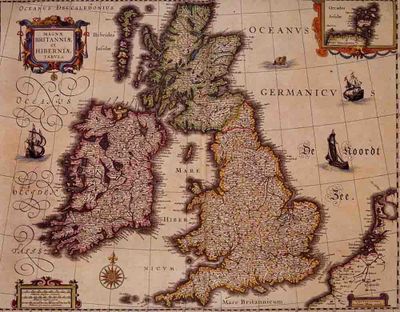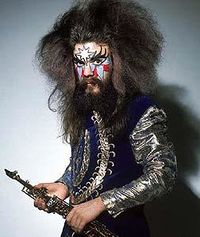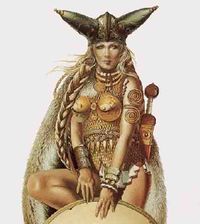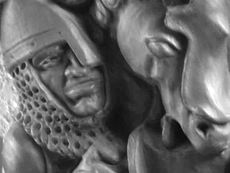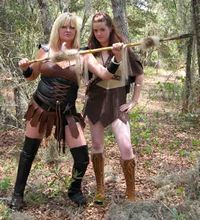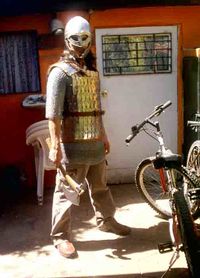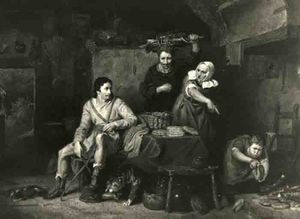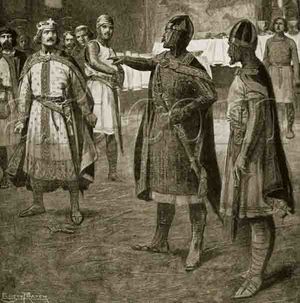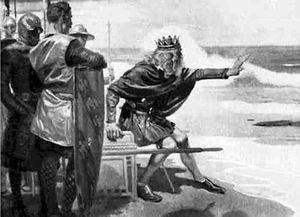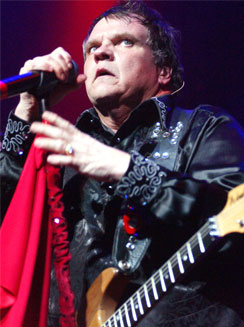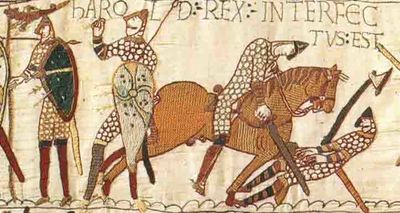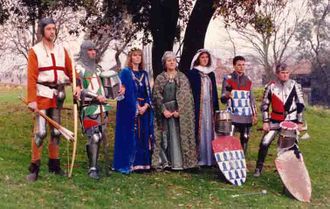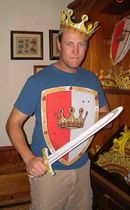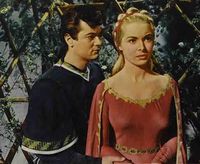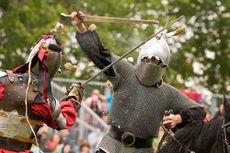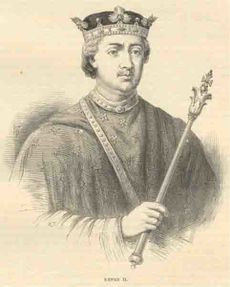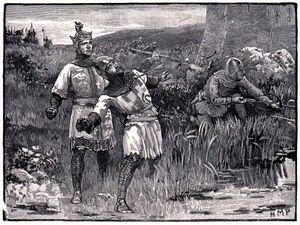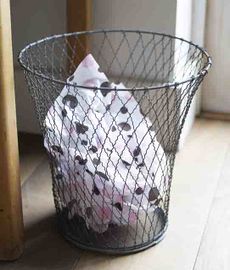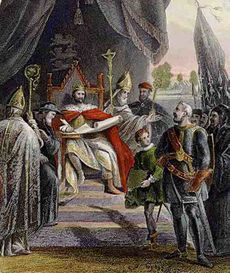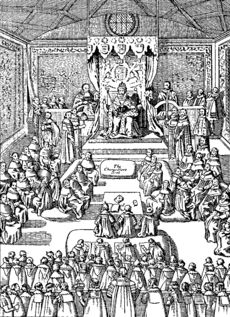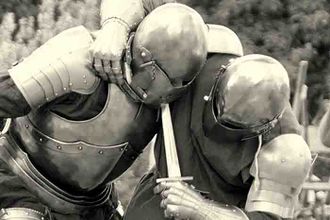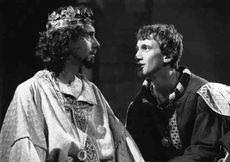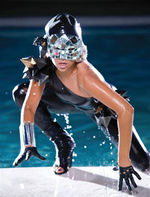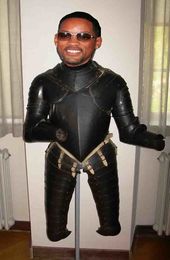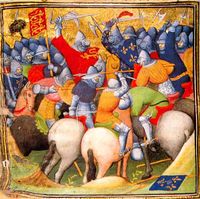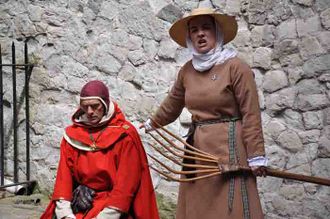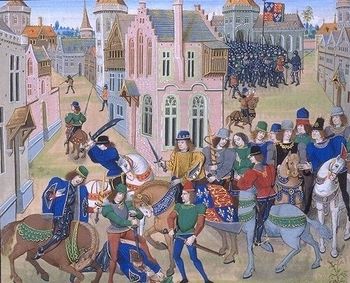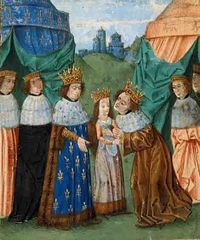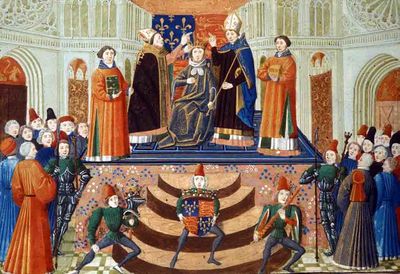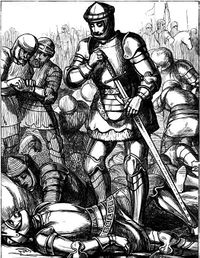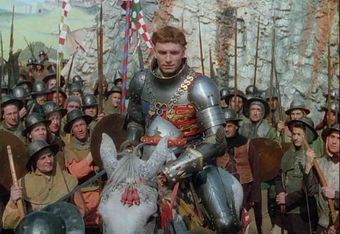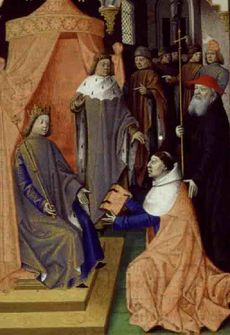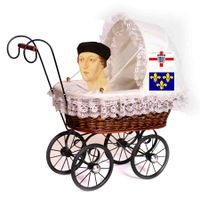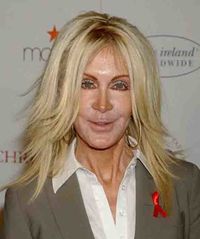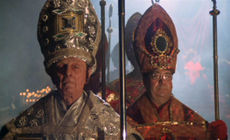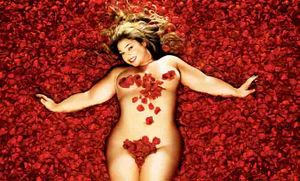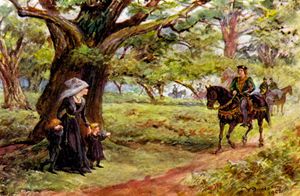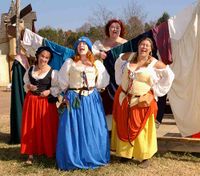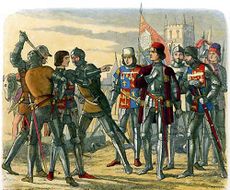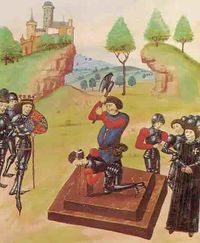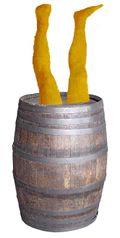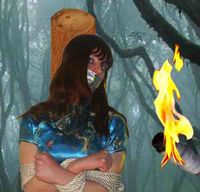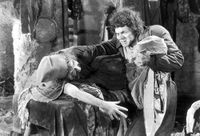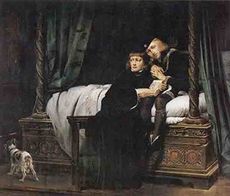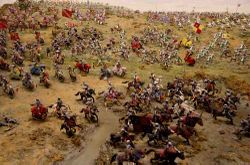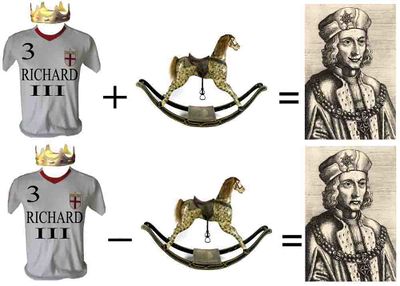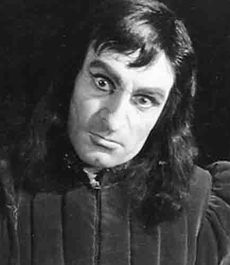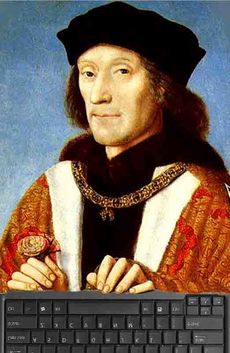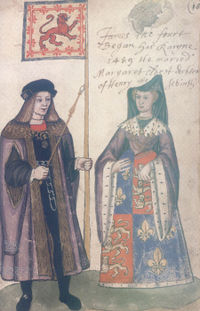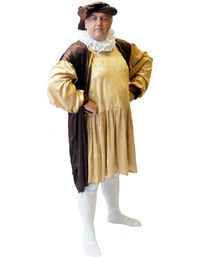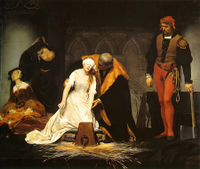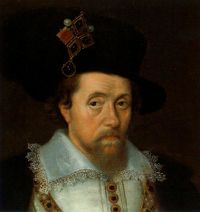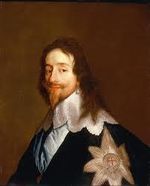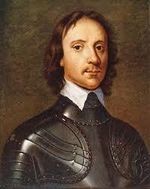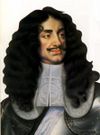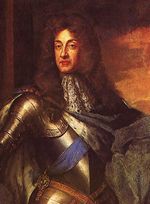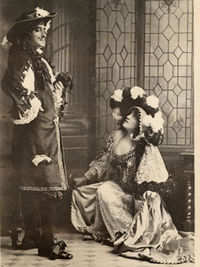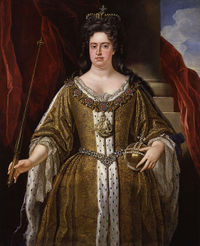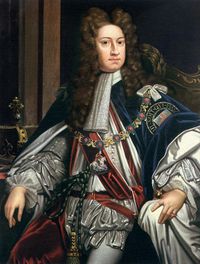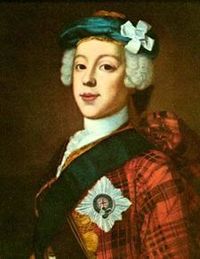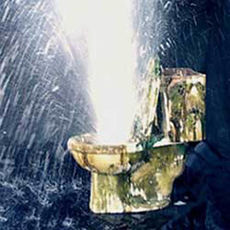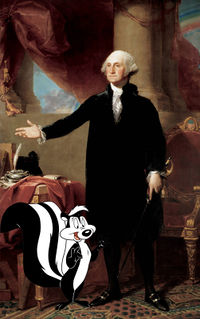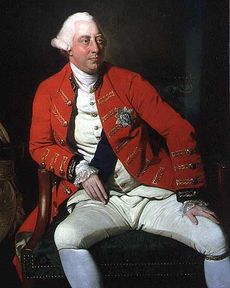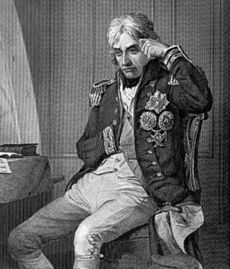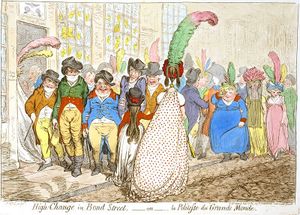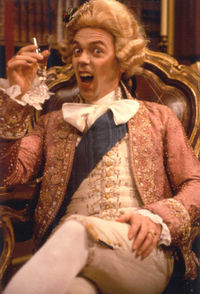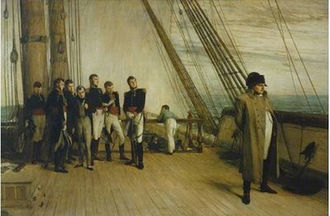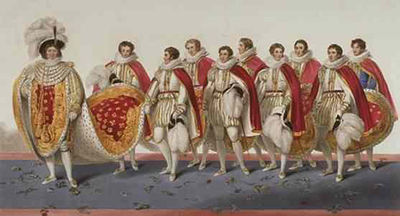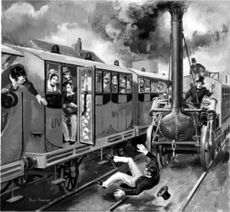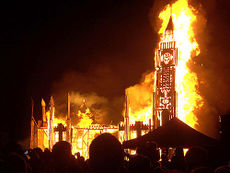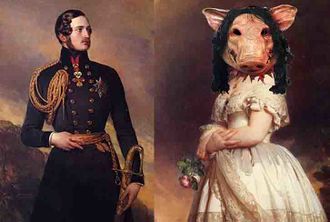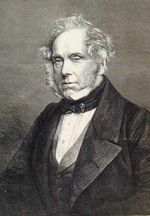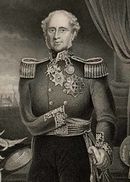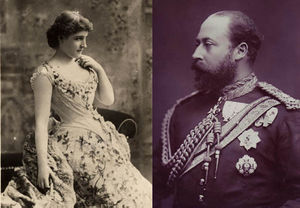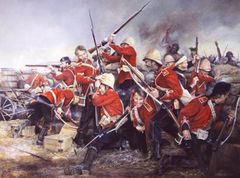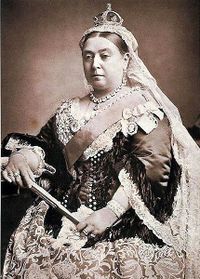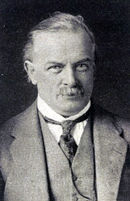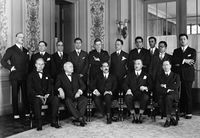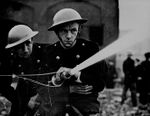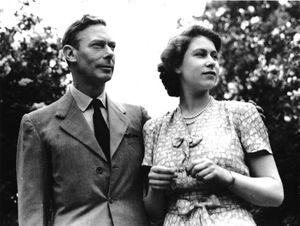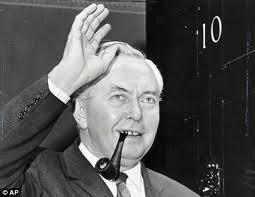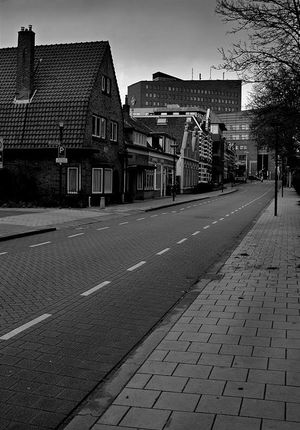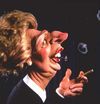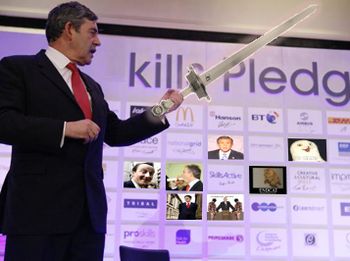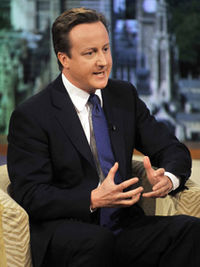History of Great Britain
“Britain, hit me one more time!”
– Ireland
“Weather awful...food awful...people awful. No wonder everyone has to make a joke of it.”
There have been many Histories of Great Britain. Readily available are Winston Churchill's A History of the English-Speaking Peoples (Except the Irish), David Starkey's Downton Abbey: The Prequel or Simon Schama's famous BBC television series Me History o'Britain. This isn't like those histories of the world's most famous island archipelago. This history is completely true and honest and free from sinister political bias or the unsettling hand of Her Majesty's censors. If you are a mincing effeminate or pearl-clutching old lady called Elizabeth, you might want to look away now. Too late! Read on!
Great Britain (or as it is officially known, The United Kingdom of Great Britain and Northern Ireland, The Low Tax Islands, the No Tax Islands, Rockall, Gibraltar, Britland, etc.), sometimes known as What's The Matter With Britain?, is an ancient island state located just off the coast of France. On a clear day in Calais, you can see the Off-White Cliffs of Dover welcoming unwary visitors like a row of vagrant's teeth.[1]
Geologically speaking, until about 8, 000 years ago Great Britain was actually part of the European Continent, but as a mark of contempt for France, the Ancient Britons dug a huge trench, now known as the English Channel. Between Calais and Dover the land was soft; made of chalk, old fountain pens and disgusting things discarded by the Gauls, so the digging was relatively easy. At the end of the Ice Age, sea levels rose, this ditch flooded with water and, to great rejoicing, Great Britain became an island.[2] But the old French Connection continued, as it was they who named this land 'Grand Bretagne' (Great Brittany) to avoid confusion with 'Petite Brittany' (Little Brittany or Jamie Lynn Spears as she is also known).[3]
Prehistoric Britain
Bumps, lumps, ditches and giant stones left all over the place. That about sums up 'prehistoric' Britain. Since everyone left school illiterate in those days, nobody wrote down so much as a 'must do list' for later historians to work out what really went on. Everyone is nameless, this has been called 'communist history' and therefore unattractive to those who like to follow the careers of great men and women. And the heritage business.
The First Briton?
The first Briton was Swanscombe Man.[4] His skull was found when the huge Bluewater shopping centre was built on the outskirts of London. He was probably the first inhabitant of what became Great Britain, but there wasn't much to go on regarding his culture, as only part of a skull, a collection of mammoth teeth and beer bottles were found on the site. (The latter may be what archaeologists call an anomaly and not a period object.) Swanscombe Man seems to have died when he forgot to salt the path outside his hut, as the last great Ice Age came hurtling down from the North Pole and encased everything in ice. He probably died on his way to go out and complain to the local council "about the state of the pathways".
Stonehenge
When the snow retreated northwards, the first (new) Britons arrived, concealed in secret compartments inside hay carts. They quickly spread throughout the island, hunting, spearing, gutting and generally inflicting death on the native wildlife.
Some settled and built villages out of anything that came to hand, mostly mud and plastic bags. Others built a gated community, showing the first signs of class distinction. This site would come to be known as Stonehenge, though most of it has since disappeared into car boots of various later visitors (hence Stonehenge's current construction-site look).
Celts/Celtic/Keltic/Woad Warriors
It was around 300 B.C. that Britain received its first tourist, a Greek sailor called Pytheas. He claimed he was there as part of a mapping survey for Northern Europe but suggestions are Pytheas and his mates were really there looking for Celtic rough trade after hearing reports that the British liked fighting naked. However it was a mistake in the guide book because the nudists had yet to arrive.
After Pytheas left, the Celts arrived from Belgium; hence their name, the Belgic Celts. They lived mainly on truffles and surrealism, but also introduced the hobby of head collection and naked fighting (a tradition that still holds true today). It was also a time for Druids too. No one is sure what they did, except that it was so disgustingly cruel that the Romans would later kill them all, even though, for the Romans, disgusting cruelty was public policy they liked to practise themselves under the cover word of 'civilising mission'.
Roman Britain
Britain or Britannia was the Roman Empire's most northerly province. It can hardly have been the best posting for any Roman used to the sun and warmth of their homeland and yet these foreigners ran the country for 400 years. Perhaps the Brits liked the idea of someone else in control. Must have been the good wine and pizza available then.
55BC-78AD: My Name is Caesar and I Claim This Land for the Roman Empire
The story goes that Julius Caesar got the idea to go to Britain (or 'Britannia' as they called it in Rome) in 55 BC when he misread a holiday brochure which claimed Britannia is the Land of Sun, Sea and Beach Parties. He joined a party of equally misguided Roman legionaries who thought they were going on a 30-18 holiday (dates are back to front as we are still in BS here, 'Before Soap'). So when they unhappy tourists arrived on the shores, it was absolutely pissing down and all the gift shops were shut. The pleasures of bucket and spade on a stone-strewn beach soon paled.
What Caesar did find was a population covered in blue paint('woad'), though in fact it was so bloody cold, the Britons were bright blue anyway. The locals stripped naked to intimidate Caesar and his army with some impressive Celtic genitalia. This was enough for the Romans who left in a hurry, though Caesar had to come back the following year as some cheeky Briton had stolen his monogrammed suitcase containing his only copy of the The Gallic Wars and postcard invitation to meet Cleopatra on a couch in Egypt.
The Romans kept away from Britannia until 43 AD when the Roman Emperor Claudius wanted a cheap vacation from the fleshpots of Rome and his oversexed wife. Not being a natural sun lounger, Britannia suited the emperor who decided to put in a bid for the whole island and got it for a virtually nothing. There wasn't that much resistance to Roman rule. Caractacus and the Boadacius booty shakin' Boudicca from Grantham were about the only two to seriously object. Caractacus upset the Romans by trying to play rugby with their severed heads but was defeated and dragged off to Rome. There he was pardoned and became Britannia's Imperial Commissioner. The Grantham born Queen Boudicca of the Mr Softie-Iceni-Screamy tribal confederation was more dangerous. She led a revolt against the Romans whilst they were in Wales trying to stamp out Druids and the causes of Druidism. Her immediate targets were any Britons who had taken up Roman customs like having baths, cutting their hair and shaving off their beards. Same also for the men as well. In a series of dawn raids, her army sacked Londonium where in a bureaucratic oversight, the local mayor had forgotten to fortify the city. Soon the city was awash with the blood of the toga clad, arrogant Romans and their British lackeys. Eventually the Romans got a grip and Boudicca was beaten. She herself disappeared, it is said to a secret chamber where she will awake again the next British freedom is compromised by deals with foreigners across the ocean.
So in this very haphazard way, Britannia became part of the Roman Empire, or as it now called the European Union. The bit further north, the Celts there refused to join in the civilisation party and became known as the Pricks (or Picts, as ever names were a bit loosely applied in those days). The Picts kept to their ancient ways and in time forgot they had ever been Britons or had once worn trousers instead of kilts. A future cultural divide in Great Britain was underway.
For the rest of the British, enforced union with Imperial Europa meant giving up their proud local currency of parboiled noggins and bits of string. The Romans instead insisted their new subjects accept worthless gold coins otherwise known as the Euro-Denarius and to start learning Latin as the local language was incomprehensible and included too many Blue Druid jokes.
78-410: Romans Decide They Don't Like Living in Britannia After All

No sooner had the Romans moved into Britannia, taking over jobs and providing competitively priced plumbers (a bit of an open goal as the ancient Britons preferred their water fresh from the cess pit), they were gone in 400 years. The Romans left a note on the kitchen table and said they had to go back to Rome to save their kinsmen from an outbreak of Visigoth Flu. They never came back, not even to fix a dripping tap or unblock a toilet. Naturally after this experience the British equated sanitation with 'filthy foreign ways' and preferred to remain dirt encrusted until the 19th century.
The Britons were left on their own but centuries of namby-pamby Roman imperialism had turned them all soft and dependent on welfare and poetry. They were ripe for a different cultural experience even if meant being cleaved in two by an invasion of hairy legging pagans from Germany.
Dark Ages
Now we know they cannot literally have been 'the Dark Ages' as it is during this time monks sat in draughty monasteries drawing pretty pictures on books. However, since no one else could be really bothered to look inside books, it was left to only few with vivid imaginations to write about this period. This is also the time of bearded men and their rag heap dress designer wives digging around in the dirt. They are also known as archaeologists.
410-597: Anglo-Saxon Platitudes
With the Romans gone, the local British decided they needed someone else to help run the place and so put an advert in the Anglo-Saxon Chronicle asking for home help, gardeners and child minders. Being now sort of Christian as well, the British naively believed that only about 500 'Angloids' would forsake their homes in Germany and come over. In fact the Angles so liked the idea of moving away from boring Germany with its lack of native humour and fondness of being so tidy, the entire tribe came over.
Joining the Angles for the trip were a lot of Saxons, some Frisians (the 'Fridge-Frisians') and a group called the Jutes. Since they had long lived next door to the Franks, the Jutes regarded themselves a clear cut about the others in this excursion. They liked cooking and had developed a line in quality utensils compared to the wooden spoons favoured by the Angles. The Jutes also insisted that they would only settle in Kent and the Isle of Wight as these places 'had a touch of class'.
What the Britons also didn't know was that all the new immigrants were impressively and enthusiastically pagan. For them churches were not a source of faith but of plunder and instant social enhancement. One the Britons failed to pay their wages, the Germans helped themselves.
To rub in their contempt, the Saxons would set up a stage in the churchyard, plug in their guitars and play some Hot Heathen Heavy Metal songs like Woden Woz 'Ere, Axe Head In Your Back and The Immigrant Song. The British (or the 'Wallies' or 'Welsh' as the English called them because they were stupid and didn't appreciate a good meaty Germanic tune or two), fled to the west of the island to mope about their lost lands. In contrast to the English, the Welsh turned to singing ballads about wimpy heroes like King Arthur and Merlin and His Magic Mushrooms.
With the original Brits now gone, the various German invaders divided up the country in which ever way suited them. Some called themselves 'Kings' and had names like Hengist, Horsa, Cwuff, Oi, Sexbait, Snot but they were in reality gang leaders who ate and killed with their hands.
597-756: Rome Says Hi to the Ango-Saxons: The Return of Christianity (Latin Style)
In 597 Pope Gregory the Great decided to take a rest from his chanting and noticed there was an opportunity to expand Catholic Rome. He was told the nominally Christian Celts had made no effort to send missionaries to convert the Anglo-Saxons, being still sore about losing their lands to the 'Sassanach Scum' earlier. Sensing a spiritual business opportunity, Pope Gregory the Great asked a priest known as Augustine (named by his mum after the earlier St. Augustine of Hippo who wrote 'Confessions of a Dirty Sinner') to get a team of crack Christians (the C Squad) to get tooled up and head north out of Italy.
Kent was a pretty easy conversion, the Jutes there had long seen themselves as civilised pagans compared to their fly-buzzed neighbours. When Augustine and his mission arrived in Canterbury, King Ethelred gave the visit the red carpet treatment and slap-up roast ox banquet to celebrate. He also asked if Augustine had a light sabres but was disappointed. The pope's emissary eventually persuaded his host to have a 'bath with soap' (ewwwgh!) by which process Ethelred became a Christian. By this action, Kent was now officially with Jesus again. There was no question of the people of Kent 'taking a vote on it'. The King had wished it so.
Augustine didn't fancy staying in England any longer, sent another team to Northumbria where the local King Edwin said he would give Christianity a 'go'. It got Edwin a nice fat biographical entry from the Venerable Bede in his book History of the English: Mission Accomplished a century later. Edwin's adoption of the Christianity didn't save him from a spear through his back from his rival, the local Welsh (Christian) King Cadwallon a few years later. Guess Edwin hadn't read the small print of his conversion contract.
756-796: An Offa You Can't Refuse
With names like Eadwald, Eadbad, Eadgay, Effoff, it's very easy to get bored reading about the English kings and their unpunable names until we get to King Offa of Mercia. He was an English king who based his capital at the Bull Ring Shopping Centre in Birmingham. Offa ruled in the 8th century and was the first English king to write long love letters to Charlemagne, Holy Roman emperor asking for respect and nice gifts. He also sent Christian missionaries back to the old Anglo-Saxon lands in Germany to spread the Christian word which was basically 'Convert Or Die You Pagan Bastard'. For many missionaries, they were the ones to die first.
Offa also liked ditches and dykes. In the former he liked to bury enemies and the latter he openly welcomed to court where they were trained into an elite guard. He posted them along the border with Wales where they were known as 'Offa's Dykes' and were a formidable legion of battle trained lesbians. They also liked to dig out mud holes where love struck Welshmen who had tried to cross over the border to make merry with the Offa's amazons, were dispatched without benefit of clergy - or their knackers. The latter were sent to Offa as trophies where he held court in place that was then known as the Bull Dyke Ring, or Bull Ring today.
796-871: We're The Vikings And We Need Your Nuns
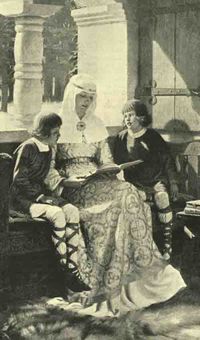
By the 790s, the Anglo-Saxons had got complacent about the security of their lands. The Celts had proved to be easy punchbags when it came to stealing land and shoving them up into Wales or down in Cornwall. The Picts were no more trouble either as they were fighting against a nation from Ireland with an identity crisis - the Scots. So when in 793 a strange fleet turned up on the island Lindisfarne where the monks spent most of their time drawing pretty pictures on bibles, no one was really alarmed until the visitors decided to fillet the holy men and asked where the virgins were kept. When told they lived in nunneries, the visitors crossed over to the nearby Northumbrian coast and ravaged, raped and refused to pay a service tip at the local inhabitants. The Vikings had arrived.
The Anglo-Saxon Daily Star denounced the invaders as 'Pagan Scum' and demanded government action. This was a bit difficult as the Anglo-Saxons hadn't bothered to reconstruct the society they had trashed three centuries earlier and had preferred to live in mud rather than to re-occupy the old Roman cities. Many of the local rulers or kings remained keener in getting one over their neighbours rather than take on the Vikings who seemed to be a difficult to team to beat. Others went on with the Celt bashing until in 866 a huge invasion fleet came across the North Sea with the plan to turn the whole place into New Vikingland.
Pretty quickly, the other Anglo-Saxons gave up and changed their vocabulary to sound more like Norsemen than Englishman (the origins of the division between the Hard Northern English and the Soft Soppy Southerners that continues to this day). Only in Wessex did the Saxons put up a fight. Lead at first by Ethel, a monarch of uncertain gender (also known as Ethel-fred or Ethelred), they were forced to flee from the Vikings and decided to hide out in Somerset where the cider was cheaper and the cream teas less expensive than in Devon. Some had to earn their living as pastry cooks until finally Ethel's brother - Alfred - got offended by some coarse Viking customers and declared he was going to liberate Anglo-Saxony - or, England as he now called home.
871-899: How Not To Bake Cakes the Alfred Way
Alfred hadn't expected to become a resistance leader and had hoped to marry a nun and start his own mixed sex monastery in Glastonbury. However, it wasn't to be, and the English who were glad to have someone as their King with an easier name to remember (and spell) rallied around Alfred. Even when he celebrated each victory against the vikings by baking Alfred's Home Made Cakes, the people of England were too polite to get up from the table and stick two fingers down their throat to remove the offensive pastry from their churning stomachs.
Eventually with a lot of mutual killing, the Vikings agreed that Alfred was someone they had to respect. So they agreed to split England into two. The Vikings called their bit 'Danelaw', as they were keen on crime and justice soap stories. They also agreed to jump in a river and get baptised to please the church. The vikings also got Londonium though it was a bit of a ruin and unattractive to stay in after dark. Alfred called his territory Ingerlund but blotted his signature so that in later centuries it came to be read as 'England'.
As is the way with unwanted neighbours, the local Vikings in Danelaw kept throwing their rubbish over the fence. Alfred decided this was too much and declared war. He captured London and East Anglia. Alfred also made the decision to make the former 'Londonium' his new capital city and invited Italian bankers, dodgy Byzantine Investment companies and Corporate Raiders there to 'spice up the place'. It worked and London became once again a real city after its long years of obscurity.
899-1014: From Rock Steady to The Unready
Alfred just failed to see in the fireworks for 900 A.D. celebration. He was succeeded by his son Edward the Elder (or the Alder for his 'tree-like' royal woody). Taking advantage of the Vikings in East Anglia going soft under the impact of Christianity, Edward invaded, annexed it and was home in time for a roast ox tv dinner.
When Edward died, his son Athelstan (which means Rock Steady Stan in modern English) became King. He conquered the rest of Danelaw and found time to take on the Celts, Vikings, Irish and just about anyone else he didn't like the cut of their beard in a battle in 937 at a place known then as Brunanburh, or as it now known, the Athelstan Shopping Centre though its location remains unknown even now.
Following that great victory, the next prize was to finally take Jorvik, the capital of the Vikings kingdom in Yorkshire. At first it was difficult for the English to find Jorvik as the Vikings had changed its name from Eoforwic to Jorvik when they seized it back in 866 A.D. Finally in a battle against the charmingly named Erik Bloodaxe (a former death metal bassist with Harald Bluetooth and the Viking Vibrators), the English were victors and Erik was strangled with his guitar strings. England was united once more though the northerners insisted in speaking in their own language (and they still do).
Athelstan was followed as king by his half brother Edmund the Magnificent, a title he gained for the size of his family jewels. Edmund was stabbed to death at rowdy nightclub by a jealous rival and replaced by another brother, Eadred who was a confirmed bachelor and preferred to stay at home eating raw food out of tins. He was succeeded by Edmund's sons Eadwig (or Earwig - Anglo-Saxon spellings were a bit vague then) and Edgar the Passable. He introduced the first (and last) boat race on the River Dee when he coxed a team of other local kings in a race against a team of vikings. The Norsemen lost and then set fire to themselves (and their boat) in a typical example of Viking dramatics. Edgar choked to death on the resulting noxious fumes.
The next king was Edward, called also Edward the Martyr as he was a bit of a drama queen. He had an argument with his stepmother Queen Aelfandsafety over an untidy bedroom and was stabbed to death for answering back. She then encouraged the nobles to 'elect' her son Ethelred as the next king. It proved to be a really bad move by Anglo-Saxon elite.
Ethelred - surnamed the 'Unsteady' or 'Unready' for his inability to stay upright after a pint of mead - was to prove a right royal dud. He always seemed to be in two minds about what to do and would in the end choose apathy over action against a renewal of Viking activity. England's old enemies in Norway and Denmark got the news that Happy Raiding Days Were Here Again and sailed over in their longships to bully the English.
Desperately Ethelred tried to pay them off with government bonds and promises to slash state spending. Then he was soon forced to resort to the Danegeld Tax, one that meant the Anglo-Saxons had to find enough castrated Great Dane dogs to be shipped back to Copenhagen. When he ran out of dogs, Ethelred then suggested that everyone to go out of the hovels and slaughter everyone who looked a bit 'horny' (i.e. Viking). The English who had long complained in the pages of the tabloid Anglo-Saxon Daily Mail and Anglo-Saxon Daily Express about 'too many foreigners', took up the call and soon the rutted tracks of many settlements ran red with Viking claret.
One of the victims of the massacre was the well connected Princess Gunhilde of Denmark who was living in England as an exchange student. Her brother happened to be King Sweyn the Fokking Forkbeardy of Denmark who got the news of his sister's death. Sweyn swore personally he would cut out Ethelred's guts and remake them into a pair of fancy purple garters in revenge.
1014-1042: King Cnut and the Waves
King Sweyn arrived in England to take on Ethelred. Preferring to keep hold of his bowels, Ethelred ran away but then got news that Sweyn died after eating a suspect bacon sandwich in London. Sweyn's son Cnut carried on the war, apparently upset by claims his name was merely an anagram. Living with a name like Cnut had made the young Dane one of 11th century's hard men. Ethelred agreed to die and was replaced by his abler son Edmund Ironed Trousers. Eventually he and Cnut signed an agreement to divide England straight down the line, painting a long white line across the country.
Cnut however wasn't keen to share England with Ironed Trousers and secretly asked if anyone had another solution. He was approached by a professional assassin, Eadric the Shifty. He offered to stab Ironed Trousers when he was squatting in the privy and therefore exposing his undefended vitals. Eadric hid in a cesspit and when he recognised Ironed Trousers' spotty bottom, stabbed him up the bum. The killer returned to Cnut's court covered in shit and blood to claim his money. However Cnut (living up to his name) executed the assassin on the grounds that he wanted to visit the loo in safety and not fearing who might be hiding around the U-Bend.
Cnut's bloody start to his reign encouraged all of Iron Trousers sons and brothers to jump on the next ship out of England. Now Cnut's only enemies were scribes transposing the N and U in his name in royal proclamations. After losing a fair number of clumsy monks, the English decided to call Cnut King Canute which saved on retraining new employees.
As he was also top banana in Denmark, Canute spent time in Scandinavia extending his domains and making a nuisance of himself in Europe. This meant he needed to travel a lot by sea but the oceans were not willing to be so supportive. So Canute called for a meeting with the sea and drowned as the tide came in.
The next King of England should have been Halfacnut (or Halfcut') which sounded liked a partial improvement on his father but he stayed in Denmark as his passport had expired. This allowed his bastard brother Harald Harefoot' (he had rabbit like toes when 'unstockinged') to take control. When Halfacnut eventually got to England, Harefoot was dead but in a sign of brotherly love, the new King dumped his corpse in the marsh. Halfacnut (or Halfacanute, the monks quickly decided to change the new king's name to prevent a repeat of their earlier typographical problems) turned out be biggest turd in the family. Halfacanutes's reign was cut short when someone slipped him rohypnol at a beach party in London and he was seem last swimming down the Thames in pursuit of what he said was a 'cute little mermaid'. No one saw him again or cared.
1042-1042: Macbeth and the Knife
In chronicling the history of England (A.K.A Great Britain), it's easy to overlook the Scottish, Welsh and Irish. Unlike the English, the Celtic Fringe were or became christians a lot earlier and then sent their own missions out to their kinsfolk. The best known was St.Patrick who rid Ireland of pagans, snakes and evil leprechauns. Then there was St.Columbo, a graduate from St.Patrick's Missionary School who went to the north of Britain to convert the Picts. He did this by solving crimes involving and travelling around in a waterproof coat that got him the nickname 'What's Up Mac?'.
Those are the easy ones to remember. The Celts had names like Eochaid Domnail, Gruffyd Rheilffordd Llangollen or Toirdelbach Ua Conchobair which the English could be bothered to pronounce correctly. No wonder there was little incentive for them to convert the English to Christianity, since it wouldn't mean the celts would get back their property or lands. So the English dismissed them all as the Twilight Zone of the European world, of no great interest and people so backward that they didn't even live in towns. They appeared to be lands of tall tales and weird dreamscapes.
So it is only when we get to Macbeth in the 11th century that there is a Scottish King who we can really care about. As Kings go, Macbeth had the right attributes for the top job. King Duncan was a dunce to let himself get stabbed in the hospitality bedroom in Macbeth's castle and killing of rivals were really just the small print on a regal C.V. However, Macbeth showed signs of going mad and that was really what done for him in the end - though later on the British were more tolerant of loopy monarchs (see King George III).
1042-1066: Spanking the Saxons:End of Ye Very Olde England
In 1042 the Anglo-Saxons turned back to old dynasty and enthroned Edward the Confessor (brother of Iron Trousers). He had been living in exile in Normandy where he had developed a persecution complex and therefore liked to confess to the most unlikely of crimes.[5] Edward agreed to become King but also said he had no intention of founding a dynasty as he thought the Saxons were a nation conceived in sin (an old pun on the Saexe and Sex which had always tickled the Angle half of the relationship).
The next King of England could come from a range of candidates. They included William the Bastard of Normandy (he had inherited an I.O.U. from Ethelred), Harald Haarderbaastard of Norway and Sven Goran Eriksson of Sweden Denmark who added the job of managing England was a good chance to improve his bed post notch counter. A late entry was the missing son of Edmund Iron Trousers, Edward the Expat. He turned up in England with his family speaking Hungarian after spending his time in Budapest working incognito as a tour guide and was detained at customs where immigration authorities carried out a full body search. Perhaps the shock of rough Saxon hands handling Ed's delicate assets inside his gusset or the foul weather, either way The Expat was dead within hours and unable to meet his Uncle King Edward. The dead prince's son Edgar was so young and green looking that he got the name of Edgar Aetheling which was Anglo-Saxon for 'Short Trousers' though it later got changed to the Uglything because Edgar suffered from facial warts. He was a possible candidate to be the next king but was judged as too young and weedy looking to be a serious royal throne applicant. The Expat's daughter Margaret was sent to Scotland to pay off a tax debt (more of that connection later).
One person who hadn't thrown his horned helmet into the ring was another Harold, Chief Thug of the Anglo-Saxon court. In fact he really didn't have because at the leading noble in England, Harold was by far and away the best known of the contenders.
Harold's father Godwin 'the Godfather' had owed his position of power by cleverly switching sides during the days of Harald Harefoot and Halfacnut. Compared to his brother Sweyn the Nun Violator and Tostig the Bruiser, Harold seemed at least a bit more civilized. But Harold's ambitions to become king had been compromised when he was shipwrecked off the coast of Normandy. Duke William promised Harold he would let him go, eventually and had to swear on a casket allegedly full of holy bones of saints, martyrs and old Kentucky Fried chicken takeaways to add holy ballast.
Harold had hoped this would be a private ceremony but the scene was captured by a resourceful team of the 'Needlerazzi' who liked to embroider the truth too. Unknown to Harold, the devious William had already started work on a secret tapestry to chronicle the events of this turbulent time which was later published a few years after the Norman Conquest as the Bayeaux Tapestry.
Despite the compromising needlework, Harold crowned himself king when Edward the Confessor died in 1066. William sent a message warning he would be 'over soon with his Norman boys' but it was the Norwegian Harald Haarderbaastard who turned up first. He arrived with an invasion fleet and an ally who knew all about Harold, his treacherous brother Tostig. Hoping that William of Normandy would miss the invasion ferry, Harold marched north to take on the 'berserker and the toerag' as he called his enemies.
The two armies met at Stamford Bridge, near the shed end. Wearing an all white fighting strip, the English killed Haarderbaastard, Tostig, Didier Drogba, Fernando Torres, and their expensive army of free booters. It had been a long and bloody battle which eventually finished in extra time with a severed head penalty shoot out win by the away team. The losers were buried in their Norwegian Blue shirts and shorts underneath the centre circle. So ended the Viking age, at least in England. It would later return with the Age of Ikea 999 years later.
Harold's army were just about to drink themselves legless in a victory celebration when news reached then that the Normans had jumped off the ferry and had landed near Pevensey in Sussex. William brought a letter of support from Pope Gregory VII[6] and insisted the Confessor had promised him England over a pub lunch in London. Harold raced south to take on the Normans, not even taking the time to change his underwear. The English army took station on Senlac Hill just outside Hastings and for awhile held up the Norman army. In a long, all day struggle the English were eventually defeated. The turning point in the battle was when Harold, distracted by a stench wafting up from his leggings, looked into the sky to clear his head, only to get an arrow in the eye.
It was the end of Harold but also of Anglo-Saxon England.
The Middle Ages
Well everyone will know what their Middle Ages are. A fatter stomach, lack of stamina in the bedroom department, falling asleep in front of the television or telling kids old boring stories about a mispent youth. Historically speaking, the Middle Ages was a term of abuse coined by the clever clogs in the Renaissance era who dismissed everything since the fall of the Roman Empire as a historical embarrassment of ignorance, cruelty and bad clothes. It was time when everyone feared dying as the chances of going to Hell were a lot more likely than going up stairs and climbing over the gate into Heaven.
1066-1087: A Conquering We Will Go
William the Bastard now officially changed his name to William The Conqueror and set about to claim the rest of England. The Anglo-Saxon establishment decided to ignore William and proclaimed Edgar the Uglything - a.k.a., 'Short Trousers' - to be king but the little runt had no belly for a battle and surrendered. William arrived in London unopposed and arranged for a coronation in Westminster Abbey on Christmas Day. William opened all his presents in the cathedral and pulled out a shiny crown to have stuck on his head. With some encouragement of armed soldiers, the crowd cheered in favour of their new monarch - though thanks to some faulty misunderstanding of the word 'Hurrah', the Norman army burnt down London to keep themselves warm.
Whilst the locals hurried away to save their valuables, William who only spoke spoke French with a sarcastic Norman accent, introduced 'Bastard Feudalism'. This basically meant all of England was parcelled out to Willy's friends who had helped to contribute to the invasion. Pope Gregory got his cut too, with the vague understanding that England was essentially mortgaged to his Holiness if William or his family's rule didn't work out. This bit of small print was eventually used by a later pope to resell the English throne to the French.
The people of Yorkshire objected to the new regime and asked refused to pay their taxes.
William travelled up the M1 and turned the county into a total wasteland using the old Fire and Death approach to rebels. Pleased with that destruction and also looking for an amusement park for Norman aristocrats, he drove out all the local inhabitants of west Hampshire and created Foret Nouveau (New Forest). The only downside for William was that Edgar Uglything slipped away from his Norman handlers and fled to Scotland to stir up the shit against the new ruling class.
To be honest, it is evident that William was dismissive of the English as a people capable of constructing anything larger than a wooden toilet. So he brought over French immigrants to help build a series of castles to keep the country under tight control, culminating with a Anglo-Saxon prisoner of war camp in the capital city which was later to become the infamous Tower of London. And when he had ran out of castles to construct, William brought in the tax man and asked for the returns for 1085-1086 to see how much England was worth if he ever needed it to be mortgaged on buying a luxury villa in Sicily. This national audit would be later known as the 'Domesday' book and later inspire a series of computer games.
Though Uglything remained at large to challenge his authority, William faced a bigger problem with his own family. His many sons itched to get part of 'daddy's lands' and were not to choosy who they brought in to take him on. William's eldest son Robert Curt-hose (Sneering Stockings in English) allied to the French King and invaded Normandy. William returned home but years of easy living and dining on Norman junk food had turned the once mighty conqueror into a Fat Bastard. Squeezing himself into a saddle, William was thrown from his complaining mount and hit the deck in an explosion of disgusting entrails. It least gave the Anglo-Saxons something to laugh about over their bowls of hot gravel and sickly gruel.
1087-1135: A Ruler Who Couldn't Keep It In His Pants
Following William's death, his three surviving sons Robert Curt-Hose, William Rufus, and Henry the Literate took anything they could carry away with them. Henry as the youngest turned his inheritance into money and sat on the sidelines as his elder brothers fought over England and Normandy. In the end Robert agreed to flog his territories to Rufus and then cleared off to clear his conscience (and get away from creditors) by joining the First Crusade.
This suited the Rufus who was into warfare, pointed shoes and bonding with his Norman buddies in a way that suggested his homosexuality was more of a 'in your face' variety than one moping alone in a closet. Rufus's avoidance of female company was matched by his equal aversion to the clergy. Their finger wagging about his Rufus's 'seedy' lifestyle bothered the king and he banished their sanctimonious leader Archbishop Anselm of Canterbury to Rome. Rufus instead worked out his sexuality by looking for rough and ready soldiers 'dogging' [7] about in the New Forest. His brother Henry said he was interested in 'watching', which was an odd move but handy when Rufus was found dead with a belly full of arrows the next day. Henry promised he would investigate Rufus's death but said a day later that it must have been a 'hunting accident' so no enquiry was made.
If Rufus liked the lads, Henry was a definite ladies man. He seemed to have a willing female bedmate in every county and his over productive loins fathered at least 40 sons and daughters, a rate of reproduction that was never to be bettered by any following royal. After leaving his brother's body to the crows, Henry got hold of the Royal Cheque book and hastily got himself crowned when he got news his brother Robert was on the way back from crusading in the East. Craftily Henry had Robert arrested on a bogus passport visa violation and rehoused him for the next 35 years in Cardiff Castle. At least he had been merciful and hadn't killed Robert.
Henry did spend long enough with his shortbread Scottish wife Ettie-Matilda (daughter of Queen-Saint Margaret of Scotland and sister of the Uglything) to have a couple of legitimate children. His only male heir Prince William Billy-Bob-Bob-Bob... fell overboard on the regular Portsmouth-Le Harve ferry, leaving Henry with just a daughter 'Waltzin' Matilda as his heir. Matilda had been brought up by an Australian dance teacher and had learnt to swear and curse in about ten languages. To prevent further family problems, her father had shipped off to Germany to marry another Henry or Heinrich V, Holy Roman Emperor when she was barely 12. The old imperial rogue died not long after and Matilda (grabbing her dowry), came back to England and let herself back in to her father's palace with a spare key.
Henry wasn't happy and therefore arranged another quickie tie up with Geoffrey, the son of Fulk 'the Sulk', Count of Anjou in France. Geoffrey (or 'Geoff' as liked to be called when going around informally in his slippers), had also picked up the nickname 'The Planty Gent' (Plantagent) as he liked to sleep rough in the flower garden to get close to his peasants. Matilda or 'Dowager Empress Matilda' was distinctly unimpressed with Geoffrey and nor was she happy just eking out life as a Countess as her father had married for a second time to Adeliza of Louvain. Remarkably, the couple had no children which was a surprise as it was said Henry had only to drop his stockings and wave the royal member for a fresh clutch of royal bastards to appear. The royal seed bucket had run dry.
So it seemed Matilda would now became his only heir and she got into his good books by naming her son Henry after his old randy grandfather. The King then gathered all his leading nobles to swear allegiance to Matilda, and when some seemed to back off, let his daughter to let rip with her coarse Australian slang which worked just as well. Satisfied he made the best of a bad family job, Henry went to a fish restaurant nearby and died after stuffing himself full of a bad dish of Lampreys and Chips. His nobles promptly celebrated the death of the late king by ignoring his inheritance plans and supported Stephen of Blois as the next ruler.
1135-1154: King Wuss
The new King started off with a few disadvantages. A nephew of William the Conqueror, Stephen had been somewhat traumatised by his dominating mother Adela. A true daughter of William, she had quarrelled with his father Stephen of Blois Senior over holiday souvenirs he had picked up in the Holy Land during the First Crusade. Adela had burnt the Kill-Me-Quick hats and stuffed toy donkeys her husband had brought back and demanded he go back there and get some real presents, re-saleable holy relics, pickled body part trophies. A few months later the Saracens posted Stephen's stuffed head back with a note that read "YE FAIL".
King Stephen was an easy person to hoodwink. When he was asleep, his noble allies had removed most the treasury and then started on a frantic castle building spree in an attempt to boost the property market. Stephen ran out of money and no one came to court anymore. News of Stephen's problems filtered back to Matilda. She saw this was her way to take back her father's kingdom and invaded England. Matilda had plenty of allies, many of them the production of King Henry's over active loins. In 1141 then captured Stephen whilst he was in Lincoln on a short holiday and Matilda took ship and headed for London to be crowned.
Yet in a baffling example of the English (and later British) identification with backing losers, the English rallied to Stephen and got him released from prison. When Matilda tried to visit to Westminster Abbey to bag her crown, a mob of English louts threw stones at her barge and she fled under a hail of beer bottles, tin cans and used condoms.
The civil war in England continued until both Stephen and Matilda agreed to retire. The old King took up residence in an Abbey (now a branch of the Bank of Santander) whilst Matilda who was now a happy widow, retired to Monte Carlo to play backgammon and fool around with retired - and rich - crusaders from the Order of the Knights in White Satin. She left all her rights to her son Henry, a wispy bearded fellow who had just married his own cash cow in the shape of Eleanor of Aquitaine. Young Henry had plenty of ideas what to do with his inheritance, with most of them ending cutting up his enemies like sliced loaves.
Psychotic Plantagenets
The Norman dynasty finishes here with Stephen. All change for perhaps one of the most colourful families to rule any country. Lasting from 1154 to 1399, of these two Kings were murdered, one died from a crossbow bolt and another on the run from his enemies. All of them were mad, some just just murderously mad as well.
1154-1189: All In My Family:Feuds, murders and Doing it Kingsway
In 1154 a red faced, fiery bearded Henry of Anjou was crowned King Henry II of England.
He was the first English monarch to adopt the title (William the Conqueror simply called himself Master of the Anglo-Saxon Scum). The new ruler wanted to suggest that he was also interested in his English inheritance and how much he could soak up in handy taxes.
Henry's 'love of England' didn't extend to spending much time there. He preferred to live in France and only commuted over when he was wanted to through his monarchist weight around. His new wife Eleanor of Aquitaine was also against staying in 'orrid England' for too long. She had once been Queen of France as the wife of King Louis VII but a combination of his snoring in bed and possessing a small penis had persuaded Eleanor that Henry was more of her type of King.
Leaving Louis with their two ugliest daughters, Eleanor had jumped into bed with Henry and in an outstanding of sexual athleticism, helped produce a sizable family including four strapping sons and four strapless daughters. The girls were married off to various men in tin suits and titles but the boys were a different matter. They had grown up into a gang of teenage delinquents and all wanted a cut of their parents' empire which stretched from the Scotland to Spain. The sons were: Henry Junior, Richard the Gayheart, Geoffrey of Brittany-Baldy and John Lapdanceland.
Though he was King of England, Henry preferred to stay in Rouen with a bottle of Anjou Rose and a Norman tart to keep him satisfied. For Henry, England was good for a crown and a chance to look at other European monarchs like Holy Roman Emperor Frederick Barbarossa in the eye..and spit in it. Henry also had a bit of luck regards the Papacy when in a rush of blood, the cardinals elected Nicolas Breakwind from England as Pope Hadrian IV in 1154. A flatulent Hadrian thanked his relatives and Henry for their support by rewarding him with First Conquest Rights to Ireland. The Papacy had decided the Irish needed some Anglo-Norman steel in their guts to appreciate the new Power Pope 'Ade'.
With everyone apparently wanting to become his best friend, Henry next got his old whoring mate Thomas A. Becket a prime job as Archbishop of Canterbury with the instruction to find some gold to finance Henry's acute gambling habit. Becket however 'Got God' and to the surprise of his friend, really believed that as archbishop he out to protect the church from his monarch grasping fingers. Henry was furious. He tried to entice Becket back to his old ways with kinky themed parties (Vicars and Tarts, Bishops and Kings) but Becket declined. Henry called him 'Thomas A. Bucket' and said he deserved a 'severe kicking'. Everyone thought Henry was 'just being Henry' but four of his denser knights read this as an instruction to do the dirty on Tommy.
Sir Hugh, Sir Pugh, Sir Barney McGrew and Sir Cuthbert Dibble of Grubb slipped into Canterbury cathedral and hid in Becket's chained book depository. When Thomas came in to carry on reading one of illuminated manuscripts (the one with the neon strobe lights), he was attacked and killed. They then texted to their 'victory' to Henry and received a message... 'Oh...shit. Go into immediate exile'.
Henry blamed his filthy temper for the accidental killing of Becket in his church but the Papacy insisted Henry take it like a king. So a few months later, Henry had to walk on his knees inside Canterbury cathedral, sponge down any remaining blood stains and then got a thorough whipping from the monks as he prayed for forgiveness from the newly installed, revolving sacred shrine of St.Thomas Becket.
Becket's death only left Henry with a new range of enemies, mainly his sons and wife Eleanor who all wanted to get a piece of his empire. Eventually, even John turned against his father, perhaps because of his enforced holiday in Ireland. When he heard the news, King Henry is said to muttered 'now that even that little squirt has taken against me, It's time for me to...' and died before he complete the sentence.
1189-1199: Cruising for a Crusade
Thanks to some judicious family weed removal, Richard's other two brothers Henry and Geoffrey had both already died in suspicious circumstances. Like his father, Richard I didn't care much for England except it gave him a crown and nice fat income to plunder. However, he was also much influenced from reading cheap romantic novels whilst growing up with his dotty mother Eleanor. Thanks to her, Richard got the itch to go East and put one over the Saracens. So he left England in control of a regent known as Lambshanks and gave his brother John a huge puzzle set to work on whilst he was away.
Like all good crusading plans, Richard's hope for a quickie victory in the Holy Land didn't go much to plan. He fell out with his allies, the suave and slippery King Philip II of France over something said at dinner and offended the Austrians by hauling down their standard over Acre and cutting out a pair of skimpy underpants to overawe and offend friends and foes alike. This made the Austrian leader Duke Leopold very grumpy and fled the city cursing Richard as Koenig Schiesse. Richard wished both men a watery finish to their careers and decided to take on the Saracen leader Saladin alone. When Saladin refused to fight the crusaders on their terms (mindless violence mixed with foolhardy heroics and stupid tactics), the Third Crusade was declared to be officially over. Richard checked out of his lodgings whilst the crusaders were still sleeping off a night's pillaging and headed off alone back to England.
The Austrians soon got their revenge on Richard when his travel guides took a wrong turn in the Mediterranean and dropped him off at Venice thinking it was Marseilles. So as Richard tried to get back to London, the Austrians jumped before you could say Joseph Fritzl and locked up the English King in a windowless basement flat with a room full of chained up Austrian maidens. He was also given a cask of alcoholic anti-freeze (otherwise known as wine in other countries) to keep out the cold alpine nights. They also posted off a huge ransom note and waited for the English to come with the loot.
Prince John had meanwhile finished his puzzle and got Lambshanks deposed and barbecued at the same time.
Richard eventually sent out a message and promised freedom for anyone who would fight against Prince John. A forest robber with an unlikely back story about being a lord and a spokesman for 'the English' raised his bow and called the villiens, villains and the just vile to rally to King Richard. The rebel called himself Robin Hood, a name that was made up on the spot and then passed into legend.
But it worked. Monies to bail out Richard were squeezed from the peasants and Richard was back in England. He arrived in disguise, sporting a toothbrush moustache and an ill fitting surcoat with an arm band. But everyone had no trouble in recognising him and Richard's return was hailed as the successful outcome of the Third Crusade. As for Robin Hood, he was invited to join in the celebrations but disappears from the story. Richard never wanted to owe anyone anything.
As Richard was still fuming about what King Philip of France called him at Acre, Richard started a scruffy little war. It ended when Richard, wanting to get closer to where Philip was holed up in Château de Chalus-Chabrol (nice vintage!), rode up too close to the walls to shout out some new abusive descriptions of what Philip could do with his horses when the Lionheart was put off his invective with a crossbow bolt in his shoulder. He died shortly after.
1199-1215: Does Magna Carta Mean Anything To You? Thought Not
You have to understand that King John was actually a nice guy. He didn't want to be but thanks to him, Magna Carta was wrung out of him. So being a bad king meant he was a good constitutional king.
Prince John was a bit of a loser all the same. He was the runt of Henry II and Eleanor of Aquitaine's extended litter so when it came to children's clothes, toys and territories to rule over, all his dad had left was a dubious claim to Ireland legalised by the Papacy. John hated his time there. He preferred drinking bog water to pints of Guinness and laughed when presented with the Irish chieftans who would turn up to court in bare, hairy legs. When John asked if their wives would turn up topless to balance out the exposure of flesh, he was promptly recalled to London and then joined a rebellion against his father.
John's relationship to his brother Richard was tricky. However, Richard hated coming across the English channel to England which he thought was a rain swept land of miserablists and that there wasn't anyone there he fancied. When John got the news his brother was dead, he celebrated by hanging Robin Hood and his Swinging Men from the nearest tree. He also ordered a hit on his nephew Arthur of Brittany (son of Geoffrey) when the latter send back his Christmas presents to 'Grandma Nelly of Aquitaine who was still alive and stirring in down in the South of France. But this was a bad move for John as Arthur's Quill-On-A-Parchment friend, King Philip of France confiscated all of the English King's lands in northern France including Normandy, Anjou and Brittany. Only Bordeaux was left to John as the locals preferred a remote bad man than to a local lord in the shape of Philip.
King John was now 'loselands' and was also called 'Soft Sword' as he failed to father any legitimate children by his wife Isabel.
Angry with this jibe, John took his royal member for a tour of the land and soon fathered countless new little bastards with various reluctant bed mates. At least he was fertile.
But none of these would have a chance to became the next ruler so John sacked his wife and replaced her with a new one,
Isabella of Angouleme (which would save the King of remembering his new wife's name). She was only 12 and but had got the reputation as the 'Lolita of the Loire'. This was good enough for John who stole her on the day she was going to marry Guy of Lusignan. He left Guy a silver dish and a one way, non-refundable ticket for the next crusade (slated as the 4th to be held in 1202).
John's off-hand disregard of the Crusade business offended Pope Innocent III. The Catholic church had a lot of investment in persuading people to save their souls by handing over all their goods and then taking the cross. So Pope Innocent told the parish priests in England to go on a Holy Strike and refuse to baptise, marry or bury anyone with the necessary Christian spiritual boarding pass.
Realising he needed a foreign adventure to distract public opinion, John joined a German invasion of France led by Emperor Otto IV. Lackland was luckless. He missed Otto at their meeting point (under the clock tower in in Ypres) and read later the French had spit roasted the Fritzes as Bo(u)vines. John decided to bravely avoid Philip's army and slinked back to England.
John was met by an angry reception committee of knights, bishops, rooks and pawns and sat down on a chequerboard and sign the Magna Carta. This was a menu of demands insisting that John had to stop acting sooo badly and to stop making of laws and regulations whilst on the hoof. John agreed in bad grace at a place called Runnymede which is Anglo-Saxon for getting the squits or (to be medical), diarrhoea. John wrote to a friend and called the document 'botty feeder'.
1216: End of King Johnny
Once he had escaped his enemies, King John declared the Magna Carta as unconstitutional as only God could have the final say on whether a monarch was good, bad or ugly. His enemies - in a moment of strange logic - offered the crown of England to Louis of France, son of King Philip who arrived in London and immediately changed all the furnishings at Westminster Palace. Louis also introduced other French luxuries like garlic bread to his new subjects but they didn't much warm to their new ruler.
Meanwhile, John was trying to find supporters in England against the French but forgot to take out of the gold coins in his pockets when he dropped by a laundromat in Newark. Everything was lost in The Wash and his Long Johns left with giant holes. It was a humiliation too far and it seems someone in his entourage injected poison in the King's prunes. Vomiting and suffering from royal runny bum, John died. He was called 'lackland' in life. He perished as 'lackbowels' in death.
1216-1272: Piety and Parliament
The death of John led to the succession of his son Henry III, a skinny latte of a lad of nine. The joys of England were soon exhausted by Louis of France who was fed up with days of ceaseless rain and the inability of his 'subjects' at cooking a decent meal. But despite these discomforts, Louis challenged Henry to a battle, a Man on Boy battle which he unexpectedly lost. Henry was just happy to see Louis humiliated which happened at a ceremony where the French pretender signed away his rights to England wearing just a pink cloak and a pair of fluffy white slippers.
King Henry was a total contrast to his foul mouthed father. Perhaps overcompensating for John's dislike and disregard of all clerics, Henry was happy to spend the royal treasury on new churches, rebuilding holy shrines to maximise the pilgrim traffic and adding the Pope to his greeting card list. Henry hadn't forgotten that his nobles had deposed his father and were trying to muscle in with claims that they represented 'the people' and had rights. So he ignored them and stuffed his court with royal toadies. The king also gave jobs to his mother's family (she had returned to France to marry her first love) and a few others who wandered over to England looking for favour including a certain French nobleman called Simon de Montfort.
Born in France, Simon de Montfort had been brought up in a family of heretic burners. His father Simon de Montfort the Elder had lead a crusade to the South of France against the topless and nudist bathers in St. Tropez. Accusing them of heresy, Montfort senior had dispatched many to the burning sun beds until he killed by stone thrown from a bikini bottom catapult.
The younger Simon eventually came to England and became a good friend of King Henry. He became an even better friend of the King's sister Eleanor 'Loose Nelly' and they eloped under the King's nose (Henry had a big hooter). This was something of a scandal of the day as Eleanor was supposed to be posted off to another European monarch for a future marital alliance. An angry Henry called Simon de Montfort 'Simon de Scumbag' or 'Simon de Mountebank'. Needless to say, neither Simon or his wife were much welcome in Henry's royal presence.
De Montfort decided that he needed a cause and noted that Henry was disregarding Magna Carta (like the no fishing on Sunday provision) and challenged Henry to be a bit more populist. More alarming for Henry, the English nobles supported de Montfort. Is was this case in this time, once all political debating had been exhausted, a call to arms was the best way to settle the dispute. King Henry raised an army but was defeated by the rebels in 1264. Placed in 'protective custody' and forced to wear an orange jump suit, Henry agreed to let de Montfort rule England in his enforced absence.
Adopting the title of Best Man of England, de Montfort sent out a message that he was no dictator and wanted everyone who washed at least once a week, a choice on how their country would be run. The nobles and the bishops who turned up in London were loathed to sharing the same air as 'the Common-As-Muckers' and insisted on having their own room. This would lead on to Parliament having two legislative chambers which were eventually evolve into the Finnish Heavy Metal influenced House of Lordi and the House of Shittens (later changed to the Lords and Commons in the more politically correct 14th century). So was born parliament which would lead on to Constitutionalism, democracy, Sarah Palin and Tea Baggers.
But Simon's brave experiment was quickly underlined by the new members of this first parliament. Not interested in affairs of state, they instead filled their time filling in expense forms for moat cleaning, second castle allowances and making peasants pay an extra tax for being diseased and flea ridden.
This sparked a new rebellion, this time headed by Henry's humourless son Edward who beat a surprised Simon de Montfort at Evesham. In a sign that he was developing sadistic tendencies, Prince Edward had de Montfort cut up into halves, quarters, quarter backs and gristle to send around England as warning to other would be challengers to the monarchy. Then to kill of a guilty conscience, Edward put on his best Crusader suit and took ship to the Holy Land for some recreational Saracen massacring. It was whilst he was out that he got news that Henry had died and headed back with some novel methods of execution to pass the time.
1272-1307: Nailing the Welsh, Hammerering The Scots and Booting the Jews
Henry III's son was a sadist. Edward I 'Longshags' (he got through two wives with his constant sexual demands) received the message that his dad was dead whilst out in the Holy Land where he was converting his enemies by removing their heads. This gave him the blood lust and decision that he was going to roly poly the Celts in Wales, Scotland and Ireland to accept English rule. Since French was Edward's first language, the only English he knew were some extremely rude words to do with body functions.
The Welsh were the first on the hit list. Edward decided that calling each other Gruffyd, Llewelleyn, Jones and other strange sounding names to his ear was bad enough. So he got the plan to crush the Welsh and surround them with castles to stop them causing a stir. It was a bit of a one sided fight, the Welsh sent many gifts to Edward (the recipe to Leek pie for example) but the harsh voiced King wanted to smash them totally. To make his efforts a bit more terrible, Edward introduced the Full Monty of public execution, namely Hanging, Drawing, Quartering and then dicing his enemies. The first ones up for this treatment was a Welsh prince called Dafyd. Only the welshman's toenails were left to be sent on to his widow.
Edward now turned his attention to Scotland. Since the days of Macbeth, the Scottish Kings had imported plenty of Anglo-Norman ways like installing windows in their castles and eating with at least one piece of cutlery. Though stands of hygiene were described as 'Hairy' by the chroniclers of the time, Edward decided the Scots would welcome a bit of more modernisation from across the border.
He got his chance when a dispute between the Bruce and Balliol families about who should provide the next king of Scotland. Edward declared that as a neutral on the issue, it would be better if the Scots just stopped buggering about and join England in a new join Kingdom to be called Greater England.
One man took a stand against Edward. He was William Wallace, a local barman and cocktail mixer[8]. Wallace said he was Scottish but his surname suggest he was Welsh (Wallace=Wales). He was into body art and liked to paint his breast in blue gloss with a large white X painted through his nipples. Wallace reminded the Scots of how bad it was to have anything to do with England and that their country's destiny was to stay independent, dig for oil and sell expensive whisky to the Far East. Not all Scots rallied, especially the Bruces and Balliols who were of the opinion that Wallace was actually a ranty-mouthed, American-Australian called Mel Gibson.
The troublesome Scots were just added to Edward's lengthy hate list. The French were pencilled in for a war and if they didn't come off, there were the Irish on the substitute killing bench. However Edward decided to pick on the Jews instead, a nasty, intolerant habit he had picked up on the crusades. If they just left all their goods and gold to Edward, he would let them leave. The Church hailed Edward as a 'good Catholic crusader' and the Jews were brutally deported. It also gave Edward enough new funds to get even with Mel Gibson William Wallace.
Before Edward could get to Scotland, Wallace's Tartan army routed the English at Falkirk and spiked the losers heads on their long spears. When Edward's army turned up Stirling, William Wallace armed his soldiers with razor embedded scarves and told them not to wash for a week to 'stink the English out'.Edward's soldiers were not impressed and captured the Scottish leader when his own followers started attacking each other over whose turn it was to provide the alcohol.
Wallace was 'gutted' like a kipper for treason in a long drawn out execution show in London. Edward had this entertainment turned into wall paper decoration theme for his bed chamber and he looked forward to watching re-runs of his victory over Wallace. But news of a fresh rebellion in Scotland forced Edward to return north but he died when he caught a chill from staying in a wind-whipped castle with the words 'Sod the Jocks' on his dying lips.
1307-1327: A Royal bummer of a reign
Edward II succeeded his father as King in 1307. Deciding he didn't fancy spending anytime in Scotland when he could have more fun at home, Edward abandoned the march north and returned to London for a hot shower.
When Edward had been a baby, his father had told the Welsh that his son's babbling reminded him of the local language. Edward got the title Prince of Wales, and like the latter Purple Pretender, spent his early days pomading his hair, twanging the mandolin and singing about When Doves Die. King Eddie also liked to speak to flowers and tried to have his French born wife Queen Isabella killed in a mysterious Royal coach accident in Paris but otherwise, was a lot nicer than his bloody father.
Edward reserved his true feelings for his old friend Piers Gaviscon, a drugs salesman from Flanders. His recipes for 'heartburn' and 'acidic stomach' were considered by the Kings nobles as coded words for 'unspeakable activities' involving the King. Once Edward had done his royal duty in producing a few heirs with Isabella, the King spent all his time with Gaviscon.
But news in Scotland forced Edward back to a place he really didn't want to go to. The Scottish King Robert the Bruce (In case anyone confused him with Robert.A.Bruce, an Australian philosophy professor) was on the point of removing the last English garrison at Stirling. For once the Scots didn't lose their discipline or going on a mad rant rage, this time they beat the English at Bannockburn and Edward II rode off to spend more time with Gaviscon and disappearing into the bedroom for 'double action relief'.
Now Isabella decided she wasn't going to put up with this humiliation and persuaded Edward's enemies to arrange a nasty accident for Gaviscon. When Gaviscon's headless body was discovered, the King bawled his eyes and told Isabella that she could 'sod off back to France'. She refused and instead took on a secret lover, a slack codpiece lordling known 'Dodgy' Roger Mortimer from Wales.
Edward's loss of Scotland didn't end Robert the Bruce's war. With no peace treaty, the Scots kept raiding the north of England whilst Edward did nothing. He found a new drug provider, Hugh the Dispenser and stayed on the happy pills until his wife, her lover and an army persuaded Edward that he was really not fit to sit on any throne, chain or no chain. Edward agreed and allowed his friend Hugh to be stripped of his titles, and then his skin in a brutal execution Edward I would have enjoyed. The ex-King agreed to leave England and live out the rest of his days in a suitable monastery. Then the news leaked out like uncontrollable diarrhoea. Edward was dead.
A story was put round that Edward had died when a red hot poker was shoved up his bum by a blind servant who was in charge of stoking the royal fireplace. Others related that it was a bit of nasty homophobia and that the crime of sodomy in the Bible was having your insides cooked like a primitive microwave.
Queen Isabella and Lord Dodgy Roger enjoyed power for another three years until her son King Edward III rebelled at not being allowed to stay out late at night and getting drunk as a skunk. The precocious King barged his way into his mother's bedroom, dragged her lover out and gave a Roger a radical haircut down to his swarthy neck. When she saw her Roger's head stuck on spike, Isabella agreed to resign all power and retired with the rest of her boyfriend's body to a health farm.
1327-1377: The Black Prince of Bell End
King Edward III was more like his grandfather than his late dad. To perhaps prevent him messing around sexually with his servants, Edward had been married off by his mother to Philippa of Hainault. She was a bit of a Belgian pudding in the looks department but as a baby maker, an extremely proficient producer of 14 children, three trifles and a gold wrapped chocolate bar.
With so many kids to support, Edward needed to conquer a few lands to provide for his otherwise jobless spawn. In 1337 Edward proclaimed himself King of France and started off the Hundred Years War to forward his demands - though as everyone was still pretty crap at maths, the conflict lasted 114 years. To celebrate the start of the war, Edward also started a line in royal clothing by creating a theme weekend at Windsor Castle. There were the Knights of the Garter, Lords of the Lingerie and Princes of Pain.
The King's eldest son was Edward, the Black Prince of Bell End. 'Princey' had originally shown no interest in the monarchy family business and had instead tried to pursue a different career as a Medieval Urban rapper. Coming on stage in black painted armour was certainly a novelty but audiences melted away when a rival singer known as the Black Death appeared. The latter's mixture of biting, scratching, itching, coming out in blotches and dying with a few days knocked the crowds stone dead. So the Black Prince asked if his father was going to go to war soon to forget this musical humiliation.
King Edward hadn't been idle. He wanted to stir up the porridge in Scotland too and so had supported a rival to the Scottish throne. When the Scots then made an alliance with France, Edward crossed over to France with the Black Prince. There the English army met a French force at least three times their size at Crecy. The French turned up to the pitch with more players but the English won at the end of the day. In particular, the Black Prince took on a strange knight dressed in an ostrich feather boa, green loon pants and beads. This gentleman turned out to be Blind Drunk King John of Bohemia. The Black Prince is said to have killed him and stripped the poor king of all all his clothes and sold them off to raise some money. John's white feather boa took the Prince's fancy so he added it to his Coat of Arms, though over time thanks to various lewd uses, only three white feathers now remain.
Following the victory, Edward decided to go back to England via Calais. When the English turned up and discovered all the French ferry workers were on strike, Edward ordered a general massacre of the population. In the end he settled for the execution of the union leaders but Queen Philippa intervened on their behalf and their lives were spared. But all the French were expelled, their fancy brasseries and horsemeat shops closed and their houses given over to new English settlers.
Perhaps hoping to best his father's achievements, the Black Prince went back to France and this time trashed the French at Poitiers and came back with King John of France. Modestly, the Black Prince celebrated his victory with the A King's Ransom music concert on Blackheath. King John was chained up inside a cage with two dancers and had to watch as the Black Prince grabbed his crotch, rode a horse and break danced in front of a specially class-vetted audience.
Yet in the midst of these festivities, King Edward's wife Philippa finally exploded after too many years of eating comfort foods. The stricken King then seemed to have lost his interest in being monarch and left the Black Prince to open his post. Unfortunately, the Black Prince let all this get inside his helmet and proved to be an ugly chip off his great grandfather's block. A massacre here, an adventure there, a war holiday in Spain and generally being obnoxious. Even his wife Joan ' The Fair Milk Maid of Kent' would ask him to sleep in the shed if he came back home in an ugly mood. One night he didn't even make that and the Black Prince was found dead inside a cheap bawdy house. A few months later King Edward died too, leaving England to a new king, King Richard II, a ten year old boy with red hair and a very fair skin.
1377-1399: The Peasants' Ultimatum
When the English nobles first saw their new King, they thought he looked a bit weak and wobbily. Richard was also known as Richard of Bordeaux as it was believed he had been conceived in a wine vat after his father was too plastered to make it to the bedroom with his wife.
Richard was still a few summers from requiring a shaving set, so the governance of England was left to his Uncle John of Gaunt. A compulsive dieter, stick thin John tried to force everyone to lose weight and accept higher taxes. More importantly, many English who had bought retirement castles in France during the successful war days saw the value of their properties drop to zero when the French reclaimed them and kicked them back across the English channel. These angry (ex) foreign home owners returned to England and complained about the number of Poles and others who had come their to take up jobs and fix the leaky lead pipes. John of Gaunt suggested a 'Pole Tax' on Casimir from Crackow and Gnu from Gdansk and thought this would appeal to the mob. This was misunderstood as a 'Poll Tax' which meant it would effect everyone, regardless of income.
The rebellion exploded under the leadership of Wat Tyler, Jack Straw, Barclay James Harvest and The Wurzels in a display of Peasant Power. Helping to write their posters and designing the badges was an ex-priest/poet called John Ball. Though one gonad short of a matching pair, Ball wrote some suitable marching songs for the rebels and off the rebellion kicked with cart ruts blockaded and the mass baring of serf backsides to anyone who looked financially loaded.
When this tactic failed to alarm the authorities, Tyler lead his followers to London to where they could break into shops with windows and steal some handy jousting gear in case civic equality came about in the late 14th century. The city gates should have been strong enough to resist but pro-peasant supporters opened them and the mob got in. Their main target - John of Gaunt - was out of the country on a foreign war but his government ministers were hunted down in the streets and strung up on any available wooden beam. King Richard ran very fast and hid in the Tower of London and then came up with a 'wizzo' plan. He, Little King Dick, would join the Peasants undercover and arrange to kill of their leaders with his pen knife.
Flushed with success and drunk on stolen beer, the Peasants soon lost all discipline. They gate crashed the Savoy Hotel where John of Gaunt kept his mistresses and burnt the place out. This upset the Londoners who turned on the peasants. Wat Tyler suggested a meeting with Sir William Walworth, the Lord Mayor of London but had forgotten to frisk him. When Wat Tyler suggested that England needed free elections, freedom, equality before the law and a national health service to handle plague victims, Walworth answered this 'proto communism' with a knife to the rebel leader's heart.
Seeing this was a crisis, King Richard threw off his smelly disguise and offered to lead the peasants as their leader. So like dolts, the peasants followed King Richard out of London where he led them into a pit full of spikes. The other leaders of the rebellion including John Ball also finished up as parboiled heads spiked on London Bridge.
Little Richard's A-wop-bop-a-loo-bop-a-lop-bam-boom solution to the peasant problem made him popular with those with expensive castles to defend. But this sneaky victory turned Dick into a prick. He then made a something of a strange marriage, to Anne of Bohemia who was the grand daughter of King John of Bohemia, slain horribly by the Black Prince. Like all members of her family, Anne turned up in full hippy regalia - and no money. Her brother, Holy Roman Emperor Wenzel the Weasel had at the last minute sold his sister's dowry for a dungeon full of strong Czech pilsner beer. He promised to send Richard something but never did pay up. It didn't matter in the end as Anne died when she accidentally swallowed her beads.
Richard was so unhappy with the death of his wife that he became suspicious of his nobles who had long disparaged 'Queen Tramp'. Then the French King, Charles VI 'Charles the Mad', offered his six year old daughter Isabella to Richard to stop any more English tourists coming over looking for plunder. Richard accepted his new bride and married her. They certainly made an odd couple at the celebratory banquet with the Isabella clutching firmly to her teddy bear as Richard gazed on with an vacant look as the court poet Chaucer droned on about his new work The Canterbury Fairy Tales.
At court a faction hostile to Richard gathered together and became known as the Lords Repellent for their dubious moral and financial probity. The chief 'repeller' was Henry Bolingbroke who was the eldest son of John of Gaunt. Henry and Richard had once been friends as children, they even shared the same low opinion of peasants. But relations had got bad of late and Richard said he would cut his cousin into a two part play if he was thinking of rebellion. Henry rebelled anyway and Richard found himself deserted by all his friends. Boilingbroke then arm twisted Richard to sign his abdication application and then placed the ex-King in Pontefract castle. For awhile Richard survived, wearing a cast iron butt plug in the showers in case he was 'pokered' like Edward II. Instead his jailers taunted Richard as 'Fat Dick' and put him on diet which cut out all food and water. It worked a treat and when the new government in London asked how the former King was doing, a cardboard box of bones arrived. Richard was no more.
Roses Are Red, Violence is Blue
The deposition of Richard II in 1399 brings the House of Lancaster to the English throne. They keep it for the next 70 years with three Kings called Henry until their bitter rivals the Yorkists stick their rear ends on the Royal Seat. It is a bit like CSI:Medieval England which plenty of murders, killings, chopped off noggins and treachery to keep everyone's attention. If you add in some sexy and dangerous women (Margaret of Anjou, Elizabeth Woodville and er... Joan of Arc), this should keep your attention. During this time Wales, Ireland and Scotland get interesting too with rebellions and Kings getting blown up by loose cannons... now read on...
1399-1402: Bunking Off
England's new ruler Henry IV was a heavy set man. He had once been a close friend of his wimpy cousin Richard but the boys had tried to kill each other on a caravan holiday in a dispute about who had top bunk. Henry grew up and looked a lot more 'monarchy' than Richard. His father John of Gaunt was never at home (whether chasing glory in other countries or shacking up with a mistress called Katherine Swineflu). She violently sneezed out so many kids by her lanky lover that they went off the Beaufort Scale (hence they were known as the Beauforts) in numbers.
Henry wasn't much taken by his father's attitude but went out and bought himself a wife, Mary of Bohun. A well built woman, the couple produced a healthy brood of four sons and two daughters but Henry was anxious to prove he was also a warrior on a battlefield. So he applied to a small advertisement put out by the Teutonic Knights. They were looking for aristocratic recruits to go to Germany for some medieval lebensraum in Eastern Europe. Signing on as Hertzog Heinrich Der Blizkreiger, Henry enjoyed his time out there, killing other Christians and would send back postcards of all the massacres he had participated in.
When his father died in 1399 (worn out with all the bedding and begetting bit), Henry was surprised that when the will was read, King Richard had confiscated all his property, titles and castles in revenge for the bunk bed episode. Put out by his cousin's action, Henry persuaded his noble friends that none of them were safe from a Royal Dick Head and joined the rebellion which saw the King deposed. Henry was now the new King but for how long?
1402: Harry Hotspur Scores An Own Goal
King Henry soon found out that many of the nobles who had supported his take over were now having second thoughts. When Henry announced that the ex-King Richard II had died of 'acute anorexia', he faced a rebellion in Wales and the North of England. The Welsh said as they hadn't been consulted about a change of monarch and instead rallied behind Owen Glendower, a singing rugby player. He said he was now Prince of Wales and that no jug eared Englishman had the right to the title.
Another unhappy group were the Percy family. They were now the Earls of Northumberland and were descended from a family of adult entertainers whose graphic mystery plays had left nothing to the imagination. They got their leg over into English nobility thanks to Richard II who had enjoyed their performances. Henry Percy as Earl of Northumberland and his son Harry Hotspur had been big favourites of the King and were given the job of preventing Scottish immigration (also called Rape/Pillage/Whatever) into England. Richard had also given them the right to go free-lance raiding against the Scots in return which had kept the Percies pretty happy - if not exactly rich.
When he became Henry went along with the arrangement but the Welsh rebellion was causing a financial problem and asked if the Percies would donate their recent ransacking money to London. This upset Hotspur. He painted his breast plate in white paint and pulled up a pair of black shorts and lead his army southwards by kicking a football to indicate the direction they ought to go. Demanding that Henry meet his army at Shrewsbury, the two armies collided like two mile long steel caterpillars. In a confusing period of mutual metal bashing, Hotspur broke off from battle to drink a pint in a local pub. There he was killed by a cocktail stick through the visor by a barmaid who had taken exception to some of Hotspur's coarse jokes and in invitation to nip into a her bedroom for a nibble on her cherries.
The dead rebel's body was taken out and divided into five parts to sent around the Kingdom to be put on show as mark of Henry's power to be petty to a Percy. Hotspur's father claimed ignorance at what his son had been up to but King Henry eventually got round to adding old Percy to his head collection and topped it by knocking off the saintly halo of Richard Scrope, Archbishop of York on the grounds of treason and being a 'right boring tyke'. Henry II let himself get flogged by priests what he did with Thomas Becket, Henry IV got off with a mild complaint. from Rome.[9]
With his enemies scattered or in (literal) bits, Henry should have enjoyed the rest of his reign. But the king's health was declining and imitation what he had done to Hotspur, Henry's body shed fingers and toes. He was in the grip of leprosy and after an incident with a foreign ambassador when Henry left his own hand in the unexpected custody of the official, his courtiers shut him away to prevent further embarrassment. A few days later, a nervous servant entered the royal bedroom and found that King Henry had literally gone to pieces.
His son Prince Henry was shown the scene and told ordered a dustpan and brush to clear up the royal remains.
1413-1415: When In Doubt, Blame France
Henry V was now King. As V also stood for Victory as well as five, Henry came to the decision that to stop future rebellions and general belly aching from his ungrateful English subjects, a war against France would cheer everyone up. It and would also bring back happy memories of Crecy, Poitiers, Black Death, Richard II's French child bride..oh hang on.
Not everyone was happy about Henry's war vacation plans. Another of his Plantagenet cousins, Richard Earl of Cambridge (he was at college studying Medieval Media Studies) and a younger brother of Edward Duke of York, tried to get out of the enforced French trip by joining a conspiracy to have King Henry stabbed whilst he was trying out his new chain mail suit. Cambridge's plan to have the tailor strangle Henry with a measuring tape whilst he was having his inside leg measured for a suit of armour were betrayed by one of the conspirators. The luckless Cambridge was arrested as he tried to punt his way to freedom down the river. Despite his status and being Henry's cousin, the King made it plain to Cambridge that his studying days were over and that he now planned to axe both medieval media course - and the Earl - in a show of royal chest thumping.
Henry V and his army embarked on their ships and crossed the English Channel and landed unopposed near Harfleur. Luckily the French were on strike again and were too engrossed with their own problems to notice the arrival of the English. King Charles VI of France was insane, hanging bat loopy by any standard, even by 15th century ones. This had made the French fatalistic and convinced God was punishing them for something, perhaps a collective national hygiene issue.
Now that they were in France, Henry's army wanted to go out and look for their own holiday souvenirs. However Henry V forced them to attack the city of Honfleur in the name of English patriotism and a claim to the French throne. The place was left a wreck, dead French waiters clogged up the quayside and every bar had been systematically looted and burnt. The English drank anything in a bottle and would soon retching , vomiting and drowning in pools of toxic sick.
Leaving behind his drunks, Henry lead his diminishing army as they staggered through the French countryside. Every now and again, the King Henry would issue a proclamation demanding the cowardly French to come out from hiding and take him on. Frustrated, Henry eventually taunted them by wiping his bottom on 'Le Guide Michelin' and suggesting that the French ate muck. This food insult finally galvanised the French to gather an army and to challenge the English army on a muddy field outside the 'Azincourt' Agincourt Tourism Centre.
Henry's army was outnumbered but the French had agreed to the English choice of battlefield and were crowded so densely that unless you were in front, you couldn't see beyond the next man in front of you. They could hear the English, yelling, swearing and beating their bare beer bellies with pieces of wood to create a primitive rhythm drumming sound. This horrendous sound so annoyed the French army that they charged down the hill to take on the 'Rostbif Hooligans'. It wasn't until they got closer that the French discovered the English had dug a ditch and in tumbled ranks and ranks of French soldiers. The battle was soon over and except for some important nobles who were wearing armour that displayed their current market ransom value, the rest were slaughtered. The English barely lost anyone but Henry V's cousin Edward, Duke of York was found dead inside his armour, officially a heart attack though some noticed he was also a bad shaver as he had also apparently cut his own throat. England had won a famous battle (at least for the English). Bells were rung and everyone got the day off to celebrate.
1415-1422: Two Kingdoms for the Price of One
Flushed with victory and confiscated wine, Henry V went all out to conquer France. With King Charles now living inside a dish washer to keep himself clean, the English formed an alliance with Burgundy to divide up France. Eventually the King's wife Isabella who was running France offered Henry a marriage with her daughter Catherine of Valois and a set of fish knives. She told Henry that the heir to the French throne, Charles the Dauphin, was 'not of the King's loins' but the product of a one night stand with her personal mime trainer, Marcel Marceau.
Henry went along with this and married Catherine in 1420. Their son Henri/Henry was born a year later. Henry V also became regent of France and went off south to finish off the Dauphin's supporters. Perhaps suspicious of French attempts to poison him, Henry's army went with their own provisions - a wagon train of greasy burger vans, fish and chip stalls and chicken nuggets to keep the troops happy. Perhaps it was one of these that Henry ate because within a few days he was suffering a severe case of the shits. Weary and perhaps worn out, Henry's bowels gave out and he died in 1422. It wasn't exactly a heroic death Henry had hoped for but the English were pretty upset all the same. They blamed some local French witches and had them burnt for killing the King. A few weeks later someone switched on the dish washer and Charles VI drowned amongst the accumulated dirty dishes. Now both France and England had a new monarch but first, he needed fresh diapers.
1422-1429: Royal Baby Steps
England and France were now united with a common monarch who was neither fluent in English or French but could gurgle and make various sounds. King Henry VI was a cot King, aged 11 months and could perhaps shake a rattle to make a point. Henry V's widow Queen Catherine who hoped to have some role was told to knit the young King a suit of armour. Her interest in that task wandered and she fell for a Welsh knight called Owen Tudor, a chancer who had fought with Henry V at Agincourt. Catherine married him.
As for young Henry, England and France were controlled by his uncles John, Duke of Bedford and Humphrey, Duke of Gloucester. They wanted to carry on their brother's ambition to make France more like England and tried to introduce changes like riding your horse on the left and boiling all food for hours so that it tasted like mush. There seemed little chance the French would be a problem as they were split between the Armagnacs and the Burgundians, the former the brandy swilling supporters of the Dauphin Charles and the latter those who preferred drinking to oblivion in a haze of red wine under Duke Philip the Good Egg. Neither seemed able to challenge the English domination but then no one had calculated that a frisky French virgin would be the first one to strap on the testicles of resistance.
1429-1431: Joan Van Ark
Joan Van Ark (or Jeanne D'Arc, La Pucelle, Bridget Bardot etc) had been minding her business living in a boat shaped house in Lorriane with her dad Noah and mother Goa, pretending to be French and knocking forty years off her age. She had planned a career as a nun as the local men in her area were repulsive, smelly and uncouth. However, in a surprise to her family, Joan took up military rather than Holy orders and claimed she had got the inspiration from this after talking to man with wings in a field. Joan said he was the archangel Michael and had told her to cut her hair and rally support for the Dauphin to get off his lazy derrière and take on the English and their Burgundian Red Wino allies. She also changed her name to Joan of Arc as it sounded sexier.
Joan's rebellion threatened English interests, especially those who had retired (again!) to France to live in a confiscated chateaus and grumble about the world whilst reading the Daily Chainmail. They demanded the S.A.S. be used to 'take out the French bitch' as she and her troops set fire to their Mock Medieval housing estates in Normandy. The Daily Chainmail offered its reader a quick pass out of hell if anyone could catch Joan. Eventually the Duke of Burgundy claimed the prize and delivered Joan to the English authorities in Rouen. They persuaded the local French Catholic bishops to hold an inquisition which to condemn Joan for listening to voices, pretending to be a virgin and lying about her age. She was tied to a stake in Rouen's main square and burnt along side her collected acting work in Knot's Landing. (And if you are expecting a joke about faggots here...look away now.) Toasting Joan to crisp didn't help the English cause and just encouraged the French Resistance to blow up more English houses and driving them out towards the English channel.
1431-1453: Mad King Disease
Whilst all this was going on, young King Henry VI was undergoing a weird childhood. His mother Catherine was now living with her Welsh rarebit Owen Tudor and his bulging codpiece. She and her lover had married (that's what they said, no evidence produced) and were banished to a farm in Wales. Her sons Edmund Tudor and Jasper Tudor were left behind to provide cruel bullying entertainment for their half brother but young Henry declined to indulge his courtiers.
The war in France was going badly but the young King had little interest in anything secular and preferred to read his bible under the bed covers. Henry left the business of running England (and also France) to his uncles John Duke of Bedford, 'Humpy' Humphrey, Duke of Gloucester and the fabulously wealthy snob Cardinal Henry Beaufort (one of John of Gaunt's old bastard boys). Perhaps more worringly, Henry took after his mad French grandfather Charles VI rather than any of his Lancastrian ancestors. He would blush at the mere sight of a woman and banned exposed cleavage ih his presence.
Henry's advisors decided that what the King needed was a fiery woman to bring out his brute 15th century masclunity. Only a French woman would do and selected Margaret of Anjou, a fifteen year old black haired, dominatrix from the Loire valley to put lead in Henry's pencil. Poor Henry locked the bedroom door on his wedding night and refused to touch Margaret, hoping that if he prayed enough his wife would reproduce by parthenogenesis. When nothing happened, Henry lost his mind and stayed in the same pair of pyjamas for the next two years.
1453-1455: Richard 'Dick' Plantagenet: The Yorkies Make Their Move
King Henry's illness allowed his cousin Richard 'Dick' Plantagenet, Duke of York to march into government with 10, 000 retainers and hangers-on. Dick wasn't best pleased with Henry's family as it was King Henry V who had executed his father when he was barely out of potty training. Now that King Henry was mad, Richard hoped Parliament would pass a handy little Deposition Bill and hand over the monarchy to his kin.
Richard's takeover plans were spoilt when Queen Margaret said she was Le mari mou de dick m'a obtenu enceinte ('Up the Duff' in English) with an heir apparent and claimed the King was the father. When the boy was born and christened Edward (during this time every Englishman appears to have been called Edward or Henry), Margaret removed Yorkists out of the Royal Palace and then as if by magic, King Henry regained his senses and was told he had fathered a boy. Henry thanked God for this miraculous intervention whilst Margaret ordered Richard 'Dick' Plantagenet to have his face rubbed in a red rose bush as punishment.
Richard's angry supporters retaliated by adopting the White Rose as their symbol of support. The Lancastrians then picked the red rose and so started a war between the two rival factions. The pacifist, French loving Socialist-Monarchists rallied to the Red Rose whilst the honest, Englishmen who liked a no nonsense, insensitive approach to matters rallied to the White Rose symbol (well they would have chosen a Blue Rose if they could have found one outside the pages of fantasy literature or Avatar). So started the War of the Roses.
1455-1461: War of The Roses
The sides quickly lined up. The Red Rose Lancastrians got a lot of support in the North of England (outside Yorkshire) and the West of England. Also the Welsh and the Scottish were on side as they liked getting nice fat subsidies from London not to invade England. The White Rose Yorkists had support from Yorkshire and in the South of England including London. The wimpy 'moderates' who wanted neither to be a 'red' or a 'white' went for a Yellow Rose alternative under the leadership of the Knave of Sheffield. The 'Yellows' tried to form an 'All Roses Coalition with Soft and Hard Centres' but were ignored by the others. This faction decided to stay in their castles and paint their armour in pretty colours whilst they watched events.
As Henry was worse than useless, the Lancastrians were lead by Queen Margaret, the Beaufort Dukes of Somerset, the Percy Earls of Northumberland (they had changed sides from White to Red thanks to the re-location of Government jobs in Newcastle) and the Tudors in Wales. The Yorkists had their allies including the Duke of Norfolk, Earl of Essex and Lord Boris Johnson of London. In addition, they also had the support of Richard Earl of Warwick who had just come back from Calais where he had been working as a free-lance pirate and importer of French skirt for lusty barons.
The actual policies from the two sides were pretty similar. Both wanted to re-conquer France, burn heretics, hang witches and help themselves to the Royal Treasury. In their first battle/election in 1455 at St. Albans the Red Rose supporters lost heavily and had to watch their leaders the Duke of Somerset and Earl of Northumberland lose their lives after a recount. The White Rose faction then formed a new government until they were in turn defeated at Wakefield where this time it was their leaders who suffered the ultimate penalty with Richard Plantagenet and others get their necks tickled by a rusty axe. The Lancastrians then beat the Earl of Warwick but over in Wales the new Duke of York, Edward the Womaniser slam dunked a Tudor lead army and celebrated his victory by chopping off Owen Tudor's head, the King's informal step father.
It seemed the Lancastrians were going to storm London but problems with discipline and homesickness persuaded the army to march back north. The Duke of York decided that his side needed some extra encouragement so he proclaimed himself King Edward IV and told Henry VI he was a 'right royal squatter'. The rival armies eventually fought a battle at Towton. Scores of Lancastrians were killed defending the socialism in one monarchy, though many of their leaders had taken care to secure some safe horses to flee the fighting in case they lost the battle. King Henry VI also wasn't found and instead headed to Scotland with his family where the Scottish Lancastrian Party were in power after cleverly organising the assassination of King James II of Scotland with a dodgy cannon. But the war appeared to be over, the Red Rosers were on the run and the White Rose government seemed to be in control.
Power to the Codpiece
We now switch from the down in the mouth Lancastrians to the proud Yorkists. Bluff, boastful and boring, the Yorkists believed the born to rule to England and had long been angry at their red rose cousins across the Pennines. Even attempts to lessen conflict like holding an annual cricket match between two sides would often end in pitched battles, over turned beer tents and taunting about who was the hardest. The new King Edward IV subscribed to this attitude to. He believed his dynasty would last another two hundred years. In the end the Yorkists would barely be in control for twenty.
1461-1470: King Edward IV: A Right Royal Shag Machine
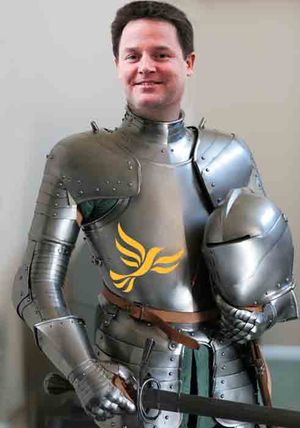
King Edward IV (call me Eddie) was a strapping, beach blond looker of king with an easy charm that worked equally on women and men. First job on the agenda was to get even with the Lancastrians. Together with the Earl of Warwick as his trusted deputy, they eventually tracked down and killed most of the Red Rose leaders in the aftermath of Towton. A few of the Red Rose gang kept giving the White Rosers the slip until Henry VI was located hiding in a cheap inn in Blackburn. Henry was given a new place of residence - inside the Tower of London and a vague promise that King Edward would recommend him for the post of Pope when a vacancy occurred. Only Queen Margaret and her son Edward, Prince of Wales remained free - first scrounging off their Scottish supporters before eventually going over to France to live on a her Deposition pension. The Red Rosers appeared to be finished.
Whilst 'Eddie' was happy trying to impregate all the servant girls at court, the Earl of Warwick was in effect his Prime Minister or 'King Maker or Breaker'.
Warwick had hoped to get King Edward to marry into some useful European money (and earn him a handy commission fee) and gave the King a list of possible Queens. However the King's serial seducing had been stopped when he went goo-goo eyes with Elizabeth Grey, a widow with two young sons whose husband had failed to dodge a Yorkist mace at an earlier battle. She was also a Greeting Card carrying member of the Lancastrian supporting Woodville family and therefore no friends of anyone sporting a white rose. Edward didn't care and hoped to bed Elizabeth and be out again hunting and whoring but the Merry Widow said she would consent if the King would marry her. To Elizabeth's surprise, Edward agreed.
Warwick was shocked and moaned to his loyal supporters that he was being pushed out of government by the new Queen's Woodville relatives. Their prompt ditching of the Lancastrian party to join the Yorkists was considered opportunistic even for those rose turning times.
With gruntles very much dissed, Warwick found an ally with George 'Ozbrawn', Duke of Clarence and the younger brother of King Edward who had been hoping his 'bed sword waving' brother would be killed by an engorged love rival. The King's marriage changed that equation so Clarence joined Warwick and secretly revived the near moribund Yellow Rose faction to take on the Yorkists.
In a brutal coup, Edward was locked in a bedroom room and chained to the radiator by the plotters. They then looked for the Queen's family and friends, executing her dad Earl Moon Rivers and anyone else that took their fancy.
Clarence's hope that he would be soon wearing the crown were punctured when Warwick decided that it all had been a 'ghastly mistake' to have killed the King's father-in-law and his closest advisors. No hard feelings etc.. and unchained Edward from the radiator after he signed a coalition agreement in the gardens of the Royal Palace of Westminster. There Edward or 'Eddie' and Warwick or 'Wicky' kissed, hugged and made up and said the new government would last the next five years at least. The White-Yellow coalition government was formed.
In fact it lasted about five months. The rival White and Yellow rose factions were soon back biting, front chewing and side spitting with each other. Fearing a sharp knife in the throat, Warwick and Clarence slipped out of London and fled to France. There they met King Louis IX and to hear his plan to oust King Edward. It would involve a little compromise - allying with the Lancastrians and that meant becoming mates with Queen Margaret and her son Edward. This was a hard show to put as Warwick had personally killed many of Margaret's Red rose supporters and she had de-nogged his father after he had been captured earlier. However King Louis was a seductive French flatterer and the new, Red-Yellow alliance was forged. Now they prepared for an invasion of England.
1470-1471: Return of the Loon
King Edward was literally caught with his pants down in a bedchamber with one of his latest conquests when he was told the Warwick and his new Lancastrian allies had come back. Bravely abandoning his family and friends, Edward thumbed a lift on a wagon bound for Burgundy, ruled by brother-in-law Duke Charles the Nappy Rash. Those Yorkists who hadn't made themselves scarce were rounded up and given to the Scottish Lancastrian supporter Sir Alex 'Fiery Breath' Ferguson. He organised a kick around at Manchester United's football ground at Old Trafford using the decapitated heads of the White Rosers (or 'Leeds United as they were also called) as footballs.
With the King Edward gone, Warwick retrieved the sad sack of spuds that still went by the name of King Henry VI from the Tower of London and dropped him on the throne.
Warwick then sent a message back to Queen Margaret to come over to England with her son the Prince of Wales but wrote it in a way a spider would invite a fly to drop by. So Margaret stayed put in France a bit longer and asked her own supporters to organise another army in case Warwick switched sides again.
King Edward meanwhile stayed inside a safe house in what was called 'The Low Countries', Belgium and Holland known also as the Sweaty Crotch of Europe. Duke Charles of Burgundy was a personal enemy of Warwick. Some years earlier, Warwick as 'Captain of Calais' had plundered Charles's ships, throwing the luckless crew overboard and kept the cargo. When Warwick was challenged on where he had found all his nice furniture and tapestries, the rogue claimed it was stuff that had 'fallen off the back off a ship'. So Charles decided to support King Edward - in exchange for persuading the English press to change the sobriquet when describing him from the unflattering 'Charles the Rash' to the more headline pleasing 'Charles the Bold' when writing about the ruler of Burgundy. Edward agreed, took Charles's money and financed an economy-sized invasion fleet to land in Yorkshire to gather up his supporters.
For the Yellow Rose supporting Warwick this was a problem. His old colleague George, Duke of Clarence volunteered to raise an army for the Yellow Rosers which he did but then promptly joined forces with King Edward's troops. Clarence's side switch was so quick, he had to wear an old overcoat to hide his shocking yellow coloured suit to avoid a head mashing from angry Yorkists. Edward forgave his brother's 'turn rose' activities but tied Clarence to his horse the next time they went into battle to avoid any 'second thoughts' by slippery George.
Warwick gathered what troops he had from the mutually suspicious Yellow and Red Rose factions and marched off to find King Edward. It was an unhappy army with many soldiers trading insults with each other and promising to stab each other in the back when no one was looking.
The armies met at Barnet, a small hamlet just north of London. In a confused battle involving smoke machines, a lot of strange drugs and treachery, Warwick's army collapsed and he too was overtaken as he tried to flee the battlefield and drowned in a puddle of filth. This was the practical end of the Yellow Rose faction as a serious military/political force. Edward got back into London and re-booted his reign. The befuddled Henry VI was persuaded to return back in the Tower of London and stayed collared like a dog whilst Edward left the city to met a new threat. Margaret was finally back, this time with her young son, Edward the Prince of Wales.
News that Warwick was dead and the Yellow Rosers leaderless again cheered the Lancastrians. It would be now a straight Red v White clash.
The two armies of Yorkists and Lancastrians finally met in a medieval wagon park round the back of the Tewkesbury Arms in Gloucestershire. The Lancastrian leader, Edmund Duke of Somerset confused his own battle plans with a shopping list and lead his wing of the Lancastrians into a supermarket looking for milk and bread. The Yorkists then fell on the rest of the Lancastrians and smashed their army. Somerset finally appeared again, clutching a bottle of bleach but it was too late.
Edward killed or executed the Lancastrian leaders whilst Queen Margaret was captured and posted off to the Tower of London to see if her 'French friends' would ransom the old bag (King Louis IX eventually sent a full box set of French minstrels to Edward IV a few years later as payment). Her son Eddie 'Red Roser' wasn't so lucky. The Prince of Wales was captured and then lured into a lavatory where King Edward, George Duke of Clarence and a new comer to the killing business, their baby brother Richard Dagger Dickon, Duke of Gloucester were waiting in cubicles. Once the prince was locked inside, the Brothers York clambered over the partitions and set upon the unfortunate Lancastrian heir until he lay dead next to the urinals.
With now all his enemies apparently either dead or captured, King Edward sent orders that ex-King Henry VI was to be die of grief on hearing about the death of his son. It was sadness wrapped in a hanky covered mace which came crashing down on poor Henry's head as was given the news. Edward was now the only King of England. No more Lancastrians, no more male Beauforts either and no more Warwick. The only 'Lancastrian' wannabe was Henry Tudor, Earl of Richmond and his leery uncle Jasper who had managed to smuggle themselves out of England dressed as Welsh sheep.
1471-1483: Message in a Barrel
The elimination of the Lancastrians (except Henry Tudor) and the death of Warwick left King Edward in a strong position. He hadn't forgotten Clarence's opportunistic rose switching activities and his wife Queen Elizabeth had even more reason to pin cushion Clarence for supporting Warwick in head chopping her father Earl 'Moon' Rivers the elder and one of her brothers.
Gangrenous George however had other more interesting plans. Clarence hoped to become the next Duke of Burgundy when Charles the Bold got eaten by wolves whilst trying to use a forged Swiss bank account in Zurich. Charles left behind a 19 year old daughter Mary as heir who was just Clarence's type, especially when he was now recently happily widowed. Mary of Burgundy's stepmother Margaret of York (and sister of Clarence) said she would put a good word in for her slippery brother but told him to hurry as a chin jutting Austrian called Maximilian Habsburg was on the move to claim Mary's favours and the spare pillow in her duchess sized bed.
Edward IV wasn't sure he liked this arrangement and nor was King Louis of France much enamoured having the brother of the English king as a next door neighbour. He asked if Edward had a solution and hinted that there was pot of gold in it for him too. So when a barrel of wine arrived from over the English Channel marked for the attention of Clarence, he went down to inspect in the cellar with two of Edward's trusted advisers. On reading the greeting card which said What You Seek Can Be Found Inside, Love, Mary of Burgundy, ' Clarence insisted it was opened and peered inside. As he did so, his two companions smartly tipped him in and closed the lid. Though the drowned Clarence was wheeled away for burial, the wine wasn't wasted and left in the royal cellars, marked as 'Clarence'. It's foul flavour was reserved for people Edward didn't like. After that anything bad tasting was called a 'clarence' but overtime this was changed to 'fancy a glass of claret?'
Following the news that his brother was dead, King Edward ordered the pubs to stay open all day as a sign of mourning. Queen Elizabeth sent a thank you note to King Louis and danced around Westminster Palace. The only person who seemed slightly disturbed by the manner of Clarence's death was his younger brother Richard Duke of Gloucester. William Shakespeare later libelled Richard for Clarence's death, though considering what Richard did later, killing a notorious political flip-flopper like 'Georgie' was considered a public service.
1483: Richard the Turd (He's from Brooklyn)
The death of Clarence (and delivery of the promised French gold) kept King Edward happy to go back to his old hobby of waving his waist sceptre in the direction of any woman he royally fancied. He also asked his new friend William Caxton to be ready to get new fangled printing press to publish a book he intended to write but then died, his former good looks ruined by excess sex and eating fast food in his old campaigning days.
The new king was Edward's young son Edward V, a thirteen year old lad just on the cusp of officially getting a subscription for Play Knave magazine. However Edward was never able to take up that reading habit. Uncle Dick was about to make a power move.
Richard, Duke of Gloucester had been the ugly runt in the family. Where as his brother Edward and George had the looks and had no problems getting the girls, Richard had neither. He was also born with a large hump on his back. His father Richard Duke of York had been so bothered that he had written to Quasimodo at Notre Dame in Paris to see if he was looking for an assistant bell ringer. In the end that fell through and Richard hung about with Edward (now King) in the hope something would come his way.
Richard dutifully followed his brother's orders and spent a lot of time, hunting out any lingering supporters of the Red Rose Lancastrians including the irritating Welsh pretender Henry Tudor, living with uncle Jasper in a holiday cottage in Brittany in supposed familial happiness. Richard also put on a watch on Henry Tudor's mother, the bossy Margaret Beaufort but she had married into the Stanley family. They were a clan of racketeers from Merseyside, medieval mobsters who were good manufacturing knives with retractable blades and playing hockey with the heads of their gangland enemies.
But Richard of Gloucester was unhappy the King's in-laws, the grasping Woodvilles who had taken over the White Rose party. Like his brother Clarence, he married into the family of the dead Yellow Rose leader the Earl of Warwick. Whilst Clarence married Isabel of Warwick, Richard chose her younger sister Anne. She was his type of woman, she being a bit thin and weedy. When Isabel and Anne's mother, the widowed Countess of Warwick objected to her unwanted son-in-laws, Clarence and Gloucester said she was legally 'dead' and told everyone to stop listening to her. When Clarence in turn was drowned, the surviving supporters of the old Yellow Rose blamed Queen Elizabeth and voiced support for Gloucester.
Whilst Richard waited for the new King to arrive in London, he invited Edward V's younger brother Richard Little Dickie for a tour round Westminster Abbey. Come closing time, the little runt was no where to be seen. When King Edward asked where his brother had gone, Richard made some excuse and suggested that his nephew should stay in the Tower of London for his own protection as he had information that gang of Royal prince snatchers were on the prowl. Edward V agreed and took up residence in the Bloody Tower Suite as all the other apartments in there had been block booked by the Hanseatic League for a business conference.
With both his nephews in the Tower of London, Richard now put out the story that actually his brother King Edward IV had been a bastard all along. He claimed their mother Cicely had cheated on old Dickie Plantagenet and that Edward's father was in fact Dan Archer, a yeoman bowman from Borsetshire, a county for actors too ugly for the television. Parliament was summoned and agreed that Edward IV had been indeed born 'the wrong side of the blanket' (it was believed sexual relations with the lower orders were usually conducted in a barn or a field) and therefore retrospectively listed as usurper. This meant also his children by Elizabeth Woodville were also, legally speaking, baskets too. The only person now standing in Richard's way to the throne was the ex-Duke of Clarence's son Edward 'Chopping Block fodder', Earl of Warwick. But he was a kid and considering who his father had been, there was a suspicion that young Warwick carried the treachery gene in his blood. That was the suggestion put around by Richard. So be default, Richard was the only viable candidate left. Hurrah for King Dick! Bring on the street parties.
1483-1485: The White Rose Gets A Fatal Pruning
Richard III's rapid rise to the top job split the ruling Yorkist government. Those who supported 'the Bastards' as Richard now labelled his nephews were quickly given a fatal hatchet job. When his sister-in-law complained that neither ex-King Edward V or Little Dickie had been seen for awhile, Richard suggested they were typical lazy kids, never getting out of bed before midday and only waking up properly when it was dark. Then a few months later he simply said that they were 'now missing' from their residence and left notes behind suggesting they had bunked off to Europe for a holiday of free wenching and boozing. King Richard then put out a press release suggesting the missing princes would soon come back to England home, cadging for pocket money, sponging off the family or lurking around supermarkets.
Of more importance for Richard was to finally get his hands on Henry Tudor. The Welsh pretender had been annoying Richard by sending over ballad singers from Brittany to England to poke fun a 'King Dead Eye Dickon'. Tudor also suggested that Interpol had found no trace of Prince Edward or Richard in Europe and hinted their wicked uncle had locked the boys in the dankest, darkest and most Hollywood like dungeon anyone could imagine.
Richard sent gifts to France asking/demanding they silence 'Taffy Tudor' and his bedraggled Red Rose remnants but the new French King Charles VIII was suspicious of the English King. He too was a child monarch and was convinced Richard had killed his nephew. So Charles agreed to sponsor an invasion of England for Henry Tudor. In an attempt to get rid of his own growing prison population, Charles allowed Henry Tudor to recruit from the most desperate criminals he could find and told them sail off or sod off somewhere else. Henry Tudor took the hint and with his randy old uncle Jasper, landed in Wales to take on Richard III.
The invasion by such a rag bag army didn't bother Richard at first. He wasn't having the best of it domestically though his wife Anne had just popped her silk stockings and his only son Edward of Middleware had died after choking on a suspicious large gob stopper. Alone and morose, Richard told his army to meet him near Leicester and that anyone who lurked or shirked on their estates instead of marching would see their loved ones suffer a cruel death. In particular, Richard had made sure to get hold of a hostage from the Stanley family in case he woke up with a back peppered with retractable knives. The leader of the gang, Lord Stanley (Stan the Man) offered Richard a selection of his sons:Lord Weird, Lord Pervert, Lord Crossdresser and finally Lord Strange. Richard opted for Strange and told the lad that if his father didn't turn up to the battle, he would personally pop out the boy's eyeballs with his thumbs. King Richard had a way with children - putting them away for good.
Finally after waiting for days, Richard saw in the distance, made out Henry Tudor's mixed mob of murderers, mercenaries and second chancers. They didn't look very formidable. Also turning up to take part in the war were Lord Stanley. They set up their own camp with the excuse that 'didn't like mixing with others' and got shy undressing in front of strangers.
Henry Tudor's army had rather got smaller since he landed in Wales. Many of the French contingent had buggered off for less dangerous activities than ending up skewered on an advancing lance. Henry had carried on and at least his Welsh troops were happy to take on the English. They happily wore their red shirts and shouted (in Welsh) Llanfairpwllgwyngyllgogerychwyrndrobwllllantysiliogogogoch which was a bit premature, as the age of trains lay in the future.
The two armies eventually got to grips whilst Richard looked anxiously all around him. Guarding his rear was Henry Percy, Earl of Northumberland but the Prince of the Geordies showed no signs of wanting to get involved. Richard also sent a message to Lord Stanley demanding that he joined in the attack against Henry Tudor but the Liverpudlian knife boys didn't budge.
Finally frustrated, he exclaimed 'DO I HAVE TO DO EVERYTHING BY MYSELF!?' and rallied his own personal bodyguards to heave their fat asses after him as he rode towards Henry and Jasper Tudor who were lurking around the back of their army to prevent desertions - and to eat their packed lunch in relative privacy.
As Richard and his charging escort got closer to Henry Tudor, Richard was initially pleased to see that Stanley and his men had flicked out their blades and were heading in the same direction. But it was a cruel trap. At the last moment, Stanley and his men crashed into Richard's troops.
You randy scouse gits...Richard is alleged to have cried as he was surrounded by Stanley's soldiers. There then followed a lot of frantic hitting at anything that seemed to be an enemy until Richard got a blow in the back and fell into the mud. Staggering as he got up, Richard tried to barter for a horse, a holiday for two in Corfu or a year's subscription to the Disney channel but there were no takers. He was bashed to the floor again and died. His body was completely stripped by his killers and left naked and bloody on the field. The Turd was then bought by an Irish family of travellers who moved it to Leicester as part of a wagon park infill. There is lay until it was rediscovered in 2012]].
The Tudors and the Stuarts
So now we switch attention to the Tudors. A remarkable of family of outsiders from Wales who had got into British Royal politics via a randy French widow Catherine Valois and Margaret Beaufort, a clever member of the staunchly Lancastrian Beaufort family who managed to keep her head whilst all around her lost theirs. The heir to this fortune was Henry Tudor who would go on to produce a family that has kept countless screen writers, bad actors, bored school students and the heritage racket in business ever since. Thanks Henry 'Two Doors', you gave Britain a hatchback of horrors.
1485-1509: Age of Impostors
A new King of England started his reign looking at the naked corpse of Richard III lying in the mud. Around him his victorious army celebrated the victory and Lord Stanley proclaimed Henry Tudor as Henry VII and handed over a crown (he had one in a saddlebag) to his new 'liege, lord and supplier of all riches'. In return King Henry kicked Stanley up the arse in what was called Elevating Someone Up the Peerage. Stanley's reward was the title of Earl of Derby so he could run race horses in honour of the great victory at Bosworth. And it would also please his battle axe mother too as she was married to the old crafty bugger.
For a poor Welsh boy who lived most of his life in exile or working as one half of a poor entertainment act with his seedy (and smelly) Uncle Jasper, these were heady days indeed. Henry's own father Edmund had died before he was born as he had made it clear to Margaret Beaufort who wasn't interested in changing dirty nappies or washing sick off the carpets. When his mother was flogged off to a new husband (she was a rich and in those days, an heiress was treated as part of the furniture when calculating the worth of an estate), Henry had been brought up in Wales with foster parents. His only family connection was his uncle Jasper who would drop by and suggest the young boy visit him in the guest bedroom to look at his manuscript collection. What went on there was never divulged but it's likely Henry VII was still a virgin when he became King.
Once in London, Henry VII married Elizabeth, the eldest daughter of Edward IV. The rest of her surviving family were electronically tagged and told to report to the Tower of London every day. The old queen Elizabeth Woodville was still hoping that news about her missing boys would be uncovered and asked Henry to investigate. He showed no signs of being in a hurry (unsurprisingly, considering both Edward V and Little Dickie had a better claim to the throne than Henry). The dowager queen complained about the slowness in police enquiries but eventually got banished from court after an argument with Henry's mother Margaret Beaufort about the choice of decorations at the royal palace in Eltham, London. Old Queen Elizabeth retired to a home and lived out the rest of her life alone with her cats in a bungalow down by Brighton. With his mother-in-law gone, Henry enjoyed married life with Young Elizabeth and the couple were soon at producing a family. This wasn't just a matter of sex but an important political act to emphasise the union of the former warring Red and White rose parties (no one cared about the Yellow Rose lovers now except in Texas).
Whilst Henry was supposed to be looking for the missing 'Princes in the Tower, he got hold of another Plantagenet prince who could be awkward customer if left free. This was the luckless Edward of Warwick, the only son of the 'barrel' boy George, Duke of Clarence. Henry had him locked away in the Tower of London but was then surprised to read that the Yorkists White Rose Refuseniks had rebelled and said they had the real deal as regards Edward of Warwick. The boy whose real name was Lambert Simnel even got crowned in Dublin as King Edward VI and invaded England. Their army was defeated by Henry at Stoke Field. Some more of old Richard III's cronies lost their heads on this campaign but in a surprising move from a King who had a low mercy threshold, Simnel was dragged off to Tyburn to have his entrails pulled out his body. He was instead given the job of Head Gardener by Henry and given the special task of providing quality manure for the King's rose garden. It was probably an example of Henry VII's notorious dry compost sense of humour.
No sooner than Simnel was spreading horse shit over the flowers and the unfortunate Edward of Warwick turning 'Goth' in his prison cell for the lack of fresh air and light in his black painted cell in the Tower of London, than a new impostor appeared on the scene. He claimed to be Dickie Junior, brother of Edward V and insisted to be addressed as Richard IV. King Henry's informers told him the Fake Dick was really a Belgian or Fleming called Perkin Warbeck who had once earned his living as an actor. The new imposter was a danger as he had some serious money behind his bid, including a tasty pension from the dowager Margaret Duchess of Burgundy (sister of Edward IV and Richard III) who backed the wannabe King against Henry.
Like all medieval monarchs with no understanding of money, Henry VII's economy was soon going down. He and his wife had been busy on the breeding front and produced two sons (Arthur and Henry) and two daughters (Margaret and Mary) who hadn't died from drugs. Without consulting his children, the King got marriage offers from Spain, Scotland and France for three of his kids. Henry junior (Henry VIII) wasn't included as his father thought the boy would be an ideal cardinal or bishop. He would be so good at the physical stuff and putting it around that his father wondered if Henry could become the next Pope.
But important family matters had to be settled and the most important was Warwick and 'False Dickie'. Henry eventually managed to barter for the impostor by persuading (which meant bribing of course) the dowager Duchess of Burgundy to give up her toy boy King impostor and hand him over for a spanking. Richard IV or Perkin Warbeck was told he could keep his essentials (i.e. head, genitals etc) if he confessed that he was fake. Perkin agreed but a couple of years later, Henry changed his mind and 'Perky' was hanged. Henry also managed to entrap Warwick in some fancy-pants plot about a rebellion and to help international confidence on the stability of his regime, had the prisoner executed in 1499. Warwick was blamed for his own death and that really was it as regards the Plantagenets. Also Henry took revenge on all the various ex-Yorkists by fining them and said they had been acting like 'Feudal Bastards' and that if they wanted to carry on dressing up their soldiers in garish armour and bright clothes, there would be a tax levied. They caved in and that was the end of the era of Feudal Bastards. Well it was the dawn of a new century and what could be once achieved in sending in a heavy mob could be done in other ways.
Henry was by now pretty much worn out but he was still concerned that the missing Edward V or his brother would come out from a swamp as the Undead and ruin the Tudor family home. What he did need was a confession and eventually one of Richard III's henchmen Sir Walter Strangler confessed he had done the dirty and was spared the more gruesome bits of execution in exchange for 'A Fulsome Confession Before I Was Show the Instruments of Torture'. He said Edward and Richard had died after a struggle about whose turn it was on the 'Knightendo'. To stop the racket and get on watching his favourite travelling show (Medieval England's Got Talent..Or Perhaps Not), Sir Thug had smothered the battling brothers with a handy pillow. Strangler was thanked and then led out to have a 'head surgical removal procedure. This meant this unlikely story couldn't be contradicted in the future by its principal source.
The King's last years were not so hot. His wife died, swallowing pieces of a family scrabble set as she had grown to hate her husband. His eldest son Arthur had got married to his Spanish wife Catherine of Aragon but she claimed that the Prince was ' a limp prick in bed' and he died from a coughing fit brought on by shame. His elder daughter Margaret was forced to go to Scotland to marry King James IV. She wrote bitter letters back complaining about the weather, the drinking and her husband's brooding moods about wanting to 'put one over' on the hated English down south. As for Mary, Henry noted that King Louis XII of France had asked for new wife who would 'bring the joys of summer back into his tired loins' - so off she was packed too. This only left Prince Henry at home but his father decided to keep the boy away from girls and that if he needed to whack out any frustrations, young Harry would be given the key to the King's personal privy to avoid scandals.
1509-1603: Let's start a new church up
In 1509 Henry VIII became King of England. Henry was a tough young man and staunch Catholic and when the Protestants tried to import their crazy new ideas into England he had them all shot with the largest and loudest crossbows in the kingdom. The Pope at the time, Leo X, really enjoyed this and was even invited to England by King Henry to watch the crossbow in action, complimenting the English monarch on the "squishy heretic guts which do cascade through God's clean air" which lead to him awarding Henry the title "Defender of the Faith".
Things went wrong between Henry and his favourite Church, though, when he realised his wife wasn't going to give him any male children and decided he wanted a new wife. Pope Paul III, though, wouldn't let him divorce her and this infuriated Henry. So, in 1530, he severed links with Rome and made the Church of England independent creating a new branch of Christianity - Anglicanism - basically Catholicism without a Pope and where you can divorce your wife if she won't give you any male children as long as you are King. Although Henry still believed strongly in much Catholic practice his reforms (which included seizing all the monasteries and their gold, an act of nationalisation even Hugo Chavez hasn't surpassed) let Protestants in through the back-door with their black-clad "reverends", pinched faces, boring food and drab wooden churches.
Though Henry had a new church, he wasn't so lucky between the royal bedsheets. Six marriages gave him three children, two of them girls which during those years were considered less important that having a stable full of horses or owning a decent suit of armour. Henry blamed everyone for his poor breeding record and executed anyone who would dare to mention this at court. Even in war Henry was a flop on the battlefield and at sea it was no better. Sitting on his throne with a takeaway pizza and a flagon of ale, Henry watched his fleet at Portsmouth take on the French. However the battle didn't go well and Henry cursed and threw his royal tankard to the ground when his favourite ship, the Mary Rose, sank without firing a shot. Henry blamed his fleet's manager and tried to have him executed but died before sentence was carried out.
Henry's only son Edward VI became the next king but he was only nine and preferred to run around the playground slapping girls. He allowed the Duke of Somerset as Regent to run the country and then when he died tripping over an executioner's block, the Duke of Northumberland took over. When Edward VI was finally killed by a girl whose bottom he had tried to pinch, Northumberland made Lady Jane Grey Queen (as Lady Queen) with his own son Guildford Dudley (named after shopping centres in Guildford and Dudley) as her consort. However Henry VIII's daughter Mary claimed it 'was about bloody time I became Queen' and she led an army that overthrew Northumberland, sacked Guildford and imprisoned Lady Queen in the Tower of London. Once they had all confessed to being a 'bunch of Protestant Shits', Mary signed their death warrants, revoking her earlier guarantees of 'forgiveness'.
Mary was also a staunch believer in Catholic practice and caning Communion wine but unlike Henry was also a fan of the Pope and restored the link with Rome. Just in case anyone hadn't got the message (English peasantry being a bit slow when it came to politics) she married the über-Catholic King of Spain, Philip, and re-introduced "crossbow justice" for "protestant heretics". However, all her "heretic"-killing caused her to attract "bad vibes" from her religiously-divided Kingdom. Hoping for a little war to make her more popular, Mary joined Philip in a war against France but had forgotten to tell the garrison in Calais, the capital of what remained of 'English France'. So when a small French force turned up to check out the city, they found the gates wide open and the English soldiers in the pub playing darts. It was such a humiliation that Mary took the radical decision to have her chest tattooed with the 'Remember Calais' design but the needle slipped and stabbed her fatally.
Mary's despised sister Protestant sister Elizabeth I took over. Elizabeth may have had the body of a weak and feeble woman but she had the heart and stomach of a King which she kept in a pickle jar and if people in her court disobeyed her she would bring the jar out and wave it in front of their appalled faces whilst shouting "Looke! 'tis the heart and stomach of a Kinge!" until they stopped disagreeing. She beat the Spanish Armada (well, strictly-speaking the sea and coastline did most of that but let's not spoil the legend) which consisted of about a billion ships and made England a major European power whilst also managing to have her relative Mary Queen of Scots executed and not having sex because she was "married to her country". Eventually, in 1603, she died whilst standing up. In fact, I think there might be a sealed off room in some royal palace somewhere in England where she's still standing in a really creepy way.
1603-1649: Here come the Scots
Following the death of Elizabeth I the English realised that they didn't have anyone left to replace her because, like a silly, she'd forgotten to have any children. Not to worry, though, the hairy Scottish royal family, the Stuarts, had a claim to the throne and even though the English couldn't stand the Scots they just stood aside and let King James VI of Scotland saunter on down across the border with his fried haggis-mars-bar and ginger public hair to the sound of bagpipes. It never occurred to them that they could, you know, maybe choose who became King but don't worry. They worked that out later.
James VI became King of both Scotland and England (as James I, just to confuse everyone). Like all Scots, he was dour and pinched pennies and kept England in the black but miserable. He was also a massive homosexualist and wrote a pamphlet called A Counterblaste to Tobacco in which he moaned about how the English liked to smoke de baccy; he demanded smoking in bars be banned and proposed a bill to Parliament which got lost and only passed in 2008.
Since James was now king of two countries he proposed that this made their separate legislatures and governments pointless because they were both his "bytches" and that there should be a "ye acte of unione" which would create a new country which James suggested be called "ye Grayte Britaine". This was discussed at great length in both London and Edinburgh but nobody could agree on the flag. "The Cross of St Andrew proudly smothering the Cross of St George as our noble James VI has smothered Tudor England" suggested a Scottish MP in a massive ruff and codpiece. "Naturally, it should be a massive St George's Cross with maybe a tiny Scottish flag somewhere, representing Scotland's tiny treasury. By which I mean cocke, sirs!" said an English MP in a stupid hat smoking a very long clay pipe. The impossibility of agreeing on this issue put paid to any idea of a union of the two countries and the issue was dropped. "Bah!", said King James.
Because James was both Scottish and a Protestant he was especially loathed by English Catholics, an extremist branch of which decided to try and blow him up when he was opening Parliament. They spent ages putting-together a cunning plan involving stacking up barrels of the popular explosive gunpowder underneath the House of Lords but arsed the whole thing up because the chap who was left to guard it, one Guido "Gay" "Guy" Fawkes, really needed a pee and so did it all over the side of the barrels meaning they were too soggy to light. He was caught by a passing guard who'd heard the moan of relief and sound of passing water earlier and dragged to the Tower where he was bitch-slapped until he gave the names of his accomplices who, along with him, were all hung drawn and quartered in the traditional manner. Fawkes is remembered today as a mask worn when annoying Tom Cruise.
When James died power passed to his Fifer son, Charles, who became King Charles I and who was like his father only rubbish and about three feet tall. Charles didn't like his English Parliament and thought he should rule alone, like a proper King much as they had on the continent, so he kept dismissing the assembly and passing laws which upset his English subjects. Eventually, they got completely sick of it and started slagging him off when he eventually called a Parliament again, referring to the pint-sized son of Caledonia as "that foppish Scotch Hitler". Charles, being a good tyrant, wasn't going to stand for that so he marched into Parliament one day and tried to have all the MPs who didn't like him arrested and taken to the Tower. Unfortunately for Charles, the MPs escaped because on his approach to Westminster they heard the clip-clop of the tins of paint he attached to the soles of his shoes to make himself taller. The exchange of "angry words" between the King and his legislative body got worse and eventually Parliament decided that the only way to teach the King a lesson was to raise an army and fight him in what became known as the English Civil War. After many years of fighting and a lot of "negotiations" which basically consisted of Parliamentary leaders saying "Look, your Majesty, just stop being such a cunt" and the King replying "Sir, I am anointed by God to be as cunty as I do wish to my rightful subjects!" it became clear that neither side would give an inch. Another civil war erupted which the Parliamentarians eventually won and Charles was tried for treason and swiftly executed on a chilly winter morning in 1649. After his execution the axeman held his head up and proclaimed "Behold the head of a traitor!". He then tried to use it to perform a ventriloquism sketch but was hurried off the stage by redcoats. A shame, because the sketch was really very good. Bloody squaddies!
1649-1660: The Cromwellian Years
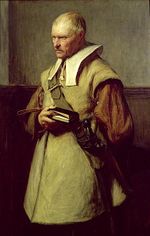
After Charles was executed the English decided they didn't want another King so they passed a bill making England a republic. The new republic was dominated by puritans - miserable nonconformist Christians who thought polished buckles on shoes was flash dressing and that putting sugar in porridge was sinfully decadent. The Scots, meanwhile, were quite cross about King Charles being executed without consulting them and crowned his son as Charles II of Scotland by sitting him on the most-ancient Stone of Scones. England feared a Stuart-ruled Royalist army massing in the land of porridge and so invaded under the leadership of Oliver Cromwell, a parliamentary general and de facto leader of the Commonwealth who easily defeated the Scottish army by throwing a five pound note over a cliff. After Scotland was subsequently subdued and annexed he jumped on a ship, sailed across the sea, and did the same to Ireland except that rather than doing the trick with the five pound note he did the same with a potato. Only joking, he just killed absolutely everyone on the island he could find for being "Papist Royalists" or just "Generally Irish" before installing his son, Henry Cromwell, as Governor of What is Left of Ireland and returning to England. By this time Parliament, who had decided they weren't as keen on governing the country as they'd originally thought, offered Cromwell the crown but he refused because he'd heard Charles I had nits. And so, in 1653, he became Lord Protector instead.
Under the new Protectorate, the Commonwealth was a bit of a sourpuss place where people weren't allowed to celebrate Christmas and Parliament had to do the bidding of the Lord Protector which usually entailed stopping people having fun. "This isn't what we fought a revolution for!" said various disgruntled republicans who started issuing leaflets stating "Cromwell art the worste! Hate hate hat!". Cromwell had them rounded up by his secret police and shot or sent to the Tower for "ye treachery". There, they were subjected to the worst things the Puritans could imagine: dancing and Christmas cake!
Cromwell died in 1658 and his son, Richard Cromwell, succeeded him but Richard was a bit rubbish and could never decide what to have for his breakfast, let alone how to rule the country so he was placed under house arrest by the army in 1659 who encouraged him to resign using their muskets. Then George Monck, who'd been in Scotland keeping the locals in line, marched down to London and pretended to be a republican even though he had secretly been sending letters (of a strictly platonic nature) to the "Royal" court in exile. By now the Commonwealth was effectively leaderless and so Monck unofficially slid his considerable buttocks onto the vacant metaphorical throne.
Monck, after enjoying a hearty dinner fit for an unofficial king, decided that the only way to stabilize the country was to end the "good old cause" of republicanism and restore the "bad old order" of monarchy by letting all the lace hanky-waving toffs back into Parliament who then voted for the monarchy to be restored and the redistribution of taxes away from the army and back to them. One Charles Stuart Jr, who had spent the past eleven years in exile, immediately stopped having sex with a French prostitute on hearing this news and hurried to London. He arrived dressed like Russell Brand in late May of 1660 just in time for the very first Summer of Love in which all the loving was entirely done by the new King, declared Charles II, whilst the fountains ran with wine so everyone could be drunk all the time. Under Charles, Scotland was given its independence again and the Scots celebrated by getting drunk, pulling down all of Cromwell's fortresses and getting drunk.
1660-1688: The Restoration Era

With the puritans out of power the English and the Scots were allowed to have fun again (although not the Irish) and bawdy plays called "Restoration Comedy" were put on in which vicars walked in on men at the moment their trousers fell down and thin homosexuals with large nostrils were lusted after by overweight nursemaids. In this atmosphere of crude merriment people failed to notice that the new King was a bit of a chip off the old block and rather fond of personal rule over working with his Parliament; maybe everyone was too busy staring at his fine legs in their white tights, awesome curly periwig and sexy Color Me Badd-style moustache. England's Parliament, however, frequently got pissed-off with the King for his autocratic ways and there was one Cromwellian plot against him and his brother James which was foiled when the vicar walked-in as the plotters trousers fell down. One of the plotters turned out to be Charles' illegitimate son Wee Jimmy, the Duke of Monmouth who he exiled to the Netherlands. "He really was a bastard!" said Charles, laughing at his own joke.
It was under Charles II that the first political parties were unofficially formed in England. Those who had fought for the Parliamentary cause in what was now known as "the war we don't mention in front of the King or his secret service gentlemen" formed a parliamentary "club" called the Whigs, dedicated to controlling the powers of the Monarchy and increasing the influence of Parliament. On the other side of the house, we had the Tories who thought Kings having all the power was part of the Natural and Godly Order of Things and it wasn't for mere Whiggish mortals to go changing a system which had worked "perfectly well" since the Roman Empire had fallen to bits. Although King Charles and his Crown held actual power, there was considerable debate, spitting and fist-fighting for bragging-rights and influence amongst these two factions in his Parliament.
Charles managed to reign for 25 years, fathering hundreds more illegitimate children and catching hundreds of interesting and exotic diseases from their various mothers. He also oversaw a war against the Dutch which he used to force them to be nicer to his Dutch nephew, one William of Orange who had married his niece Mary. "Truly this forges a bond between the houses of Orange and Stuart" said the King, "There is clearly no way that, for example, you would ever come to England and overthrow my line." "The very idea!" said the young Prince of Orange.
Just before Charles died in 1685 he converted to Catholicism using a handy priest he had kept in a drawer in Whitehall Palace and having spent all his time in power pretending to be an Anglican, not that anyone would do that now of course.
Power passed to his brother James II, also a friend of the Pope but, unlike Charles, out-and-proud rather than closeted. Whilst Charles had always been rather popular with his people James went back to the family tradition of being a bit of a dick and had lots of people hung, decapitated, imprisoned and basically didn't try to win many friends. Very soon there was a rebellion against him lead by our old friend the Duke of Monmouth who escaped from the Netherlands (not difficult really) and landed in England and raised an army using his "instant army mix (Protestant flavour)" and some milk. Monmouth was determined to stop all this nonsense, overthrow his uncle and become King himself. He was defeated by the Royalist armies, though, who promptly cut his head off. Then they realized he was a Duke but didn't have a portrait so they dug him up and stitched his head on and made him sit for the painter. I'm not making this shit up. The rebellion unsettled James who started nervously glancing at portraits of his father and instinctively touching his neck, and he decided that the best way to ensure the continuation of his reign was to try more people for treason and have them hung by his good friend and notorious psychopath Judge Jeffreys or deported to the colonies where their radical ideas definitely wouldn't take any sort of hold, oh no.
By 1688 much of the English establishment had become tired of James' autocracy and fondness for filling the Tower of London or cutting peoples heads off and a conspiracy was formed which invited James's son-in-law, William of Orange, to pay a visit to England and perhaps bring thousands of heavily-armed Dutch troops with him. William duly landed and James, remembering soldiers marching towards Whitehall Palace meant trouble, did a runner. Parliament, declaring the throne was now "vacant" offered the crown to Willy. "Can you do that?" said William "I mean surely monarchy is all about a legitimate line". "Just take the bloody crown, sire!" said Parliament crossly, so he did. Regime change achieved the new government started arresting all the Royalists rebel scum and throwing them in the tower. "Oh, we remember this", some of the older ones said, "It's dancing and cake isn't it?". "No!" said the new guards. "It's bread and water and having the scrub the new king's chamberpot". "Bollocks!" said the prisoners. Judge Jeffreys tried to flee disguised as a sailor but a London mob saw through his rubbish "white bell-bottoms and a pipe like Popeye" disguise and tried to lynch him. He, rather foolishly in retrospect, decided to hide in the Tower of London where the new government were more than happy for him to stay.
James was furious at being overthrow by William (no Christmas cards for him that year!), and many in his three Kingdoms felt the same way. Although many Royalists were won-over by Parliament explaining that this was not the return of Cromwellian-style politics nor Stuart-style absolutism but instead "New Monarchy" others felt that the new order was basically Parliamentary rule with a royal façade and became "Jacobites" plotting the return of the Stuart Kings and aching to be "proper" subjects again.
The 18th century - Jacobites, colonial revolution, Frenchmen and, whoops, Global Power
After a revolution, a counter-revolution and another revolution (who says the British don't know how to party?) the Three Kingdoms have now settled on what will become known as constitutional monarchy and real power settled in parliament between the Whigs to the left and the Tories to the right. But who is this lurking in France? Why, it's the exiled Official House of Stuart and they want their throne back...
1688-1714: Settling down at last? And the putting the Great (and Britain) in Great Britain
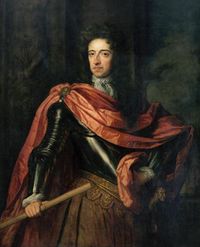
The English called their coup d'était "The Glorious Revolution" even though it wasn't a proper revolution and wasn't really all that glorious; this is claimed to be the first example of British irony. The Scots were a bit cross about the "GR" because they'd not been consulted but William pacified them by riding up to Edinburgh in a kilt and eating a haggis and pretending he liked it; after that, the Scots nobility accepted him as one of their own and when asked about King James would say "Och, James who, mon?!". This is accepted as the first example of modern Scottish humour. The Irish, on the other hand, weren't so keen and rallied to James II when he landed in their country leading to William rolling his eyes in annoyance and seeing him off again in yet another battle which took place on some very bouncy moors in Ireland hence its name: the Battle of the Boing.
William was crowned William III (rather than 'William Orange' or 'Billy Tangerine') along with his wife Mary (who was the daughter of the deposed James II, they hadn't got on before and by golly they didn't get on now) who became Mary II. They ruled as joint-monarchs which meant an extra bloody crown had to be made. Since this set-up hasn't existed since that extra crown has been kept in a cupboard at the Tower since Mary's death[10]. William, being Dutch, wasn't all that interested in ruling England which is exactly what Parliament wanted to hear. They put forward a bill basically making England a "shareholder" society where political power was concerned; whilst the King was still the head of government and had some political power, he was required to recognise the power of Parliament and wasn't allowed any sort of army of his own so that there hopefully wouldn't be any more of that civil war nonsense. William signed the thing, whatever, in-between reading about the success of his tulip garden at home and Parliament largely got on with the business of running the country, occasionally sending someone over to the palace for when they couldn't decide what to do or whenever they needed a bill signed. Mary helped when she wasn't spending half a day getting covered in make-up but died after only five years as queen after choking on her blusher. This made Billy very miserable and blamed 'the vile French' for killing Mary with their fancy perfumes. He also missed the bright red lights of Amsterdam, the clog dancing and chocolate oranges.
Whilst this regime was popular with the Whigs who high-fived each other on the gathering of the new, officially empowered, Parliament, many of the Tories felt marginalized by the new regime which clearly didn't like them or their rakish ways. Some of them joined the Jacobite cause and kept in touch with the Stuarts in exile who were squatting in in King Louis XIV of France's basement and demanding money and an army so they could return to England in triumph and start putting some heads on spikes just like the good old days.
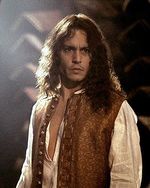
William died after falling off his horse thanks to a Jacobite mole which had dug a tunnel in his path; the mole was subsequently tried for treason and executed using a butter knife. William's death meant that power was passed to his sister-in-law Anne (another Stuart who was "out of favour" with the family). Anne spent most of her reign eating cake and throwing furious letters from her relatives in exile into the bin. She became the size of a Royal Palace in the process and squashed her husband George of Denmark in bed. No wonder there were no children that survived from this mix-match.
England was now at war again and entrusted her armed forces to John Churchill, the Duke of Marlboro, a hard riding and hard smoking gentleman-cowboy in Oxfordshire. He was told to stay in Belgium so that if the War of the Spanish Succession took a wrong turn, Marlboro would be able to get back to England. However, Marlboro wanted to improve his military c.v. and instead bunked off to rout the French and Bavarians at Blenheim with old his snuff taking buddy Prince Eugene of Savoy. Marlboro then violently coughed his way through a succession of victories against the French until it became too embarrassingly easy and he was recalled. Marlboro was given a palace, land and a pension but was permanently retired from the military active list on health grounds. The duke then disappeared from public life and everybody else in a constant fug of choking fumes.
There was also more trouble in Scotland. Northern Britain's best-known (and indeed only) independent Kingdom had decided it fancied having its own colonies in the New World and Scotland's richest, brashest and most annoying men decided to put their periwigged heads together and come up with something called "The Darian Scheme". This involved founding a Scottish trading colony (after literally hours of debate and consultation with the Kingdom's finest minds, they came up with the name "New Edinburgh") in "the thin bit" that connects North and South America. However, Scottish luck being what it was (and is) the whole thing went tits-up when the colony was completely destroyed in what was described in the The Auld Glasgow Herald as "wan oh they forrin tornado things". This meant that much of Scotland's elite had just lost millions of invested pounds and given that the average Scotsman despises losing a fiver you can imagine the scenes of rage in the Edinburgh coffee-houses. Fortunately, England had an idea: what if the loss was settled by making Scotland a region of England joining the two Kingdoms into one country. But without the fortresses and armies this time. The Scottish Parliament decided to consult with "Her Majesty the Queen of Scots" but then remembered that she was down in London being Her Majesty Queen of England.
Thus it was in Queen Anne's reign that an act was passed by the Parliaments in London and Edinburgh uniting England and Scotland as one country. The Scottish MPs in Edinburgh had steadfastly held-out, declaiming that after centuries of defending their country's liberty against English imperialism they would not hand it over now. Then London agreed to give them two whole pounds each and the bill passed unanimously. This created a new country: Great Britain. This name was chosen because both Queen and Parliament agreed that it was now the "Greatest. Country. Ever." It also enshrined the recent conclusion of the war against France that had given the British some olive groves on Gibraltar and endless ice rinks in Canada.
1714-1746: Just When You Thought it was Safe to Sit on the Throne, Here Come the Jacobites!
Anne died in 1714 and Parliament ruled out around fifty of her closest relatives on the grounds that they were all 'wafer sucking papists' and invited a fat German, the Elector of Hanover (only he had the vote in his country) over instead. Herr George von Hanover, for it was he, had no idea he was very very distantly related to someone or other who'd been near the English throne at some point in the past and was so surprised when he got the letter in the post from the British Parliament that he farted his breeches off.
King George I (as he became) didn't speak any English, in fact at first he didn't even know where England was and had to have maps drawn for him. On becoming King of Great Britain he spent most of his time playing with the crown in the bath and saying "Was ist das? Ist es ein Gedicht?" when Parliament prepared a bill for him to sign. Because German George was completely incapable of understanding what was actually going on most of the time, a new office was created in Parliament called "Prime Minister" which meant someone could run the country on the King's behalf. Parliament took the opportunity to strip the monarch of most of his remaining meaningful political powers, not that he noticed. The first of these new Prime Ministers was Lord Walpole who actually managed to fool numerous ambassadors that he was actually King and started wearing the paper crown from his Christmas cracker all year round and sitting on the throne in the royal palace when King George wasn't looking. This sort of monomania, fortunately, did not affect his successors who knew their place and only returned with Margaret Thatcher in 1979.
Meanwhile, in the House of Stuart's secret lair in a hollowed-out volcano in continental Europe, this final insult - not even disinherited members of the family were allowed their "rightful" place lording it over England and Scotland - made the exiled "royal family" extremely cross about what was going on in "their" country, even more so than they'd already been.
The first serious attempt by the Jacobites to kick-over the New Monarchy regime was in 1715 when James II's son, James Jr aka "The Great Pretender" (because he liked to sing Freddie Mercury songs) landed in his favourite Kingdom, Scotland, and raised his "banner" with an amusing spring sound-effect causing Kenneth Williams to do that "oooh!" face and cover Barbara Windsor's eyes with his hand whilst Sid James did his dirty chuckle. "Pretend" James III went walking around Scotland trying to raise an army to "kick the living merde out of le usurper" (he had been living in France too long) but wasn't very successful because "Pretend" James III was such a tiresome fop and boring nerd that the Jacobites found it hard to get all that enthusiastic about making him their military leader. Having barely raised 1000 troops to his "banner" and with the Hanoverian armies massing in England, James fucked back off across the North Sea. However, despite his shortcomings, the rakish Jacobites had admired his wearing of women's undergarments and, whilst Hanoverian policemen were not listening, would continue to toast "The Kink Across the Water".
The second serious attempt came courtesy of the Great Pretender's son, Charles Edward Stuart aka "The Wee Pretender". 'Bonnie' Prince Charlie landed in Scotland and this time managed to get a great deal more support due to his astounding good looks, fancy hat and tight buns visible through his PVC kilt. In comparison, the actual monarch, King George II (son of George I), was built like a flabby cannonball and had a funny 'Dis iz not Vunny!' German accent which was difficult for most of his courtiers to comprehend and led to some sitcom-style comic misunderstandings. Oh, George II! 'Bonnie' Prince Charlie and his fine backside managed to raise a considerable army and started their march towards the Hanoverian lair. Initially, they had considerable success and sent the redcoats fleeing southwards screaming "Run! Run! Here comes the army of the pretender. And he's got a great arse!". Unfortunately, this wasn't enough and despite some further victories over the King's forces and getting so close to London and the sausage-chomping Hanoverians that the Young Pretender and his army could smell the jellied eels he was nonetheless pushed-back and defeated at Culloden in Scotland by an army lead by the Duke of Cumberland. Following this, 'Worried' Prince Charlie went on the run where he was sheltered by the resourceful Flora McDonald's, a Scottish maiden who was the ancestor of low fat margarine spread and hamburgers. Eventually he managed to get back to the continent where he was given a dressing-down by the French King and, in the traditional Scottish manner, took to the bottle. His brother and successor, Henry, couldn't really be bothered with trying to get the family Kingdoms back and instead decided to become a Cardinal; since that meant he couldn't enjoy any rumpy-pumpy the Stuart line died with him with the "Jacobite Succession" being passed onto some Sardinian King who didn't give a shit. Thus died the Jacobite cause.
1746-1757: War of Jenkins' Arse and Fiendish Europeans Force Calendar Change
The end of the Jacobites in 1746 saw Britain return to a war that had been bothering Europe for the last ten years. It had started when an British sea captain had his ear cut off by the Spanish for alleged piracy. Jenkins had turned up in London and had demanded war against Spain for this outrage. He was supported by The Mob who trashed every tapas bar they could find. The British demanded Spain give Jenkins' back his ear and when that happened declared war. The plucky Jenkins led the British navy in an attack on Cadiz (well, strictly speaking The Cadiz, a shady nightclub in Soho, London) where he lost more bits of his body to the haughty Spaniards.
As often happens in these international situations, other countries decided to take the opportunity to attack each other. France (surprise surprise) supported the Spanish and declared war on Britain. They also declared war on Maria Theresa, Queen of Hungary and the heir to the Habsburg lands in central and Eastern Europe because she was a woman. This was a good enough reason for King Frederick the Great of Prussia to stick his oar in a well and soon there were battles all over Europe. Finally in 1748 someone blew a whistle and declared the entire war had been a draw and that everyone should go home. Alas, this was too late for Captain Jenkins. Only his big toe was left and no one wanted another war about that.
Back in Britain there was something more dangerous to consider. The Europeans wanted the British to change their calendar so that when it was Monday in France it was also Monday in Britain. Since 1582 the Catholic church had put their clocks had been on Gregorian Chant Time. The Protestants at the time saw this as a Romish trick and had refused to follow suit, preferring their Julian calendar instead - because at least Julius Caesar hadn't been a catholic though he had died in Rome. Over the years, the Catholic insistence in only answering correspondence if it carried the 'new dating system' had weakened the Protestant opposition and one by one their countries had adopted the Gregorian calendar. Even the Scots and Swiss with their fierce Calvinism had buckled to the European dating superstate.
By 1752 the only major European countries still holding out were the English and the Russians who were also suspicious of anything Catholic. By now the difference between the two calendars had extended to 10 days. This had caused problems with tourists travelling who had to change not just their watches but their portable calendars to see what day the pubs opened. In 1752 the British Government decided to synchronise the calendar with the Europeans (bar Russia) and dropped 10 days out of September 1752 to 'catch up' with the continentals. However people were not sure what this was all about and considered it another example of the barmy Europeans trying to change the parameters of time in the name of 'progress'. Many feared it was a Catholic plot to confuse the British and bring about the end of a traditional way of life. There were riots in the streets, politicians appearing on platforms demanding Britain to withdraw from Europe and keep their old dates. However the City of London financiers drinking a lot of coffee insisted that without this change, the British would lose their competitive edge etc etc. The calendar was finally changed but for many years, traditionalists called the new calendar 'European Conformity Time' and preferred to use their old diaries.
1757-1783: Trouble in the colonies, trouble with the French; just trouble basically
In 1757 began the Seven Year's War, known to other people, the losers, generally, as the nine year's war. It was going to only last originally for Five Years but the British insisted on have a gap year to play cricket whilst the French King Louis XV suggested everyone stay in bed for 12 months love making, especially round at his palace in Versailles.
From the British point of view, the war saw the French trounced all over the shop. General Wolfe abseiled up to the Heights of Abraham to defeat General Montcalm outside Quebec City, though in a battle of particular bad show, both Wolfe and Montcalm died from hot lead indigestion. Then the Spanish joined the French and got their backsides tanned in the bargain, losing Florida to the victorious British who then made plans to retire there and play tennis all day. The Brits also got Canada to but at this stage ice hockey was a minority sport, the Canadians preferred to dance with bears or go into the woods looking for 'wild native beaver'.
Besides all these new lands to exploit, there was also a new King in Great Britain. King George III had succeeded his grandfather George II when the latter had accidentally gassed himself with a massive 'blowback' fart in the Royal Privy. The new monarch was a keen an accountant and asked to see all the invoices after the war was finished. He was horrified with the expenses involved and wanted to organize a clawback in monies owed to the Crown (i.e. George and his growing family of poor princes) and so decided to start with the 'colonials' in American.
To George and his ministers, this seemed a reasonable claim and sent their financial demands by sea couriers. They listed all the things the British army had done to protect the colonies from the French, Spanish, Native Americans and untamed buffalo. In an attempt to soothe the Americans, cargoes of free tea and biscuits were shipped to Boston but in 1773, a mob dressed in fancy dress stormed the ships and dumped the tea into the harbour. The Americans then said coffee was the drink of liberty and made it a national beverage. Finally in 1776, a band of grumblers, hack writers and others gathered in Philadelphia shouted 'Death to Cheddar King George III' and proclaimed they were now 'Republicans'. They also chose George Washington as their military leader as he had the best wooden teeth in North America. The War of Colonial Aggression had started.
Not everyone in the colonies was up for a rebellion. The American revolutionary leaders said anyone who was against them wasn't a true patriot. Anyone caught playing cricket or using a kettle to boil water for a pot of tea were expelled and encouraged to leave by placing a loaded flintlock against their heads. They were also called 'Tories' and pointed in the direction of Canada to clear off to.
However the British decided to play unfair and not being able to find enough of their countrymen to enlist, they instead got a load of Germans to fight against the Americans. They were called Hessians as they liked to basket weave in their spare time. These German..er..British soldiers were shipped over the Atlantic and soon turned the tables on the Americans. Burning down churches, acting in a sneering manner and combining British arrogance with Germanic efficiency. With the Americans preferring to fight the war locally without any central government control, the revolution looked as if it was going to be crushed.
In desperation, Washington asked his French friend Pepé Le Pew, Marquis de Lafayette to return to France and sleep his way to the top to see if he could persuade King Louis XVI and Queen Marie-Antoinette to throw their support for the Americans. The absurd and naturally 'perfumed' Pepe hung around long enough like a bad smell to start up a jeans shop but his smooth tongue skills got the French to declare war against Britain. When other French ministers complained that France was 'bankrupt', Le Pew said he had given Washington his word he could do it.
Now with French help (Spain joined in too as they wanted revenge against the British too), the Americans and their allies bottled up the British at Yorktown and got the redcoats to surrender. Then in a manner that surprised France and Spain, said that any wars beyond America's new borders were nothing to do with them. This helped the British to sink the main French fleet in the Caribbean, after which they wisely decided to end the war.
1783-1793: George Loses His Marbles but French Louis Takes it in the Head
The loss of the American colonies was a bitter horse pill for King George III, nor was he much amused to get Australia as a consolation prize. Well it would least be a good (new) dumping ground for thieves, shoplifters, horse stealers and snake oil salesmen who had been sent to America before. This at least was the reasoning of George's Prime Minister William Pitt the Younger and he even suggested the Americans would one day come to regret breaking with Britain and ask for the monarchy to return.
In Britain there were also changes. London was now the biggest and most populist city in the world but with appalling levels of crime. Even the daily show of hanging criminals at Tyburn had to be switched nearer to the centre of the city at Newgate, rebuilt after the infamous 1780 Gordon's Gin Riots against serving Catholics in pubs.
In 1788 King George III decided he needed a rest from sanity and spent the next six months in his bedroom with a chamberpot on his head. It wasn't even his and the King's doctors concluded the King was suffering post-imperial possession loss syndrome and urged Pitt to send a lawyer's letter claiming damages to the Americans blaming them. Meanwhile George's son George, Prince of Wales tried to bribe everyone to have his father removed from the throne or offered them a nice plump set of cushions to kill the King.
George however got shocked back into the real world when he was told the French had decided to do away with absolutism and wanted to try running their country 'the English way'. Flattered, George sent his French counterpart King Louis XVI a manual about adapting to the 'the new way'.
However in France, the new revolutionaries were keener on following the Americans and listening to Tom Paine who encouraged the French to try all these crazy new ideas about 'Republicanism', 'Liberty' and 'Popular sovereignty'. The British were just too 'boring' and enthused by Rousseau and Voltaire, Paine wanted the French to go back to constitutional basics. What was the point of a king they thought and when it was discovered Louis XVI had sent secret royal invitations to invade France to the armies of Europe, the revolutionaries had had enough. The French royalists were dispatched for the chop and in attempt to rally all Frenchmen against at least one common enemy, also declared war against Britain.
The 19th Century - Britain tries to forget about "That American Business" and deals with "That French Business" somehow becoming a Superpower along the way
America and France have fallen to dastardly, toff-hating radicals and Britain's aristocratic elite fear from their noggins for the first time since the 1600s. Will Blighty fall to Boney or will it somehow conquer most of the world...?
1793-1802: War Against Red France and Green Ireland
The war against France went well at first. The French had no allies and appeared to be happier killing each other than uniting against their enemies. Pitt's government first took on the difficult task of stripping France of her colonies and then paid money to Austria and Prussia to send their armies in to defeat France. But Britain's allies got wise to this policy and tried to avoid any heavy fighting. The British also sent a token army to 'defend the Low Countries' but it got lost in Belgium and that shouting at other foreigners and demanding WHERE ARE THE FRENCH? was an ineffective way to run a war. Still as the French then decided to have another change of government (via the Ballot Guillotine method), there seemed a hope that eventually the war would be ended.
Sadly, a Corsican-Frenchman by the name of Old Boney appeared on the scene. He was after his own self advancement and that meant keeping the conflict with the British. So the struggle continued and all this time Napoleon was getting his medals and victory parades by thrashing the Austrians in Italy.
Back in Britain, the fear that the French disease of wanting to overthrow the monarchy had crossed the English channel, smuggled itself under the wooden barrier and was now heading to London led to the great Jacobin scare of 1797. Public hangman got busy and anyone who protested at the harsh measures against 'radicals' were depicted as dancing partners of the French revolutionaries. British Prime Minister William Pitt the Younger said that to fight tyranny abroad, everyone had to agree that his government was the best bulwark against 'French cockiness'. So when in Ireland there were rumours of a French army trying to invade England via the emerald isle, the British sent an army to take on the Irish rebels. Their leader Theobold Wolfe Tone (strange name, strange guy) who was said to be also an Irish werewolf tried to rally his country against the 'Brits'. Wolfe Tone (he dropped calling himself Theobold as he thought it was a crap first name) and tried to rally the all the Irish (Catholic and Protestant) to join his the Thinking Society of the United Irishman. However a miscommunication with the printers saw this advertisement go out as the Drinking Society of United Irishmen. In the resultant deadly punch up, Tone was captured and declared a traitor when letters to his friends in France were found (allez les français!). Tone cheated the hangman by killing himself with a pen knife.
The British blamed the inept Irish parliament in Ireland for executing Tone in time and encouraged them (with money) to merge with Great Britain. Having long shared the same monarch, they now had only one parliament in London. In a sop to Irish pride, the hitherto obscure X marks the sport red cross was added to the Union Jack and the country renamed 'United Kingdom of Great Britain and Ireland' in 1801. Pitt's government also finally declared the Hundred Years Over by dropping all British claims to the French crown which was just as well now that France had become a vulgar Republic, or more strictly speaking a Consulate.
1802-1815: Napoleon Gets Shirty and Dirty But Still Loses
Though France and Britain were officially friends with the Treaty of Amiens, there were a certain number of issues. Britain returned the French colonies that had captured but left their carpets and furniture in place, much to the disgust of the French. Also Britain agreed that all the stuff they called the French 'Children eating, warmongering monsters wading through the blood of Europe' had been somewhat exaggerated. The French said that now the English and French were 'amis' though the British failed to spot the footnote that also mentioned that the French were also the best friends of their dogs too (On dit souvent que le chien est le meilleur ami de l'homme.)
But old suspicions died hard and Napoleon seemed to keen to upgrade his status on the European titles etc league. He was unhappy to be a mere consul and so made himself next 'Consul for Life' and then installed Emperor of French into his thought processes and crowned himself supreme ruler in Notre Jean-Claude Van Damme cathedral in Paris, first asking the then pontiff, Pope Pius VII to bring a gold crown present to the ceremony. "Je steel believe in le values of le Republique" said Emperor Napoleon I from his solid gold throne under a bejewelled crown and yards of ermine and silk "Do not be fooled by le rocks that I go, Je suis still Boney from le block". "Oui, your imperial 'ighness" said the former citizens of his court, tugging their forelocks.
The British refused to take Napoleon seriously and mocked his new title. In anger, Napoleon declared he would invade England and teach the 'milords' a lesson in humility. The British in return bribed the Austrians, Russians and Prussians to throw their armies at the French but Napoleon beat them all. He then created the Continental System, a compulsory trading block whose economic policy was BUY FRENCH, BURN BRITISH. In retaliation, the British placed a blockade on Europe but encouraged smuggling on the side to sell whiskey to thirsty foreigners.
All the supine countries of Europe agreed this at a meeting where Napoleon had arranged they all meet on a cannon firing range near Paris. Portugal refused to turn up or sign anything so Napoleon arranged for an invasion of that country with Spain. However the sneaky Corsican was none too pleased with them either and came up with a plan to take control of that empire but sticking his nicer but dumber elder brother Joseph on the Spanish throne - and then pull the chain.
This lead to what the British know as the Peninsular War and gave the British army their first chance to get some necessary war practice in before the big battles of the future. Lead by the Duke of Wellington, the British took on and beat a series of French armies. The Portuguese were happy to go along whilst the Spanish swallowed hard to allow the British march all across their country. Wellington hoped to see Napoleon come down from Paris and take him on, man to French bastard anytime. But the French emperor was averse to sunstroke or lying around the pool and instead chose to go on an early skiing holiday in Russia over some silly slight earlier. In the end Napoleon's credit cards ran out and he eventually came back to Paris to surrender. The war seemed to be over again, though the British were disappointed that their army was unable to get out of Southern France after suffering from the mother of all hangovers.
Napoleon surrendered and was to be put in custody inside the volcanic crater of Etna. However, the little rogue persuaded his captors that he was now an ex-megalomaniac and would now behave. So at the last minute, Bonaparte was given a villa on the island of Elba instead. But within a year, Napoleon slipped away and was back in Paris to encourage an imperial sequel.
The British had to destroy the French AGAIN, this time at a place called Waterloo. Well at least the army's main general was British under the long nose of Duke of Wellington. The rest of his force was made up of Irish, Belgians, Dutch, Germans, Luxemburgers and those who couldn't decide. The nearest allied army were the Prussians under General 'Blotto' Blucher. Napoleon's army crept up on them both, first giving the Prussians a real kicking in one battle but losing touch with them before finding Wellington's soldiers sleeping off a binge drinking session in Waterloo. The British and their allies (at least those who didn't run away) held on all day before the Prussians suddenly turned up at Napoleon's rear, causing huge embarrassment for the little Corsican as he wasn't dressed properly. This lead to a rout of the French army and the British/Whatever coalition and the Prussians chased them all the way back to Paris.
When the French refused to fight any more wars for Napoleon, he stuck on a beard and large overcoat and jumped on a ship bound for the USA. He thought the Americans would like him, after all hadn't he flogged them Louisiana for basically the price of a song a few years before? Also Napoleon hoped the Americans would be interested in a military replay against the British. The War of 1812 had ended earlier that year but neither side made any promises about future behaviour so many Americans still hoped Canada would join them in a United North America at some stage (in fact the Americans had lost the war and they still won't shut up about it to the Brits to this day).
Whilst Napoleon hoped to get a US visa, his ship was was boarded by the British who then rowed Napoleon over to one of their vessels and locked him in a guest cabin. With the new French government hoping to shoot Napoleon, the British offered him a holiday in their country. Faced with either bullets or enduring English food, Napoleon agreed to go to stay with his captors. They took the ex-Emperor to Torbay, in Southern England. It was Napoleon's first - and last visit - to a country he had hoped to march into a few years earlier. As the British knew Napoleon suffered from sea sickness, he wasn't allowed to land so spent most of his time over the rail, emptying his guts into the harbour.
1815-1837:End of Aristocratic Fun
In Vienna the victorious allies enjoyed a marathon session of partying, diplomacy, serial infidelity and all variety of high jinks before finally and bleary eyed, signed a treaty. Napoleon was ship freighted to St.Helena and his passport burnt so he couldn't leave. Some of the other countries wanted Napoleon to be eviscerated for all the bother he had caused but the British said they would take care of the Le Scoundrel Petit. Everyone seemed happy, especially the British who were given ownership of the all the oceans. No one else had a navy to match them, it was Pax Britannica.
For the next few years, the great European powers would arrange 'congresses' to talk about the world and its problems but these soon turned into aristocratic orgy shagging events and so the British said they would rather stay at home, save on the bus fare and do that at home. For them was other stuff to deal with back home, and despite the great victories against everyone, there was a lot of belly aching going on. The ungrateful populace didn't want foreign glory anymore. They wanted to have the vote and challenge the state!
In 1820 after being bonkers for years, George III finally died in Windsor Castle. The former royal despot had let his hair and finger nails grow long, used glove puppets to open up boxes of tissues and would wander around in his underpants talking to trees under the impression he was at some outdoor rave. His son George who had been signing on the cheques for himself as Prince Regent now became King George IV. He wanted to have a splendid coronation until his estranged wife Queen Caroline decided to barge her way in.
It had been a marital disaster, Caroline would sit in bed, unwashed and munching on German sausage every time George was forced to go inside to do his 'breeding duty' (the British were strong on duty, Nelson had expected everyone to do it or die in the process). George would empty the drinks cabinet to prepare himself and remarkably managed to stand up long enough to give Caroline a daughter who was christened Charlotte (she would live long enough to get married some years later but died in childbirth). Once he became king, George tried to bribe Caroline to stay away from his big enthronement party but she had turned up anyway. Barred from Westminster Abbey and supported by the equally unwashed mob, Caroline threatened the survival of the monarchy. Yet within a few weeks she was dead, apparently from choking on some choice 'bratwurst' but darker rumours suggested Caroline had been murdered in an fatal accident inside a tunnel in Paris.
Now widowed, George IV's hopes to get his oats from more willing partners were now at an end as his huge stomach now acted a very effective turn off. His next heirs were his brother Frederick, the inept general who liked marching 10, 000 men up and down hills and then William who had joined the British navy as he was very partial to rum. Frederick died before George so the next king was 'the sailor Billy.
King William IV had married a right 'Sheila' in the shape of Princess Adelaide. As she grew older, she became so stout that William joked his wife was 'as big as a city'. The governor of Australia thought this such a good example of off-the-cuff royal humour, that he ordered the construction of a city and named it her (dis)honour.
Though William would have preferred a quiet life and a government of Tories, they had fallen out with each other. The Prime Minister, the Duke of Wellington, had duelled with another Lord who called him a 'Arthur Obama O'Shea Al-Wellesley' whilst others had assassinated a former member of the government William Huskisson by arranging a train to run him over at the opening of a new railway line. This had then brought the Whigs back into power for the first time since the days of the American Revolution.
The new government wanted to make some changes, the chief of these was to give the vote to more of their friends. This was called the Great Reform Act of 1832, which introduced a test to exclude the 'oiks' from the electoral roll. If you had money, you got it. If you didn't then the government would encourage you go hang or better still, provide chained passage to the British colonies to improve the bloodstock as now slavery was now abolished.
The only cheery thing that happened for those without the vote was the fire that destroyed the old Houses of Parliament in 1834. So keen were they to see the place go up in flames that fire fighters found their passage to put out the inferno blocked. J.W. 'Turps' Turner celebrated the fire with his painting The End of Expenses. Perhaps upset with this destruction, King William turned up his slippers and let a young, 18 year old princess called Victoria to become Queen. She was the next in line to the throne, though the old family home in Hanover was given to an uncle as the Germans said they didn't believe in women.
It was the dawn of a new age. Loose fitting gowns were now out, it was the age of corsets, stiff upper lips and everything else we can associate with the Victorian Age.
1837-1845: Victoria & Albert
Victoria had just turned 18 when she got the message that her old sea dog uncle King William had pegged it. She was incredibly small and very round even at that tender age but was judged a vast improvement on the previous Hanoverian monarchs As for Hanover, the land of her ancestors, she palmed it off to another of her uncles Ernst 'the Killer' Duke of Cumberland (he had beaten a valet to death for incorrectly dressing him for dinner) which kept him out of Britain.
The British government were anxious that Victoria got down to picking a husband but for the first few years of her reign, she was happy to be entertained by the Prime Minister Lord Melbourne but finally pricked his desires when she told him that she needed a real man and said she knew who that was: Prince Albert of Saxe-Coburg-Koffmixture, a young man known in the best ballrooms of Europe as the wearer of the tightest pantaloons since the days of Beau Brummell. Melbourne was so unimpressed with Victoria's choice that he delayed sending the invitation to Albert - and only then by sending a second class rail ticket (non-refundable) and booked him a hotel room run by a Germanophobic pub landlord. Albert took the humiliations because he was already suffering from the effects of enforced self pollution (see below).
Yet despite Melbourne's attempted sabotage, Albert and Victoria couldn't keep their hands off each other's corset strings and it was decided to let the marriage go ahead in case radicals made 'revolutionary mischief' by demanding reforms like stopping children working in mines or political reform. Victoria willingly kept her end up for Albert, his unusual body adornment (see above) kept her amused long enough to produce nine children in the next 17 years.
In 1841 the new Tory government of Sir Robert Peel took over from the fag end Whigs and became alarmed by what they saw as continuing unrest. Assassins tried to kill Victoria and one tried to kill Peel but shot his professional look-a-like in the confusing murk of a London fog. In Ireland, the population had been taxed off wheat and told to eat potatoes instead which grew well in the damp soil. This cheap method of feeding many suited the Anglo-Irish aristocracy who wanted to keep costs down and trusted that those who got fed up with spud stew everyday would leave and go elsewhere - which they did.
1845-1856: Famine and the Crimean War
It was a bad year to be a potato and Irish in 1845. The crop failed that year, Irish farmers dug up inedible potatoes which had unusual facial hair, face masks and annoying social habits. Throwing these away, the Irish were told they could only get help if they abandoned 'Marianism' (i.e. Catholicism) and become true Protestant Christians a free bowl of soup. Most preferred to leave and relocated to Boston, USA to learn baseball. Those Irish that survived became one with the leprechauns until the emergence of Sinn Féin.
The news from Ireland wasn't all bad news to the British government. For the last 50 years as the population of Great Britain and Ireland grew, there was concern that the Irish were outpacing everyone else. The famine was therefore seen by the British as an example of God working in mysterious Anglican ways. That and the growth of the British Empire in India meant that the British were now the chosen people to spread message (in English) to everyone else in the world.
The leading British politician who embodied this superior attitude was Viscount Palmerston. An Anglo-Irish noble with extensive properties, Palmerston had kept his aristocratic arrogance but had cleverly mixed it with extreme national patriotism. Originally a Tory when they had been power for years, Palmerston had switched to the Whigs when they seemed to be the winning team. He was British Foreign Secretary for much of this period which gave him carte blanche to be rude to 'foreigners' and encourage the drugs trade in opium to China.
For the British during this period was the growth of Russophobia which largely displaced the old suspicions about France. Like the British Empire, the Russians were also on the march as their empire spread across Asia and appeared to be heading towards India. This also meant the Ottoman Empire which straddled South East Europe and the Middle East looked vulnerable to the Russian bear.
This explains why Britain decided to get involved in a dispute between France and Russia. The new French leader was Emperor Napoleon III, a short ugly man with a funny beard. Unlike his uncle Napoleon I, the new emperor had always been a bit of an anglophile and had lived in London when in exile. He was also looking for a war to convince the French that a return of the Bonaparte family to power was a good idea.
When the Russian Tsar Nicholas took exception to Napoleon III and decided to take it on the Ottoman Empire (there was a lack of logic in St.Petersburg), the British saw they had an interest at stake and declared war on Russia too. Since neither Prussia or Austria wanted a war, the British and French had to find a bit of Russia to fight a war on and eventually thought Crimea would be an easy place to take.
The British hadn't fought anyone in Europe since 1815 or against an opponent as formidable as Russia. There was also a problem that the leading British commander Lord Raglan who had been at Waterloo with Wellington thought he was going to Crimea to fight the French. It took some effort of his subordinates to persuade Raglan to point the British cannons at the Russians instead of the French. The war was only saved for British pride by the pig headed heroics at the Battle of Balaclava and the realisation that Russia wasn't any better at fighting a war than the British or French. So everyone kissed and made up with a treaty in Paris and a nice box of chocolates. Florence Nightingale was left threw buckets of ice cold water on anyone who stayed behind.
1856-1861: Rebellion in India and the Death of Bertie
Whilst the British were sending armies to Crimea to teach Ivan table manners, in India a spot of bother with greasy rifles sent that country into rebellion. The first the British were aware there was a problem was when their afternoon tea on the verandah was served with bullets and grenades. Those who survived the initial onslaught appealed for help against 'the bloody natives' and tried to barricade themselves in the cellars.
As tales of unspeakable outrages and the removal of corsets reached England, the British Prime Minister of the time, Lord Derby broke away from his horse racing gambling addiction and sent an expeditionary force to bring India back to the flames of civilisation. One way to teach the rebels a lesson was to tie them to cannons and blow their stomachs out in the direction of Delhi. With a mix of ruthlessness..and more ruthlessness (to make any modern dictator proud), the British recaptured India. They deposed the last of the old Moguls rulers Bahadur of India who had acted as the figurehead leader of the insurrection and sent him to Mandalay in Burma. There Bahadur was put in charge of a very bad restaurant and where he died in a food fight with a party of angry Siam bound sex-tourists who got off at the wrong port.
In Britain the news that India was now 'safe' was greeted with great celebration and that it had now been also confiscated from the opium raddled East India Company. They had previously owned much of India in lieu of old drug debts run up by impecunious rajahs over the past 100 years. Queen Victoria was given the title deeds to the sub continent but had to wait another 20 years to add another crown to her collection as Empress of India.
In amongst all this foreign excitement, Prince Albert died from catching cholera from sniffing the smelly drains at Windsor Castle. In an age when dying before you could collect a pension happened to roughly 95% of the population in Britain, Queen Victoria took this unexpectedly hard. She burnt all her frilly knickerbockers and wore black crepe curtains for the rest of the next 40 years. She also insisted that any bit of land grabbed off the locals in the name of the British Empire be named after Albert - or her - or both. The British did this, littering the world with Albert this or Victoria that from anything to lake, waterfalls, the flat lands of Canada or the deserts of Australia. The Queen also hoped to make the names Victoria and Albert compulsory for all British subjects but in the end, was only able to enforce this law on her family.
1861-1901: Gladstone's Tarts, Disraeli's Gear and Parnell's Bedroom Shamrock
Queen Victoria's decision to hide herself away like Miss Havisham, left her eldest son Albert Edward to represent the monarchy. He didn't much like this at all and when obliged to marry, chose Alexandra of Denmark, a rather mannish looking woman who bored 'Bertie' so much that he hung around with showgirls to vent out his extramarital urgings. They did their family duties, producing a litter of out two princes and four princesses. None of them showed much spark of interest except the eldest son Albert Victor who possibly moonlighted as Jack the Ripper when he wasn't frequenting mixed brothels.
British politics at this time was not one for much morality either, at least after the door was closed. British Prime Minister Lord Palmerston was an inveterate skirt chaser, he would say that was the only thing that got 'him up in the morning' and would have backed the Confederates in the American Civil War if they had won at Gettysburg. William Gladstone who would dominate the political scene after 1865 was also 'one for the ladies' but he preferred listening to their dirty talk rather than actually stooping down and engaging in more vigorous canvassing. His great rival and occasional Prime Minister, Benjamin Disraeli, chose to fall in love with Queen Victoria instead, a task made socially more acceptable when she became a widow in 1869. There was definitely something there between 'Ben and Vic', though he declined to dress up like the Queen's late husband to carry the illusion to a logical end. After all, Victoria was still only in her 40s when Albert died.
However whilst the British were having their fun and games, a new power emerged in Europe in 1871. The prickly Prussians had broken up their room in the German Confederation cottage, threw out the Austrians out of the window and then set fire the French chateau next door. They also annexed Victoria's family possessions in Hanover and renamed the new conglomeration 'Germany' and declared it an empire meaning that, naturally, the King of Prussia should also become the first German Emperor. Gladstone, who was Prime Minister at the time was out with his lady friends when this all happened, so it was left to Disraeli to help bruised British pride. If Germany had an emperor without an empire then the British would trump that by having a 'King-Emperor' or, as it was Victoria, Queen-Emperor. The imperial title came from India which, as the previous Mogul rulers had died/been shot by the British, had what was considered to be a 'vacant' imperial throne.
The new title needed to flagged up around the world and so in the next forty years, more of the globe was painted red to accommodate Britain's belief that the world was all going very much their way. From Industrial revolution, political reform (without any ghastly Bonopartes or Jacobins as the French tended to do), sport and clothing, the British were ahead. Even in Africa they appreciated British confidence, especially if they took their armies and hoped to get better survival odds of 2039-2. Only the Zulus didn't play the game, massacring an invading British army as they were playing cricket at Isandlwana. But that was soon avenged and another land added to the imperial roster. If anyone else complained, well the British navy would protect the country. It was an era of what was called 'Splendid Isolation', though the Germans said this was just a matter of hygiene:The British were an island of stinky monkeys.
However the British were shocked when closer to home, the Irish preferred to do it their own way in Dublin. Ancient fears were roused, the Catholic conspiracies and the belief the Irish were basically an inferior, if regrettably a white skinned people whose political ambitions would not so be easily quelled out the hot mouth of a Maxim gun. The Irish were sneaky enough to deflect irrational fear by being lead by Protestant, Charles Stewart Parnell. To his enemies, he may have dressed like a gentleman and sported the regulation beard and whiskers but to the British establishment, he was wrecker of imperial dreams. Parnell was accused of wanting to turn Ireland into Popeland and organising murder gangs to knock off any English aristocrats taking a walk in Phoenix Park in Dublin. However the great Irish leader when he seemed to be on the brink of political success was let down by what he bottled up inside his trousers. He was a two-timer and when the Irish found out, Parnell was disgraced. The crisis in Ireland appeared to be over for now.
Then in 1899, the Boer War began, after a brief interlude of real wars when the British shot Africans again, though really meant the Boers instead.
The British won...just. Against civilians. Truly this was an empire on which the sun would never set. Queen Victoria would have been there to celebrate but she missed out on the victory parade, finally get her chance to rejoin her beloved Albert. Bertie was now King as Edward VII, a hippo-sized monarch with a daily appetite that could have fed an orphanage for a month.
The 20th century into the 21st - Power is fleeting, then there's socialism, then Thatcher, then Tony Blair tries to combine the two and fails
Great Britain enters the 20th century the world's foremost power with a supposedly-invincible navy, powerhouse economy and the largest empire the world has ever seen. What could possibly go wrong and are the Germans involved? Read below to find out (like you don't already know)...
1901-1919 - One World War and no world cups
King Edward VII was quite fat and old when he became King and so didn't last anywhere as long as his mother, around ten years or so. He did, however, give the name "Edwardian" to the period of his reign which was associated with (supposedly) untouchable British supremacy, economic strength, starched collars and gigantic dinners.
This was still the era of Splendid Isolation, a handy phrase as the King-Emperor's stomach prevented close intimacy from anyone except a few old floozies.
It's also remembered for the Titanic tragedy in which an enormous British floating hotel hit an iceberg in the North Atlantic and sank becoming some kind of metaphor for what would happen to the country that built her over the next forty-odd years. Anyway, Edward VII died with a cigar still in his mouth and was succeeded by King George V; but it nonetheless looked like the "Edwardian" era and lavish lifestyle would go on and on.
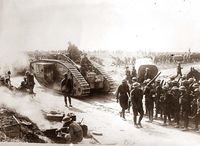
But it was not to be. Although, of course, Britain began the 20th century as an indestructible colossus which outgunned every other nation two to one and controlled more than half of the world's revenue she still felt the need to "protect some minor powers from bullying by "up and coming" states" like the German Empire. For that reason, Britain got itself involved in the musical chairs of continental European alliances, eventually ending up in the Triple Entente with our oldest and most loyal allies[citation needed] the French and the doughty (if miserable) Russians. Ranged against this Axis of Blighty were the Germans lead by the pointy-headed megalomaniac Kaiser Wilhelm II and his allies the Austro-Hungarian Empire and the Johnny Turk. Despite these two power blocs constantly giving each other the "evil eye" and gesticulating aggressively near the French border this system was intended to prevent a major war since "with two such huge forces facing each other war is basically suicidal what what!". None of this prevented Austria invading Serbia in 1914 in revenge for the shooting of someone called Archie Duke which dragged everyone else in leading to what was briefly known as the "Big Ruck" and is now known as "World War I". The Americans, possibly still smarting from 1812, only got involved around 1917 and probably only because there was money to be made out of it. With the sausage-guzzlers, Austrians and Turks eventual defeat in 1918 Britain and France secured peace in Europe through the "fair and balanced" treaty of Versailles which ordered Germany to give-up all of its conquests, all of its colonies and significant parts of its European holdings "Oh, and to have no army except maybe a couple of chaps in those fancy pointy helmets to march around a bit, for local colour". The Americans said this was going too far but France and Britain said "Pah! Typical weasely liberal Yanks! Butt out of it, Doodle-Dandy!". To prevent another war an organisation called the League of Nations was formed to ensure that all of the worlds Great Powers would, rather than starting shooting each other, discuss things like gentlemen over cigars, brandy and a prostitute or two. Meanwhile, Germany and Turkey's former colonies were divided up amongst Britain and France with Britain "bagsying" Palestine, Jordan and Tanzania among others.
1919-1939 - Elation, A Quick Fag and then a Long Depression
The end of the war saw Britain able to paint even more of the world red. Sharing only some booty with the French and the Italians, the British and the Dominions grabbed all of Germany's colonies. In addition, most of the Middle East including Palestine was put under British Parental Guidance. Even those countries not formally annexed were expected to send their elites to English schools where Western values were beaten into them via the backside.
British Prime Minister at the time was the Lloyd George, an oversexed Welsh Liberal but in Ireland there was Troubles. A bunch of men with flat caps and rifles started shooting at British soldiers in Dublin and before you know it Ireland had become independent. Well, most of it: the province of Ulster (of Ulster Fry fame!) was given the option of joining independent Ireland in a referendum and voted "NO! NO! NO! NO! ULSTER SAYS NO!!" so it remained part of the UK. The newly independent Ireland became the Irish Free State which and then started fighting with itself about whether the King was of Parliament or in Parliament or something else really really important. Then the King was neither in or of Parliament but sort of hovered around until 1949 when Ireland became a republic. The first President was Eammon de La Holmes or something.
In Britain the elation of winning World War One started to fade away quickly. It was discovered that despite having won all these territories, real financial power had meanwhile sneaked out the back door and crossed over the Atlantic to the USA. The Americans had all the money and now wanted it all back with added interest. Britain was asked to pay their debts back or see their credit card cut in two. Before it had been the British squeezing their allies for money, now the boot belonged to the lanky-limbed Uncle Sam. It was an unpleasant place for the British to be in.
So the British people blamed Lloyd George as he was the leader of the Liberal/Conservative party coalition. He had promised 'Homes for Heroes' and 'Cowsheds for Cowards' and then when that failed, 'War with Turkey' but was deposed by his Tory allies who now wanted to cut back on excitement. The result was an election that saw the Liberals badly beaten and replaced as the main party of the left by the Labour Party. Within two years they were in government and Ramsay Macdonald became the first member of the famous hamburger family to become Prime Minister.
As recent memories of the war began to fade, the British felt more relaxed in the latter half of the 1920s. The world economy seemed to have stabilised and even the great fear that Communism would sweep Europe had faded with the death of Lenin and the subsequent divisions in the leadership of the Soviet Union. Also peace was now promoted by a new international body, the League of Nations. This was a forerunner of the Champions League and it encouraged countries to mix soccer skills and diplomacy to avert another world war. The Americans had refused to join (no one wanted to play baseball with them) and the Russians had excluded themselves as they would share a pitch with the 'leeching capitalist exploiters of the working classes'.
It was around this time that the BBC was invented too, a radio station to promote 'Blighty Cultural Values' to those at home and those lucky to live in the British Empire. The very first comedy program was made at this time, called 'The Duke's Speech', a live recording of the Duke of York announcing the opening of the British Empire Exhibition. It had been billed as a two minute comedy sketch but went on for quarter of an hour. Despite that, it was judged a hit.
The mood changed at the start of the 1930s when a world recession came back again, this time thanks to the Americans. They had used all the money the skint Europeans had paid to them earlier for that World War Thingy and had as a result, go on with a wild speculative spending spree. This money fuelled financial orgy crashed in 1929 and when the Americans withdrew their dollars to pay off some outstanding bills, other European countries crashed too but especially Germany. Communists in Germany blamed the Capitalists and the German Right blamed the Jews. The Centre parties blamed each other and then stayed all night watching cabaret with its dancing girls, something that made it easy to ignore the rise of political extremism.
The Germans hadn't liked losing and had refused to take their licking like men and insisted that Versailles was unfair. This under-currant of sour grapes fermented all through the 1920s so when Germany's economy collapsed in 1930, the Germans turned to a shabby, Austrian born Charlie Chaplin impersonator called Adolf Hitler. A failed artist and postcard painter, Hitler convinced grown people that he was the answer if the question was 'Why is Germany in the Schiesse?'.
Hitler decided that Germany had not truly lost World War I and had instead been betrayed by "Jewish Communists, Jewish liberals, treacherous Jewish reds, Jew-influenced pacifists, people who look a bit funny, the International Conspiracy of the Disabled and, of course, people who believe in the Jewish invention of Global Warming. Why do they hate Germany?" Hitler tapped into the national mood - grim, racist - and gathered enough support to become Chancellor.
The rise of Hitler - or Nastyism - was met in the stomach by saggy stomach of John Bull. If the Kaiser had been a 'cad and bounder', Hitler was seen by the British as a jumped up waiter serving tasteless apple strudel in a vegetarian restaurant. It seemed a task tailor made for Winston Churchill but he was out of favour in the Conservative party. He had made some jokes about the Indian leader Gandhi who had been invited to London to meet King George V, 'walking around Buckingham palace, half naked with his arse hanging out and asking for the lavatory to flush British authority down the pan...' Though many in his party shared this opinion, the British prime ministers of the time Stanley Baldwin and Neville Chamberlain put a big fat minus against the old warrior and told everyone secretly Churchill was now 'officially gaga...', if not yet a Lady. Churchill, however, felt that something ought to be done about the jumped-up little German. "Hitler is a crazy madman whose twisted ideology is fuelled by militarism, glorification of war, racism and a desire to seize territory from powerless, weaker peoples." He stated "These are things Britain and her empire have always stood against!"
Britain's self-confidence in the face of the deteriorating continental situation was not helped by her important and necessary head of state, the King Edward VIII, abdicating because he had had the nerve to actually fall in love with someone rather than accept an arranged marriage, scandalising the Windsors and the top hats and spats-wearing government benches in Parliament. He was replaced by his brother who became King George VI and was ideally-suited to being King with his stammer making him so good at speeches and that. Still, at least he wasn't married to a Yankee floozy!.
1939-1945: The Golden Years Part II and The Churchill Years and Beyond!
Hitler was clearly a crazy wrong 'un from the very start and all that talk about parts of the British establishment, newspaper Barons and the Daily Mail supporting him early on is the invention of so-called "historians" citing so-called "fact". Clearly, Britain was on to him from the beginning and, along with the French, made it clear we wouldn't stand for his evil empire-building and silly moustache. In 1939 we declared war but something had happened to the French who somehow forgot how to fight and were swiftly defeated by Hitler's armies. Britain, on the other hand, strategically fought its way back across the channel until all most British troops were out of the range of Hitler's guns! A stunning victory!
Britain found itself forced to pluckily hold-out against the German monster alone using only miles of sea and the worlds most powerful navy. In 1941, Hitler invaded the Soviet Union as part of Operation Smash The Gullible Communists bringing "Uncle Stalin" into the war and in December the Americans were forced to pay attention to the rest of the world when Japan bombed Pearl Harbor (sic) and also joined the good guys. Eventually, with some American and Russian help, Britain brought Hitler to his knees and liberated France, not that they've ever said "thanks" properly. Hitler commmitted suicide in 1945 and Germany surrendered not long after. The dictators last words were said to have been "I should have known better than to go to war with Britain"[citation needed].
1945-1979: The Phantom Menace: Attlee, Eden, Macmi...oh, why bother
After smashing Hitler, Britain looked in its collective pockets to discover that only a farthing remained. It seemed fighting a war against the globe's foremost military power for five and a half years was hugely expensive; who knew?!. The Americans offered a massive loan to stop Britain going Communist because of their huge generosity of spirit but expected it to be paid back with generous interest. Because of their huge generosity of spirit.
Britain went to the polls in 1945 and elected a Labour government led by Churchill's wartime ally Clementine "Clement Attlee" Attlee. Attlee enacted a radical socialist programme of nationalisation and created something called the National Health Service which meant that even poor people could get medical treatment for free. The Conservatives argued that if the poor could get medical treatment then what was to stop them living longer and voting Labour? To be fair, the Tories were still getting the hang of this "democracy" lark and some of the older ones kept asking Winston Churchill why the police couldn't just "ride amongst these Labour people on horseback and start killing the ringleaders until people stop being so silly and learn to know their place?".
Despite Attlee's reforms, some Labour supporters were unhappy. George "Ungorgeous" Milne writing in the Manchester Guardian argued "Comrades! Why do we accept this faux-socialist government? It may well be that they created this so-called NHS but didn't Mr Attlee enter a coalition government with Churchill, the most evil man alive? Doesn't he realise that the only reason Mr Hitler came to power in Germany was thanks to massive support from each and every Tory in Britain and Europe and probably America too and that, if not for the evil Tories, there would have been no need to fight the war at all? I, for one, will not vote for Attlee and his right-wing Labour party at the next election. No, I will be voting for the real left-wing choice - the Liberal Party!". A lot of people must have agreed with Ungorgeous, because the Conservatives got back into power at the next general election despite nobody liking them.
Oh, regarding the Monarchy (remember them?). Britain got a new Queen in 1952 - Elizabeth II. She was young and the Privy Council all fancied her, the dirty old sods.
There was more trouble than another Conservative government to deal with, though. In Egypt in 1956, a dastardly villain called Nasser rose to power, probably by stabbing someone, and started driving his tanks about and, far more worryingly, talked about taking the Suez Canal into Egyptian ownership when it was clearly British. Churchill, who was good at sorting-out foreign sorts, had retired from politics and left Anthony "Thony" Eden in charge, a man who still wore a top hat at "Prime Minister's Question Time". He decided that Britain, France and the brand new state of Israel should "team up" to teach Mr Nasser a lesson but the Americans decided that their allies shouldn't go around doing things without their permission and put paid to the whole shebang. The French, gutless cowards that they are, reacted by taking an increasingly anti-American position whilst brave Britain courageously decided to agree with the Americans from then on.
The fallout from the Suez Crisis wrecked British morale and the Conservative Party dealt with Britain's new place in the world by sleeping with lots of very young girls during the next decade - the "swinging" sixties (not to be confusing with the "swingeing sixties"). During this decade, Britain moved away from grey post-war austerity and post-imperial sulkiness and became wealthy, groovy and hip to the beat you cats (er...). In the ancient city of London in particular, young British people took lots of interesting drugs and created lots of interesting music that old men with preposterous moustaches and lots of medals on their chests called "dreadful noise" in black and white film clips to the endless amusement of subsequent generations. Labour got back in power under a man called Harold Wilson who smoked a pipe stuffed-full of cannabis and passed lots of far-out legislation like the legalisation of homosexuality and abolition of the death penalty (except for wiping a bogie on a portrait of the Queen). Woah! He also liberalised immigration laws leading to Enoch Powell, then in the Conservative shadow cabinet, accusing him of wanting to pour lots of blood in a river and making Enoch feel like a Roman. The Conservatives subsequently sent him to Rome for "a long holiday and a think"; they felt very much about racism like they felt about marital infidelity: it was okay behind closed doors but not something they wanted to be seen doing in public.
Then the sixties ended and, at midnight on the 1st of January 1970, all the colour was sucked out of Britain. The trade unions threw-off their colourful overalls and cheerful dispositions and instead their members started growing huge sideburns, watching racist comedy and striking because they didn't like the weather and Edwardian "Teddy" Heath became the new Conservative Prime Minister and definitely wasn't gay. Heath's party wanted an end to the post-war consensus now that it wasn't fun any more and a return to the profit motive which had worked-out so well in the 19th century (well, for them anyway) but Heath wasn't so sure, wouldn't that cause all kinds of trouble? Besides, he was worried about how he fancied blokes there was an energy crisis to deal with.
Heath, however, failed to please the unpleasable and increasingly broken realm, and Labour got back in again under James "Jim Callagalalalaghan" Callaghan. "Sunny Jim" took one look at the state of the country and cried - the money was running out, the trade unions were dominated by the far-left and pushing for revolution (albeit in a half-arsed way and with increasingly-long tea-breaks) and members of his own party were starting to suggest that it might be time to think of a new economic policy. Dennis Healy used the "M" word at a Labour Party conference and Tony Benn started plotting a coup. At around the same time the new leader of the Tory party was taking tea and torture with a "nice" Chilean dictator and due to quantum do-da managed to hear him. "That's it!" she cried. "No" said Pinochet. "It's not good enough that he says he's a socialist, we need him to say he communicates with Moscow and it's necessary for me to kill his whole family" but Thatcher was already heading back home, her head buzzing with possibilities.
1979-1990: Revenge of the Bitch: Margaret Thatcher
In 1979 the British electorate got rid of Labour again, somehow making it to the ballots despite the whole country being on strike, and decided that things were now so bad they were willing to put their trust in a steely blonde woman with an unsettling glint in her eye. Yes, Margaret "Maggie Out Out Out" Thatcher was now Britain's first female[citation needed] Prime Minister. Thatcher had been sickened by the Conservatives under Heath with his belief in "consensus" and "pragmatism". "What does he think this country is, some kind of liberal democracy?" she railed. "It's ideology and confrontation all the way from now on!". Thatcher took a look in the treasury and was appalled by what she saw - a single sovereign and a bean. She looked at the country in terms of a household and decided that spending needed to be cut and taxes needed to go up. What would have been beans on toast twice a week for a household turned out to be lots of people (in Labour strongholds, conveniently) losing their jobs. Never mind, though, there was plenty of work to... oh. Thatcher also decided to liberalise and deregulate the economy whilst clamping down on social "permissiveness" and immigration. "Money should be free, but people can't be trusted" said Maggie "Permitting dirty gays, sex outside of marriage and people with brown skin to cross the English border from Bongo-Bongo land ruins a country. On the other hand freeing-up trustworthy, decent and honest people like bankers can only reap good; thus our Lord Friedman hath written. You'll all thank me in 30-odd years."
"Crazy" Maggie's brand new vision for the country was unpopular but she was saved by three things. First, the Labour Party decided that, having been turfed-out because people were sick of post-war socialism, the solution was to write a manifesto only a little to the right of the Soviet Constitution. Secondly, some Argentine fascists invaded the Falklands and Maggie had the job of kicking their arse and the British people love winning a good war. Thirdly, the trade unions continued to be run by humourless old Stalinists which made Maggie's insistence treating them as Moscow's fifth column look almost reasonable.
A mixture of these things meant Maggie went on and on and on and her eyes started to rotate alarmingly as she pounded her fist on Parliament's ancient wood at Prime Minister's Question Time. Then, in 1990, whilst contemplating getting rid of "that bloody woman up the road" and combining the office of Prime Minister and Queen so she could become Empress Margaret I she made a fatal error. "Scotland doesn't matter and they vote Labour", she said, "So if I try out a fair and balanced new tax there I can only become stronger!". Mad Margaret's "big idea", the Poll Tax, proved about as popular as diarrhoea in a jacuzzi and before the year was out, Thatcher had been outed by the "sane" wing of the party lead by Michael "Tarzan" Heseltine and she blubbed as she left Downing Street for "the last time". Nobody else mourned, apart from possibly John Redwood and Augusto Pinochet. Heseltine turned-up at Number 10 the next day only to find that "someone else" had somehow taken up residence there. "Hello" said a grey man who Heseltine remembered vaguely being Chancellor under Thatcher. "I'm Prime Minister now. Would you like to come in for some peas?"
1990-1997: A New Hope: John Major
Under "Big" John Major, Britain became "the grey island" in acknowledgement of the fact that it had now come under the most boring leader it had ever had in its considerable (see the size of the scroll bar to the right of your screen) history. Major was beset by numerous problems. First, he had to deal with a recession and a dictator from Iraq who drove lots of tanks and armoured personnel carriers across the desert and into a city called "Kuwait City" then refused to leave meaning that America, Europe and various regional "temporary allies" had to make them go home again. As if that wasn't enough, more and more "young people" in Britain were taking a magical new pill which went by the street name of MDMA (My Dad's Mashed Ahahahahaaa!) but was originally developed as a potential cure for Alzheimer's which went by the trade name of Killer Drug Ecstacy. "MDMA" caused dancing to electric-organ music with "repetitive beats" which Major attempted to stamp out, unsuccessfully, by ordering his Home Secretary, Mister Michael Howard, to ban it in 1994. And then, in the Balkans, everyone started fighting everyone else meaning John Major had to order significant numbers of British troops to Bosnia where they were ordered to stand around and watch what was happening. Major's troubles didn't end there, though. The Labour Party got a new "young" leader called Tony Blair who was friends with that new band Oasis and said "y'know" a lot whilst moving his arms about. It was all too much and Major's Conservative Party tumbled from power in 1997.
1997-2007: The Empire Strikes Back: Queen Elizabeth II & Tony Blair
During this period, England and Britain was ruled by the crypto-tory/eurocommunist (delete as applicable) Tony "Look!" Blair.
Britain under Tony Blair and his "New Labour" party divides people. If you talk to some people, you'll learn that Blair was the most right-wing leader since Thatcher who spent his time sucking up to businesspeople, starting wars left right and centre so he could sate his thirst for oil, privatising everything, toadying to the car lobby, pandering to racism and introducing sinister totalitarian fascist innovations like CCTV and ID Cards which he would use to Control the Population. If you talk to others, however, you'll learn that Blair was an interfering, nannying communist who wrecked the economy by tying businesses up in red tape, risked British lives fighting pointless wars in the name of silly idealistic values at the behest of foreign hicks, nationalised successful private companies like Railtrack, declared War on the Motorist, destroyed freedom of speech with his adhesion to political correctness and introduced sinister totalitarian communist innovations like CCTV and ID Cards which he would use to Control the Population.
Tony Blair's premiership was defined by several things. First was peace in Northern Ireland, the second was the death of HRH The Royal Queen of Hearts Diana of Wales and Sitting Outside the Taj Mahal Looking Lonely the third was Britain winning the Eurovision Song Contest, the fourth was the long-awaited return of popular television Time Lord Doctor Who, the fifth was when he did that sketch with Catherine Tate lol, the sixth was when he pretended to be cockney on a chat show; I think there was something about the Middle East too, something about Iraq? I'm sure it'll come back to me.
Another major innovation of Blair's was devolved government for Scotland and Wales. Following a referendum, the two celtic nations were "loaned" their own national assemblies from mother England. This allowed crazy laws to be passed that would never get through Westminster such as Cardiff's decision to make the wearing of leeks compulsory for men over 21 and Edinburgh's legalisation of haggis pizzas. It also allowed Alex "Puddin' Face" Salmond into a position of actual power.
During his time in office, Blair received the unflattering nickname "Teflon Tony". This was because if you fried an egg on his face, it could easily be removed using a slice without sticking and having to be scraped away meaning the Prime Minister's face wouldn't need a good scrub later. This is one thing that made him distinct from previous occupants of Number Ten, although he was equally furious to have people try and cook their breakfast on him.
Despite nobody theoretically liking him because he was a commie-nazi-capitalist-socialist-racist-politically-correct-warmongering-totalitarian he somehow managed to win three elections in a row, a record for the Labour Party. This gave Blair an excuse to flash his horrible smile all the bloody time, something which he is now prevented from doing within the UK's borders by an Act of Parliament.
However, Tony had made a terrible deal with the Devil, more accurately known as Gordon Brown his Scottish Chancellor. Blair had agreed with Brown in a secret deal made in 1994 or thereabouts that he would step-down and give the barrel-chested Scot a "go" at leading the country. In 2007, Gordon Brown showed up regularly at 2am on the steps of 10 Downing Street and yelled "Och, remember yer promise, Tony!" whilst that policeman restrained him. But Tony knew it was all over and he went quietly later the same year.
Tony Blair is currently appearing in Y'know...! at the Old Murdoch Theatre, Basingstoke.
2007-2010: New Brown Britain
Gordon "The Ironic Chancellor" Brown became Prime Minister in the summer of 2007. "Foul!" shouted the Conservatives and Liberal Democrats. "Nobody elected him! He is unelected!". Nobody told them that no British Prime Minister has ever been elected by popular vote but... y'know.
Mr. Gordon "He puts the Scot in Scotland" Brown was a man broad of girth but narrow of vision. Whenever it was demanded he actually do something in Parliament by David Cameron, he would simply remark "It's only my fifth day!" even though it wasn't and used this excuse throughout his three-year premiership. He soon became known as "the man who puts the cunt into country" and not just by the Queen.
"Broon fae Troon" did not have a happy Prime Ministership. For a start, in 2008 the world economy collapsed after the American banks realised that if you make a loan to someone with no money you can't sell the unpayable debt onto other people indefinitely and that, more importantly, if loads of "financial traders" are trying to pull this scam the result is a massive economic collapse. Fortunately, and the reason we're all sitting here today reading this shit, Gordon Brown managed to save the world and proudly announced the fact in Parliament. Unfortunately, nobody believed him and instead everyone laughed. Then things got worse and worse: he messed-up shaking hands with his own Policeman when inviting Barrack Obama to Ten Downing Street, then he called a woman a bigot. It was all too much and the British people voted en masse in 2010 for a... er... hung Parliament.
After a lot of limousine's going back and forth and, doubtless, lots of men in suits striding around Westminster with their mobile phones stuck to their ears going "Dammit, what more do you want?" a deal was reached: David Cameron, leader of the New Conservatives, would become Prime Minister and his party would enter a formal coalition with the Liberal Democrats making Nick Clegg his Deputy Dawg. Minutes after this announcement smoke was seen above the offices of The Guardian as its journalists attempted to burn every single copy of the newspaper in which they'd told their readers to vote Liberal Democrat.
2010 - Call Me Dave and Nick "The Legs" Clegg
And so, for the first time since the war against the Hitler, Great Britain, bastion of only-one-party-in-power-at-once found itself with a coalition government. David Cameron, leader of the all-Green, all-Wet New Conservatives distanced himself from his swivel-eyed predecessor by saying that, yes, he did believe in society; in fact he wanted a Big Society full of happy-clappy socially-aware people helping each other and waving cheerfully. But, he said, because the economy was in a terrible mess due to the banking collapse Labour he would need to cut back on public spending. And, unfortunately, the people at the bottom would have to bear the brunt of this. "We're all in it together, though!" said Call Me Dave. "I will be cycling to work at least once a week rather than taking my luxurious ministerial limousine and when my family and I make porridge it won't necessarily be organic". People openly wept in the street. Cameron also decided that, whilst we were "all in it together", this didn't apply to Vodafone for some reason who mysteriously managed to avoid having to pay a huge tax bill they owed. Meanwhile everyone else found their tax bill had gone up because "we're all in it together... except Vodaphone. And the bankers. And the Royal Family".
Meanwhile, Nick Clegg saw his voter base desert him, mainly people who had swore they would never again vote Labour because the Liberal Democrats were the "true leftwing opposition" but had now decided to vote Labour because the Liberal Democrats were "rightwing".
The new coalition found itself pressed on foreign policy issues early on when previous newfound friend of Britain, Colonel "Crazy" Gadaffi decided he was having none of this "arab spring" bullshit and sent his best armoured division to the rebellious city of Benghazi in order to "teach them a lesson with some artillery". Cameron, being a friend of the weak and powerless, organised an airborne intervention with his French counterpart "Monsieur" Sarkozy. Some questioned why Cameron and Clegg could afford a multi-billion pound military operation when there was "no money" and wouldn't making Vodaphone pay their tax bill cover the cost several times over? "Shut up and watch these posh people get married!" said Cameron who, despite public holidays being "bad for business", decided he suddenly had space for one for the Royal Wedding, presumably he got it from the same place he found money for the Libyan intervention.
The Saga Continues...
Footnotes
- ↑ Britain is widely believed to have been created by God to irritate the French. Coincidentally, it is the only country with 'Great', in its name.
- ↑ As did Ireland but that is another story
- ↑ The French now prefer to use 'Ooliganterre' when talking about Britain.
- ↑ Though, technically speaking, there was no first Briton. Scientists have proved you can neither create nor destroy Britons.
- ↑ He wrote them all done but the manuscript has long gone, recycled as a Royal lavatory humour
- ↑ The English thought that was an ill omen!
- ↑ Al Fresco bonking.
- ↑ Cocktails in question were human and nothing to do with birds
- ↑ Explained by Rome's Popes not wishing to upset England as they were in a war with Popes in Avignon who were backed by France.
- ↑ Although apparently Tony Blair "really really" wanted a "go"
See also
- Peter Mandelson
- Soviet Britain
- North Sea Archipelago
- The British Navy
- Royal Navy
- Great Britain
- British Empire
- Booze
- England
- Johnny Foreigner's Guide to British Humour
- British Line of Succession
- National Dyslexics Association
- BNP
- The Color Problem
- Boris Johnson
